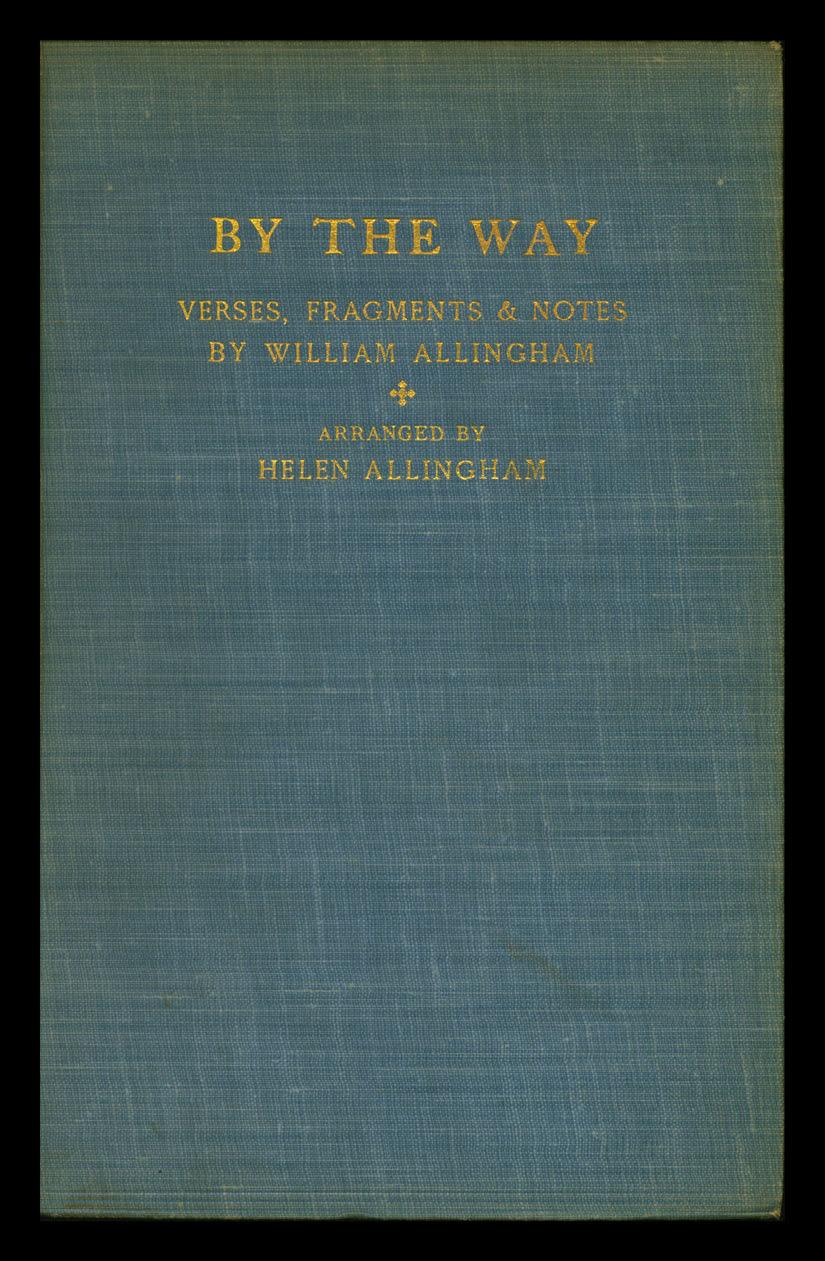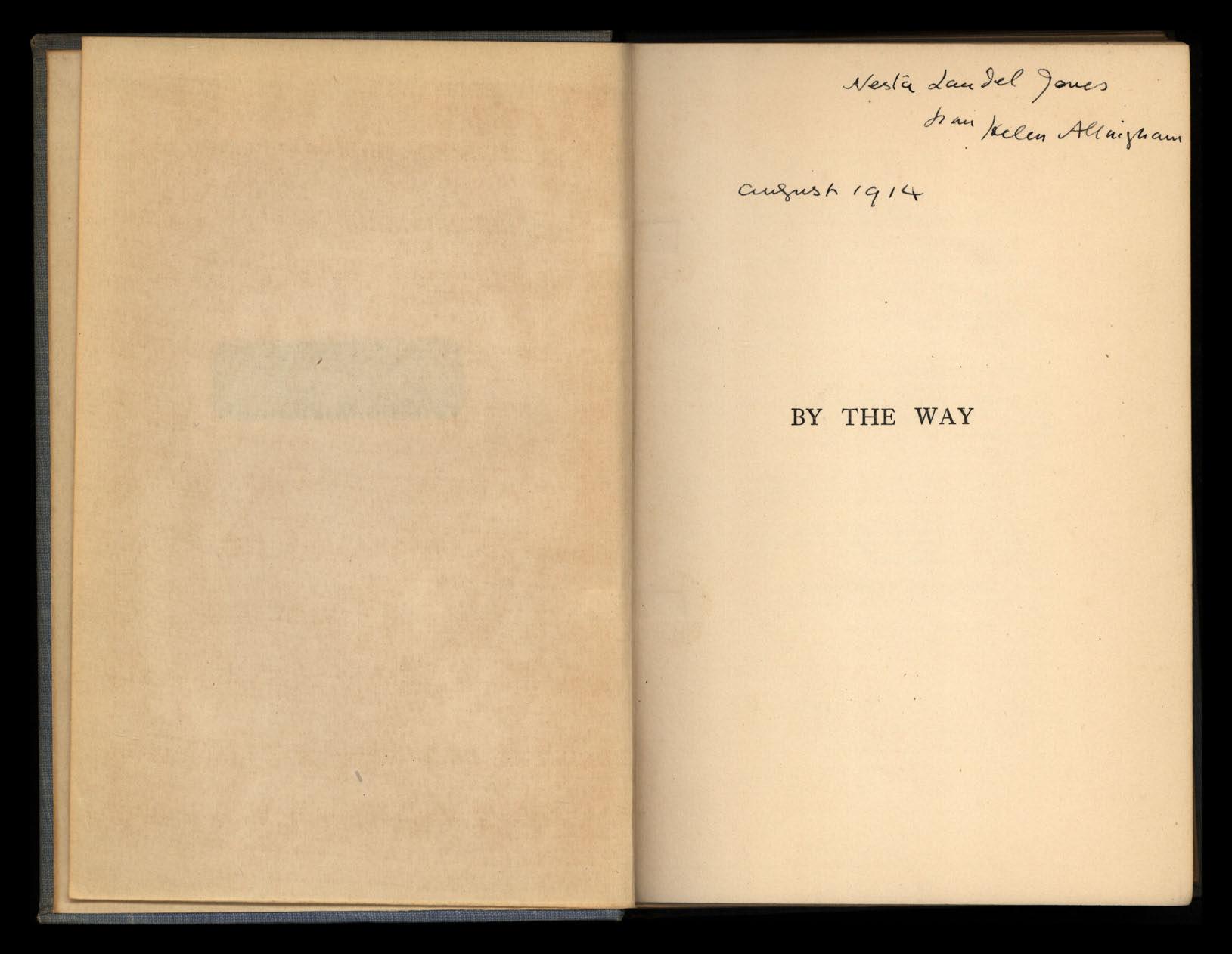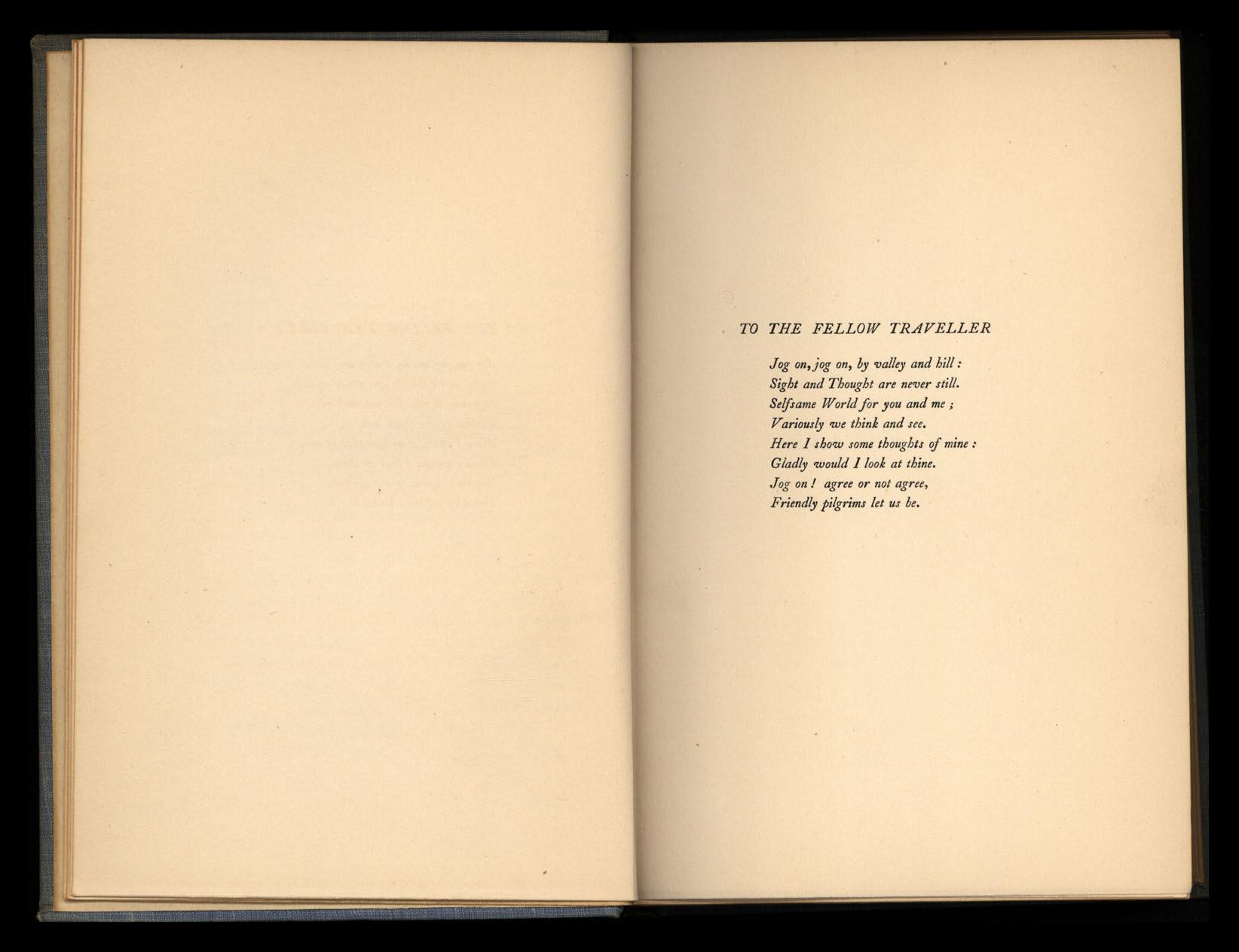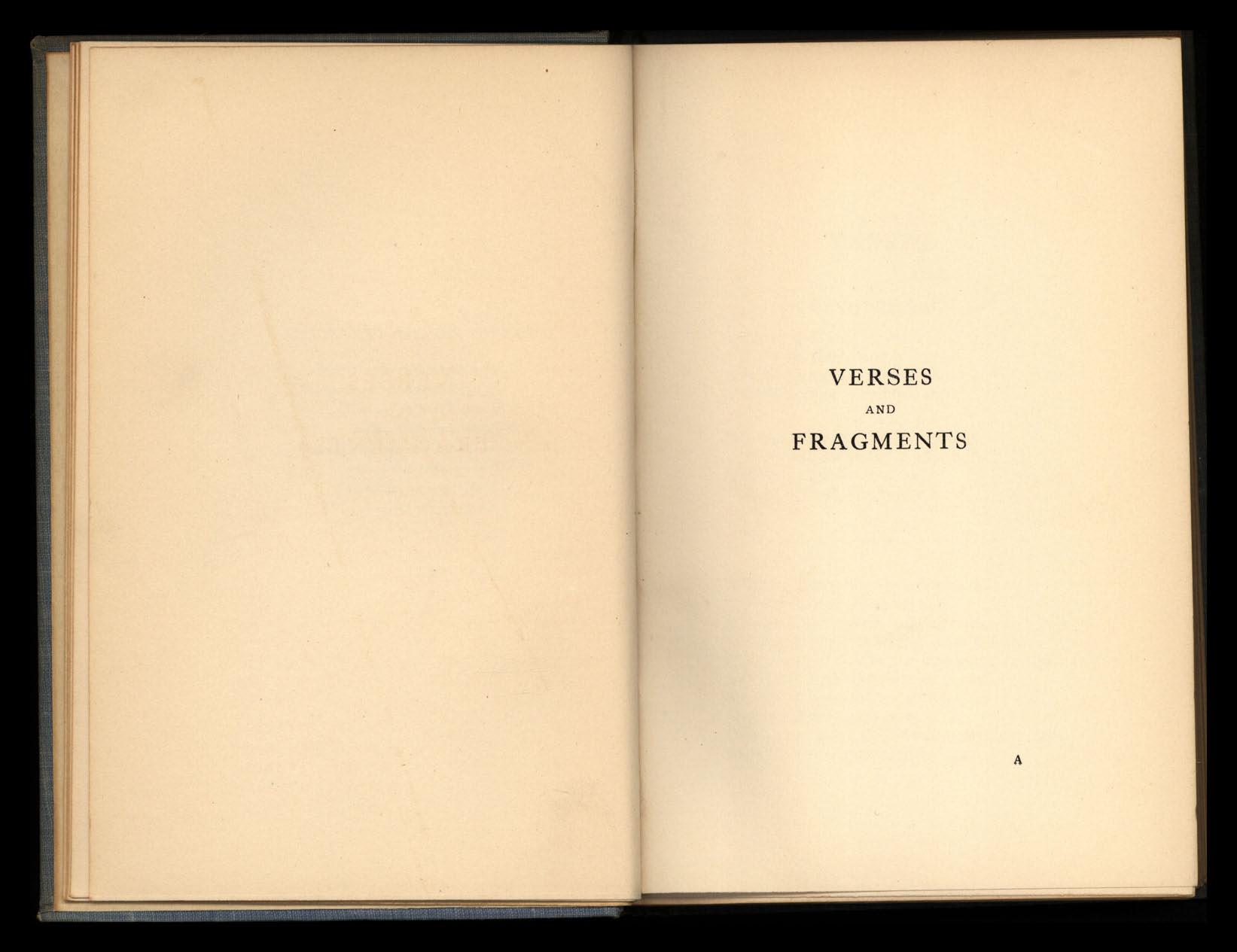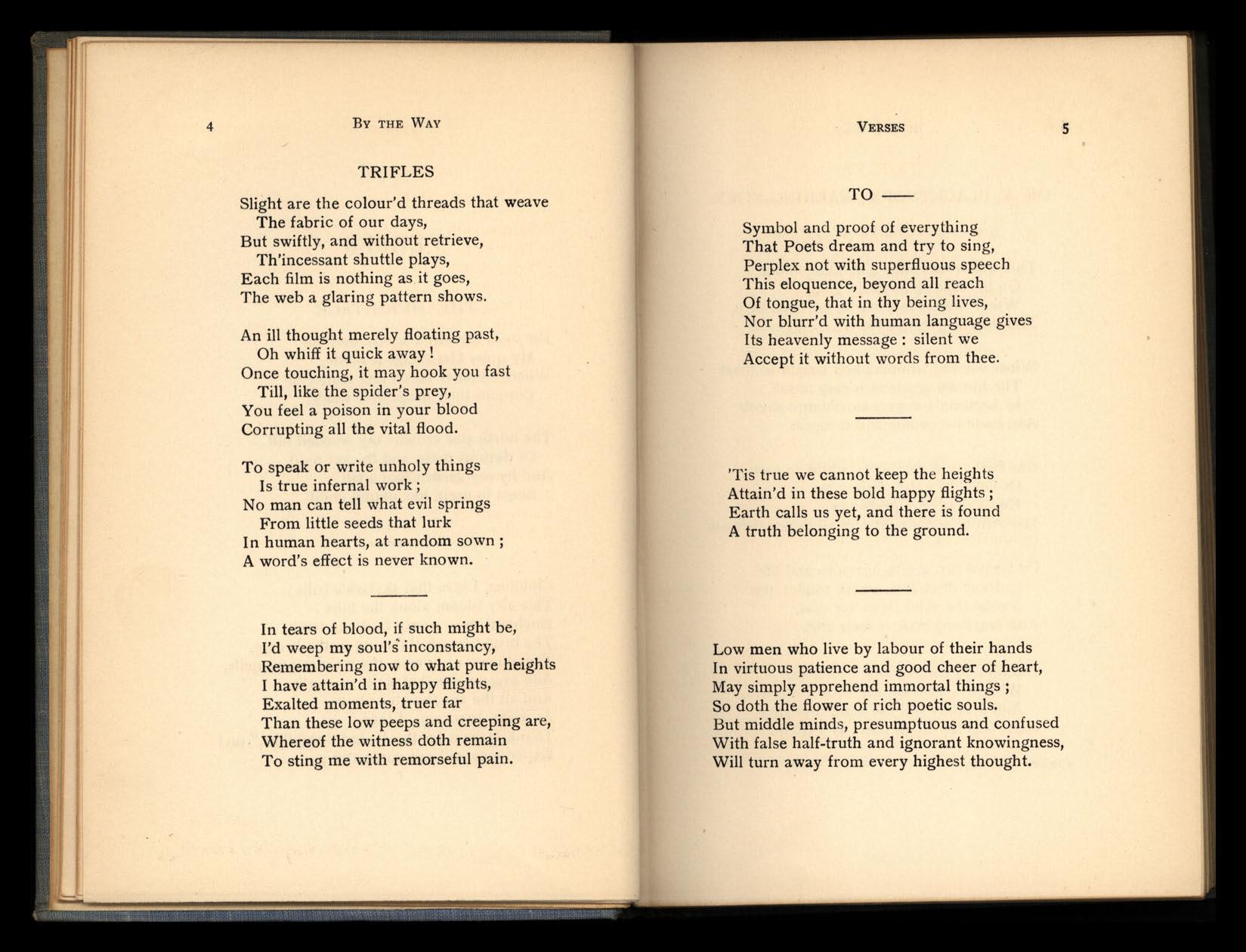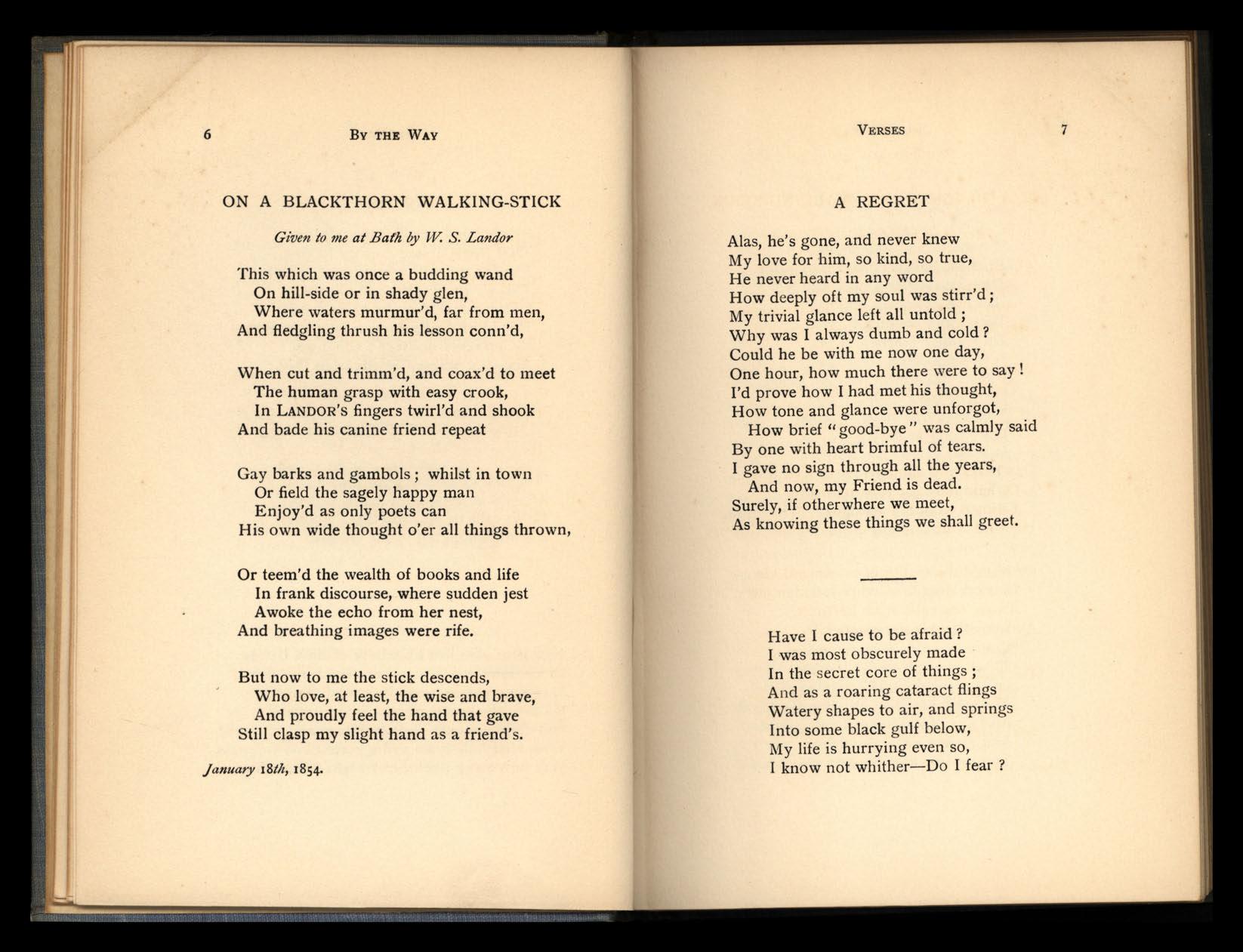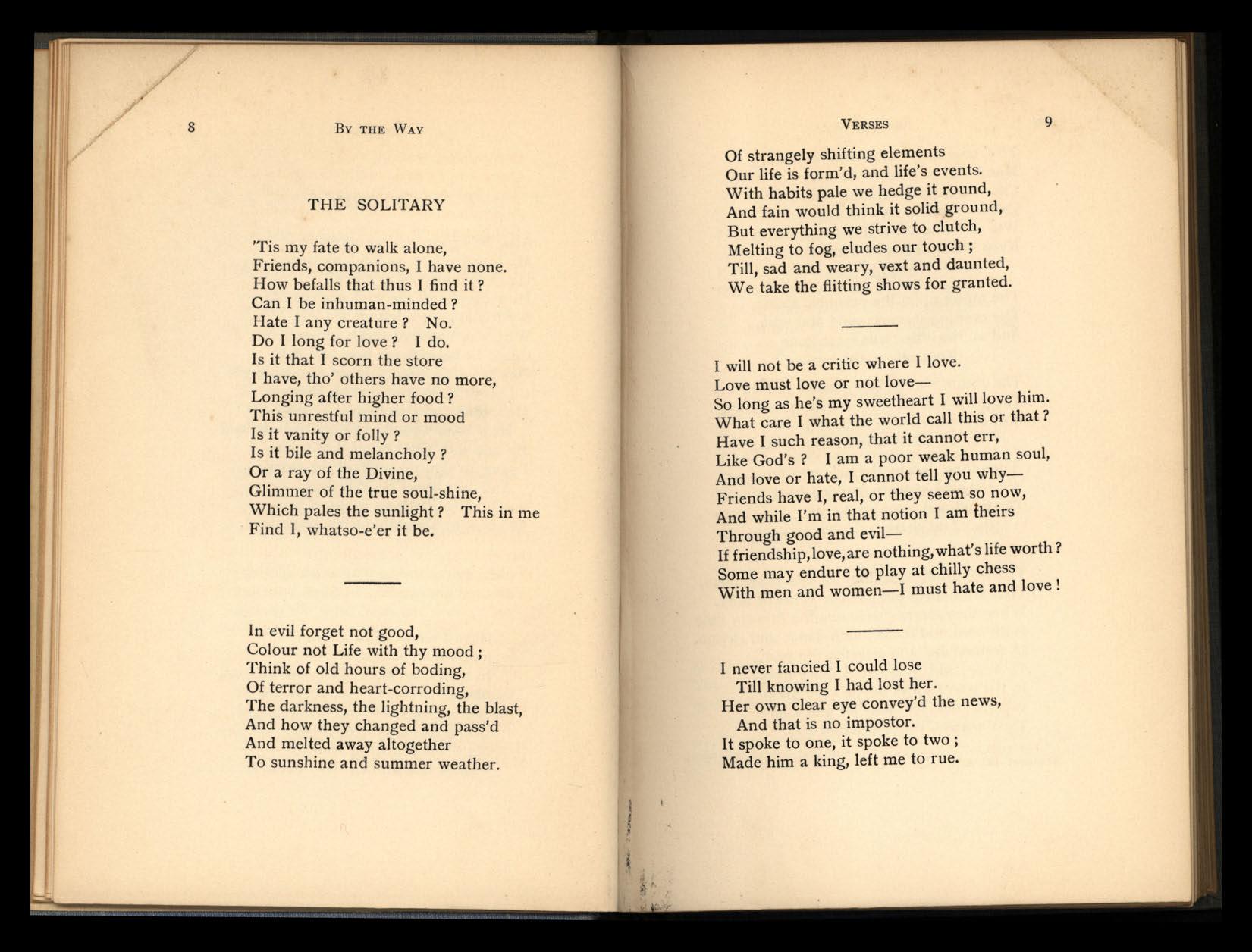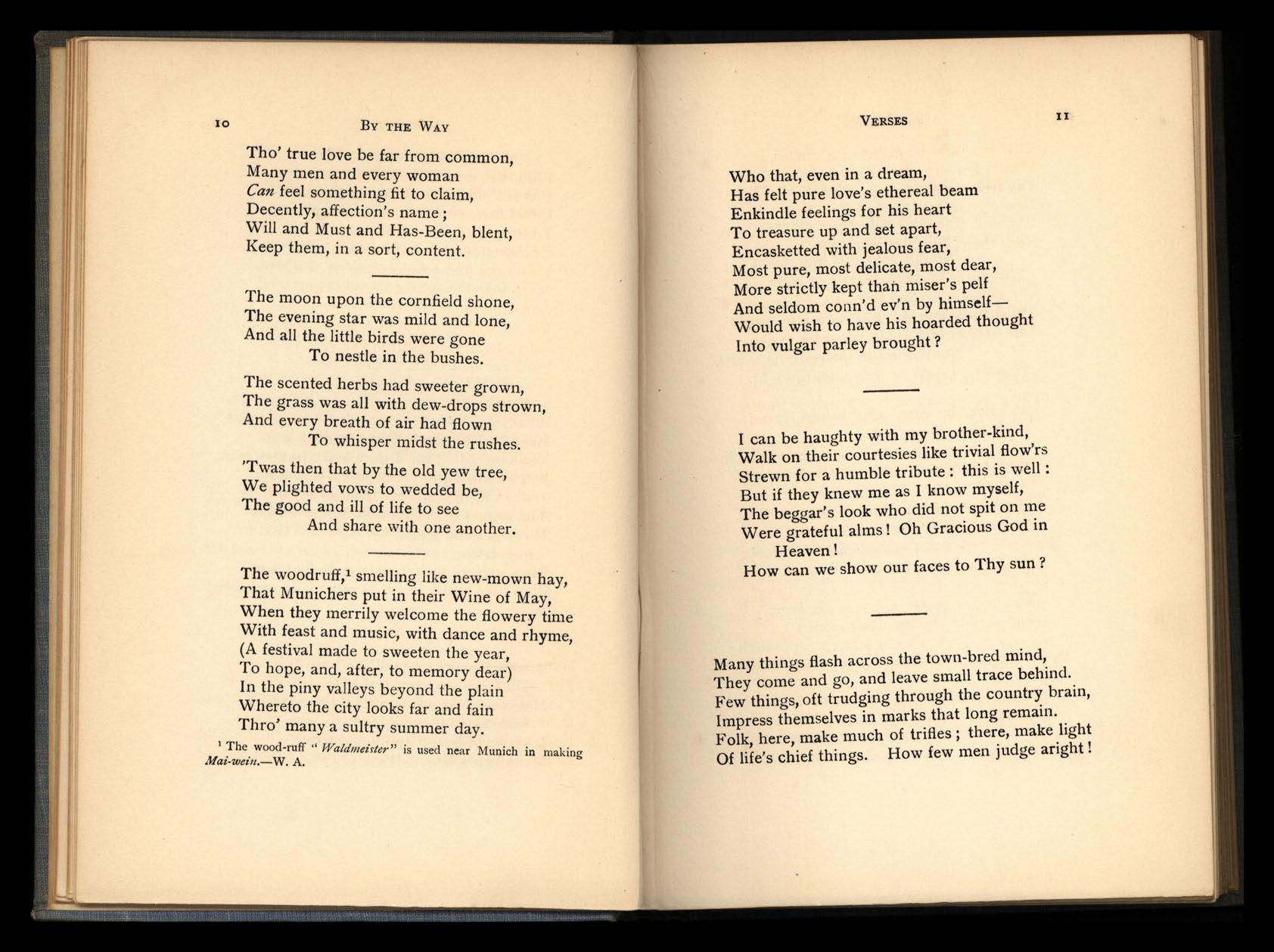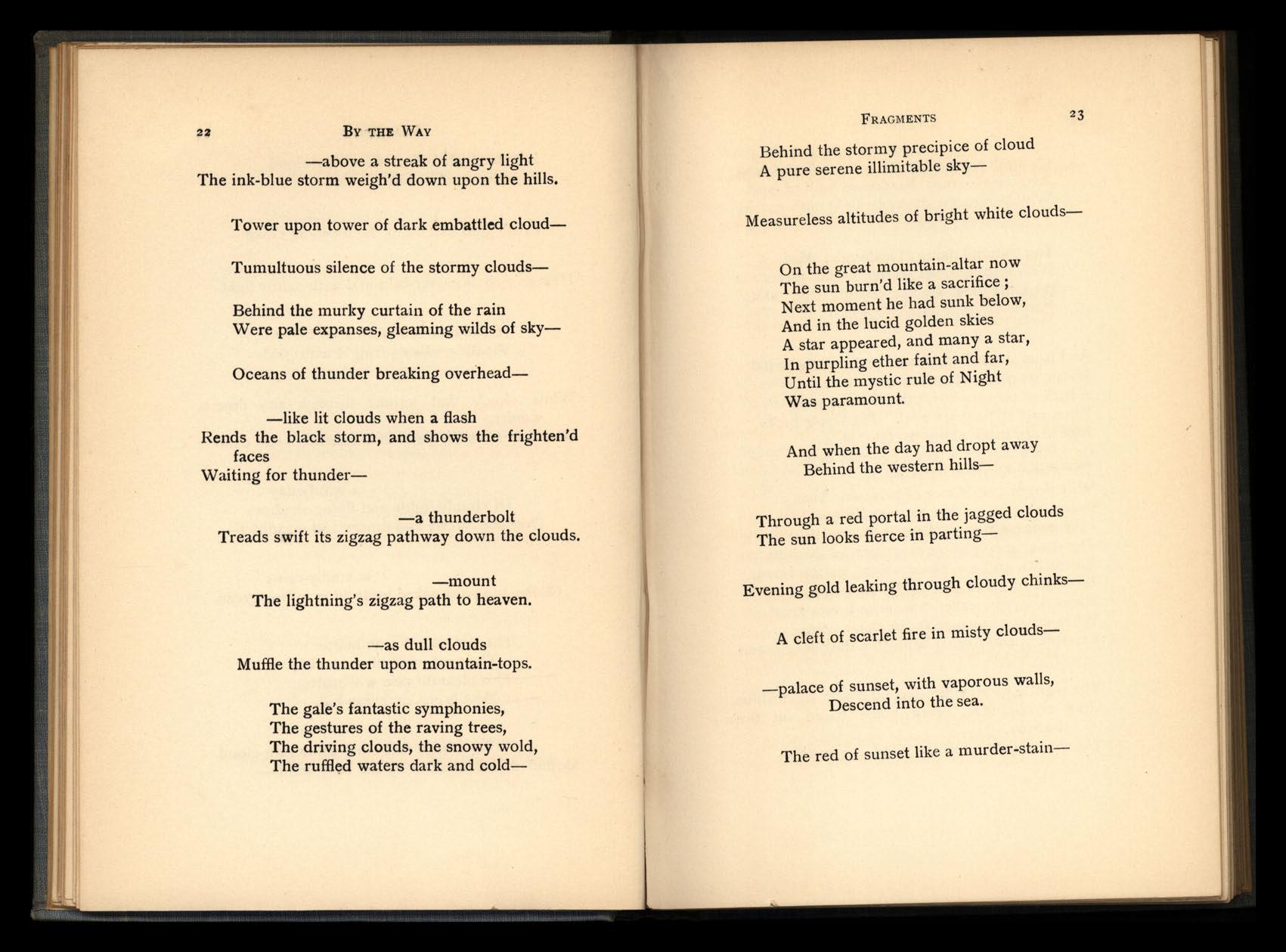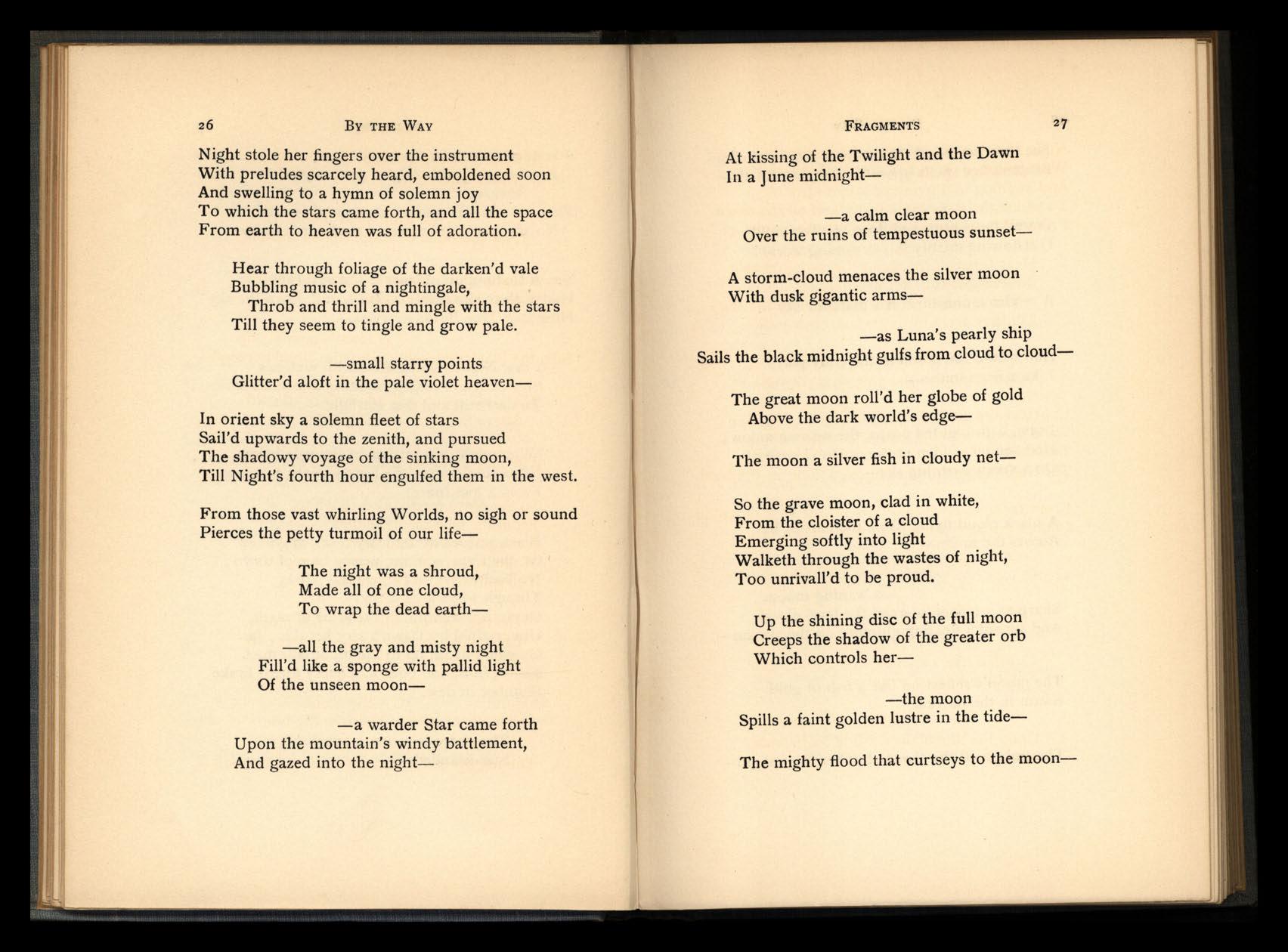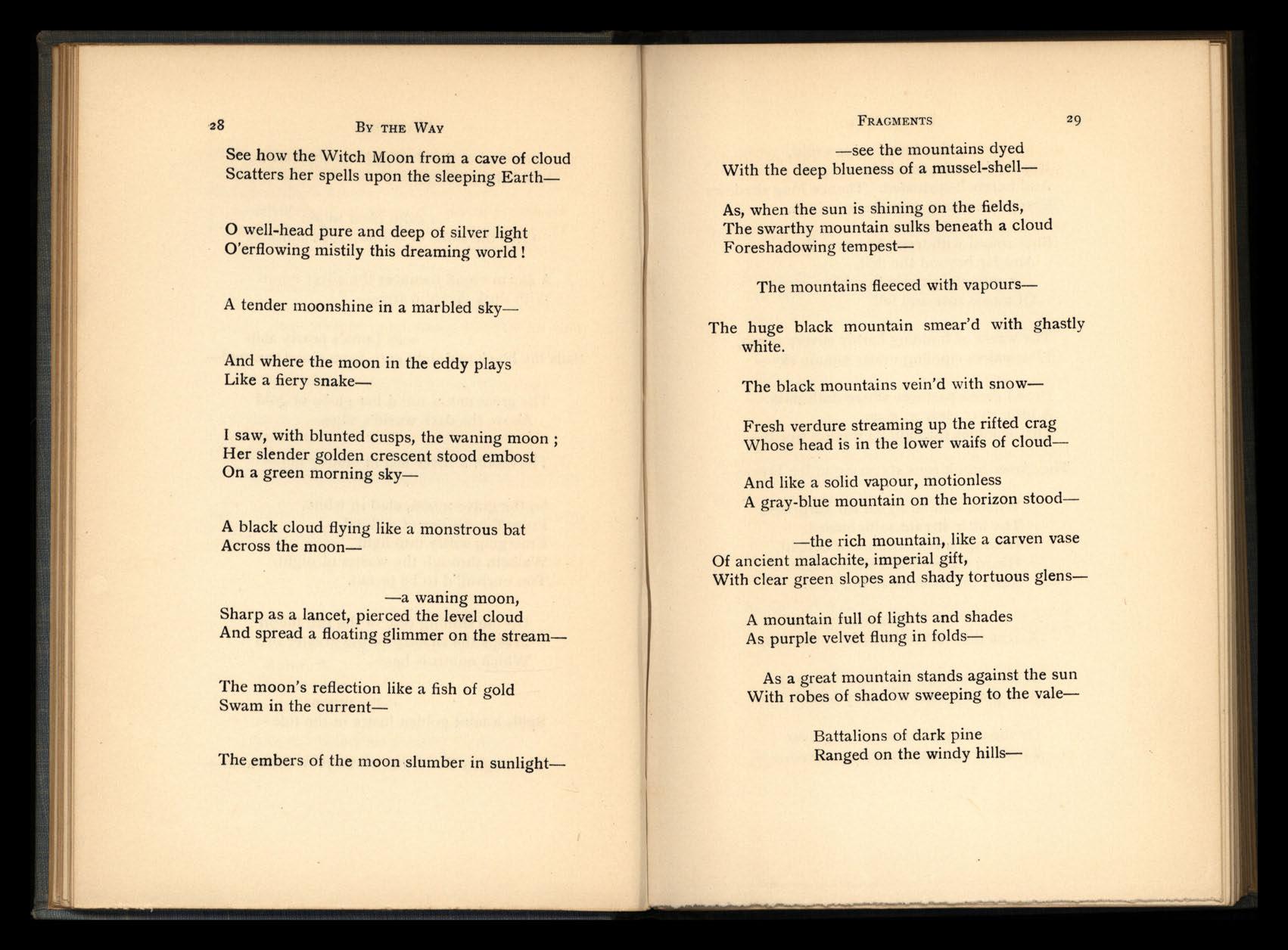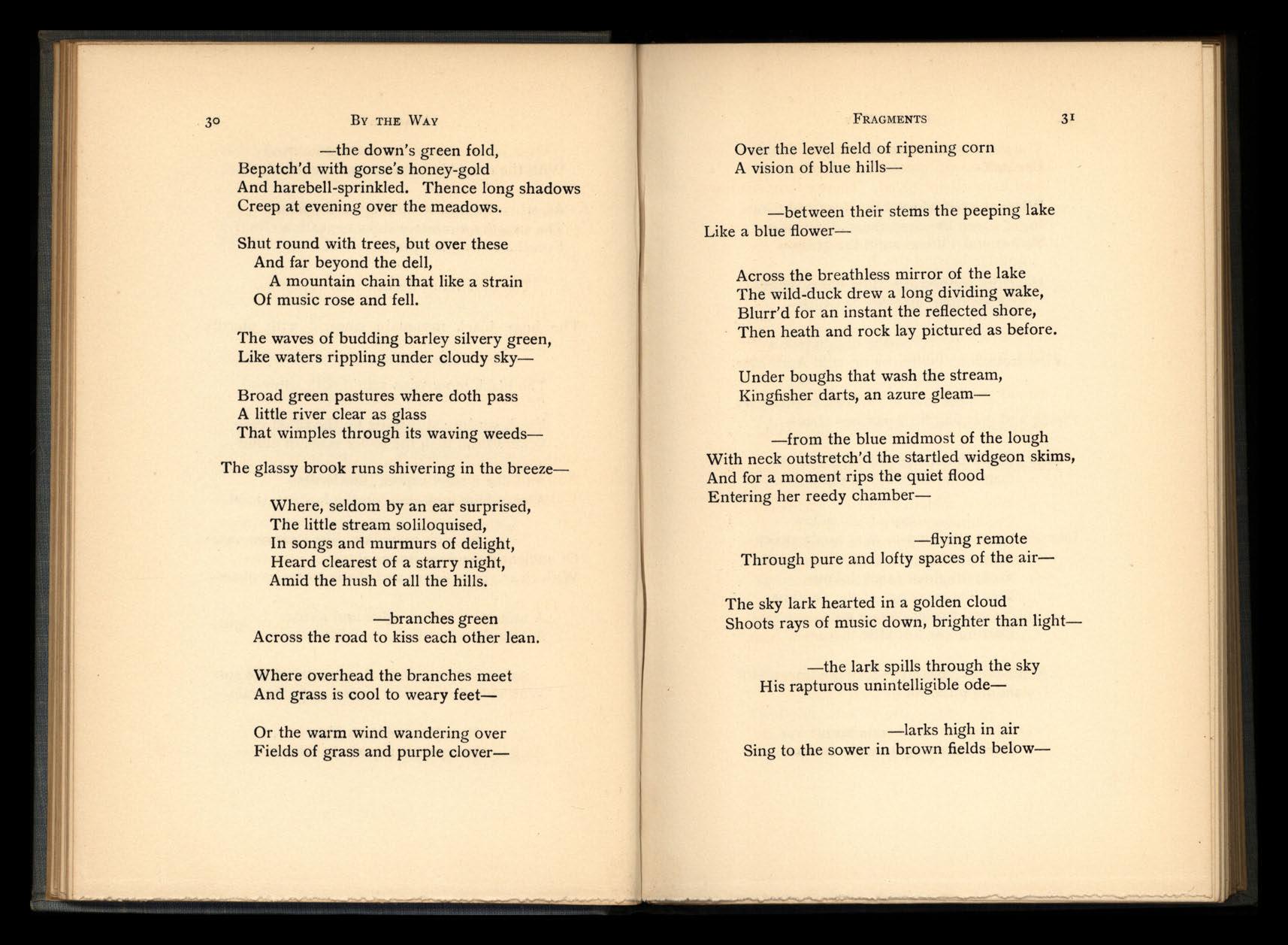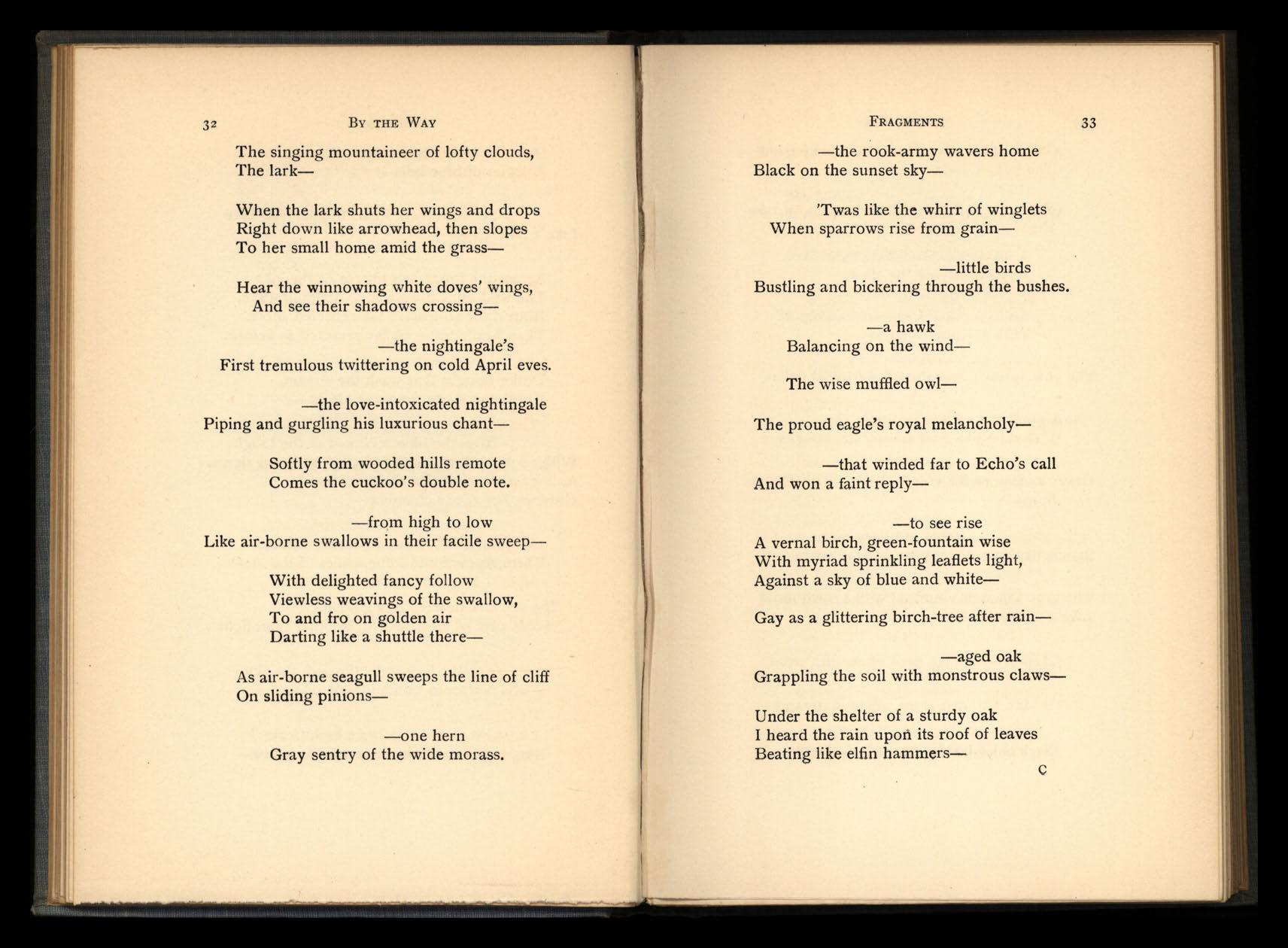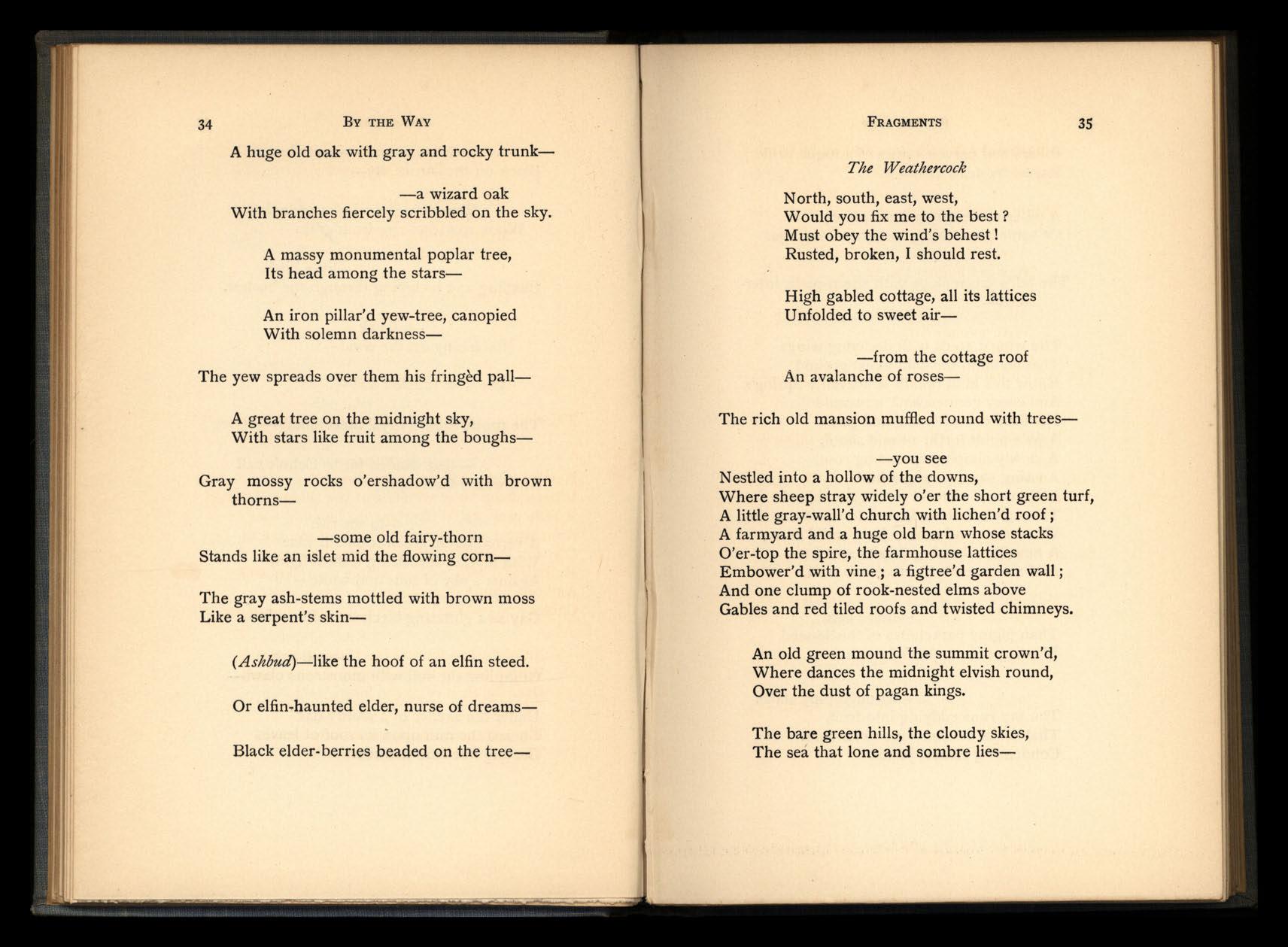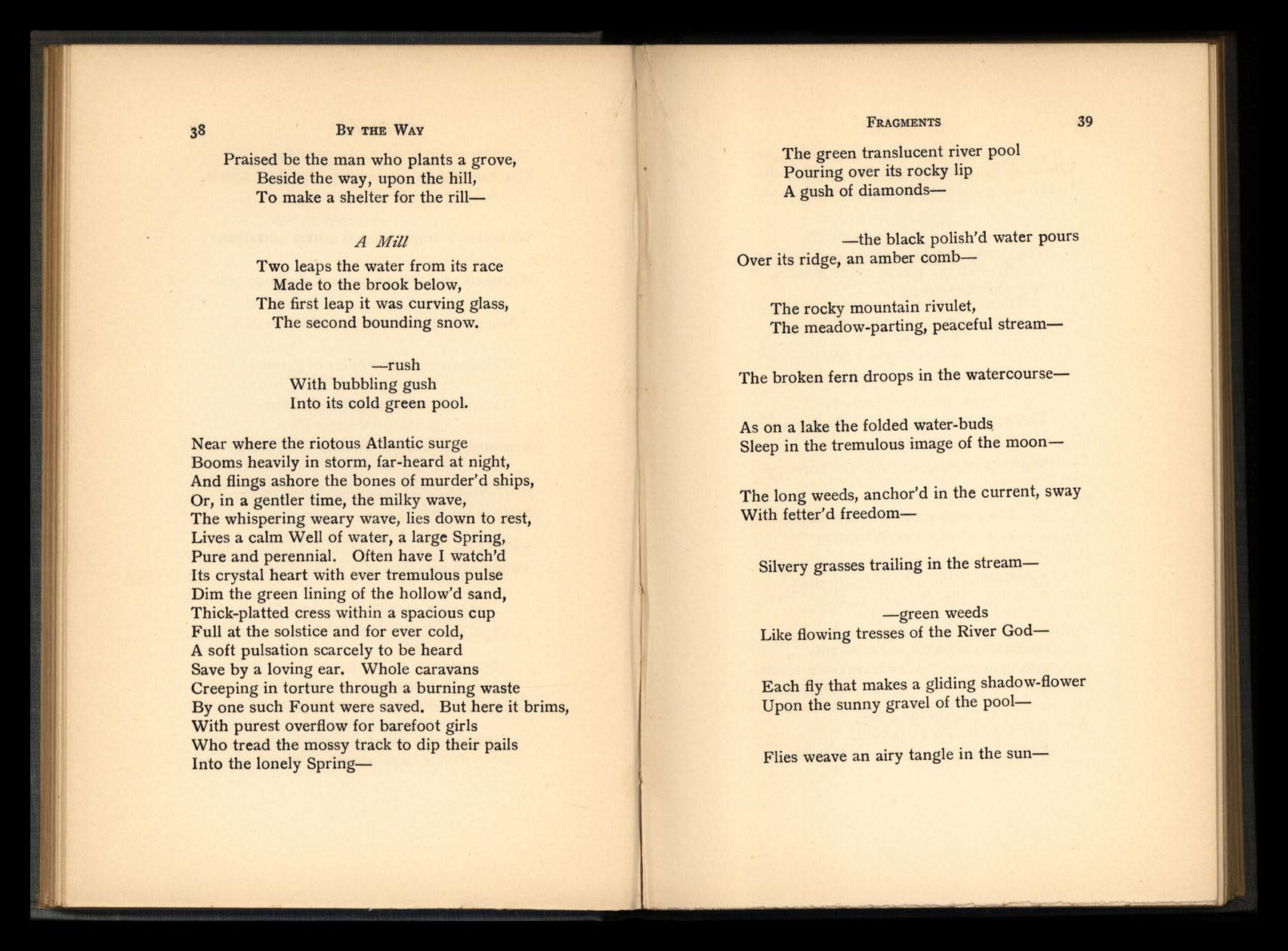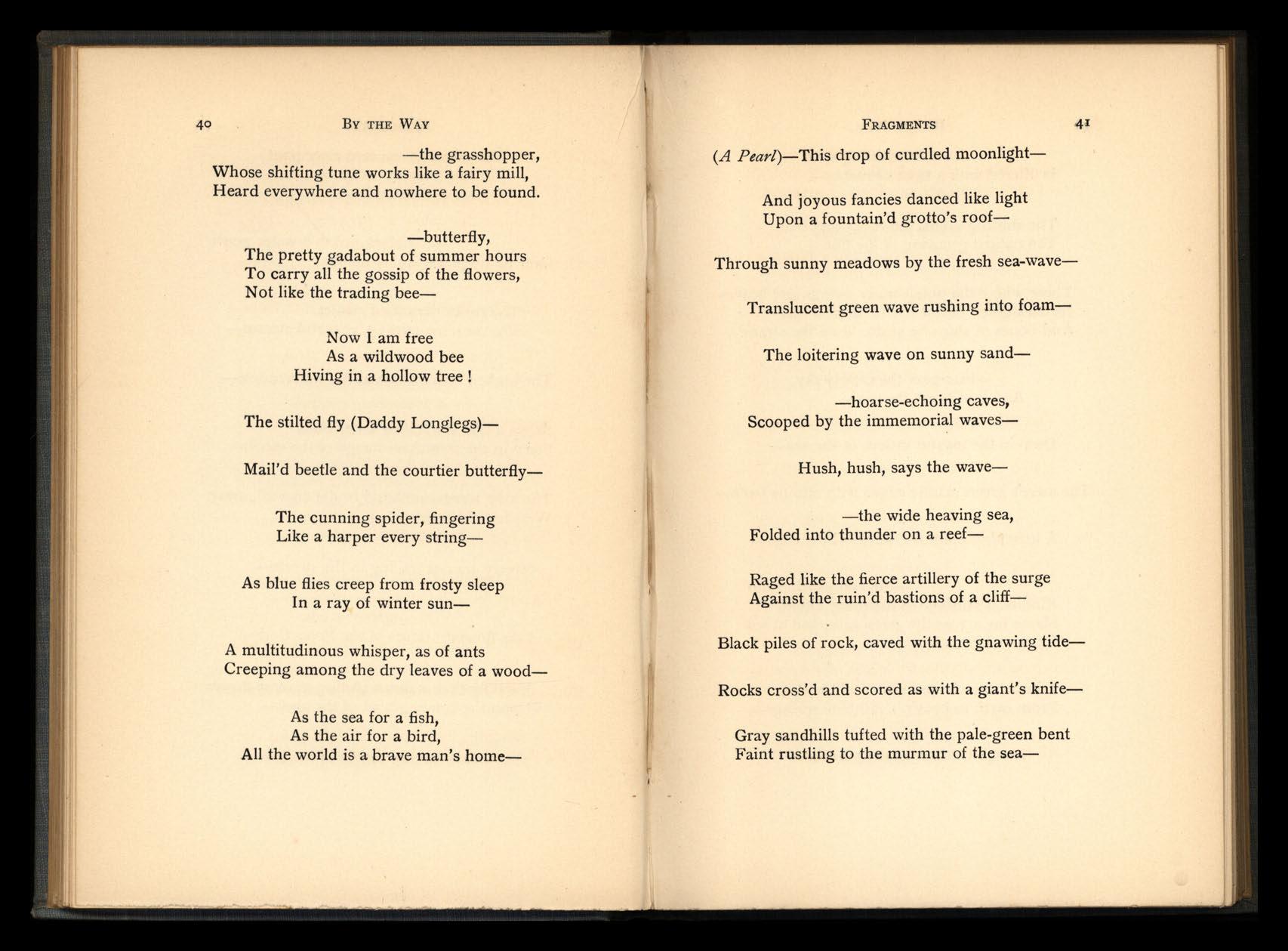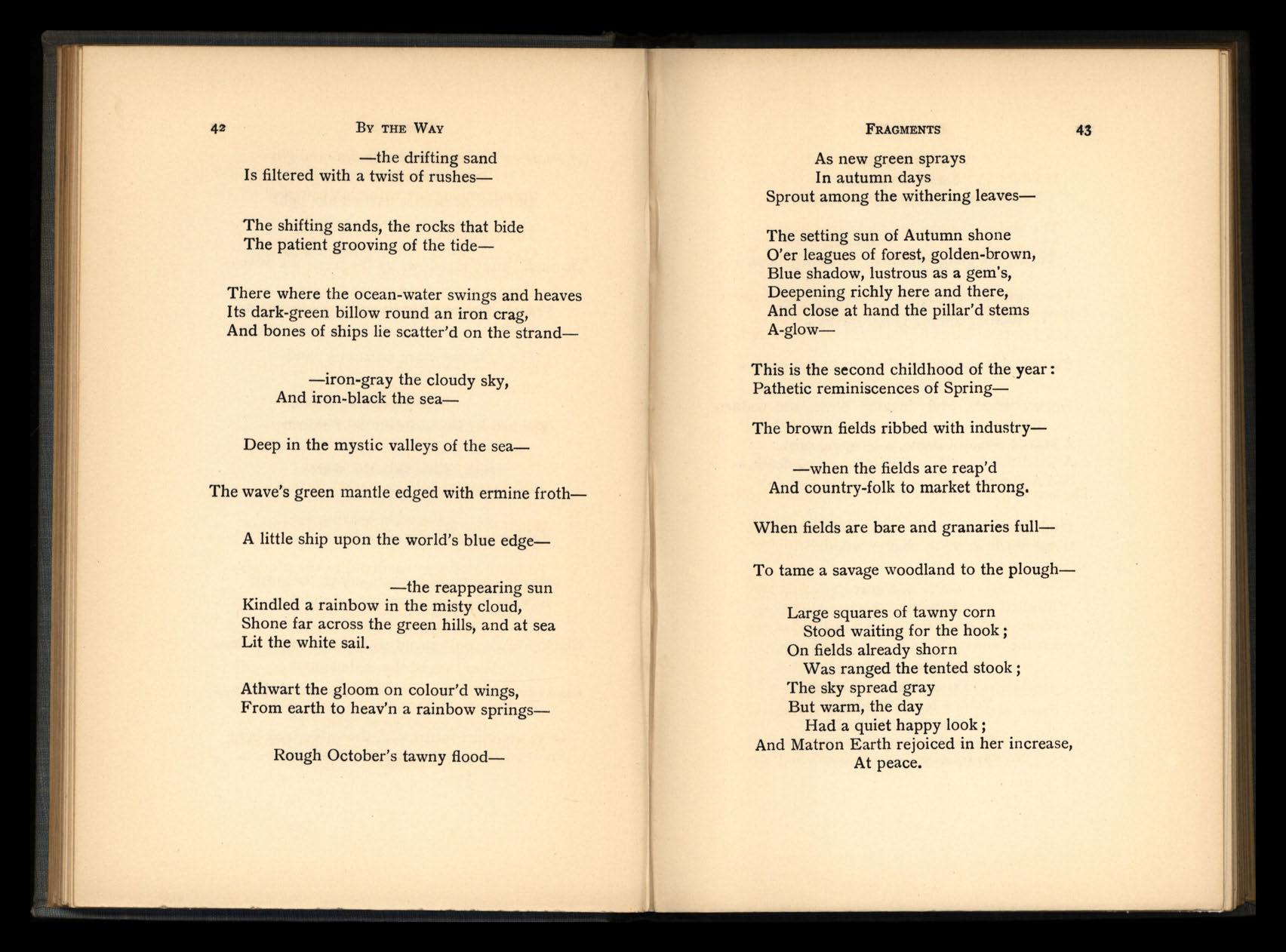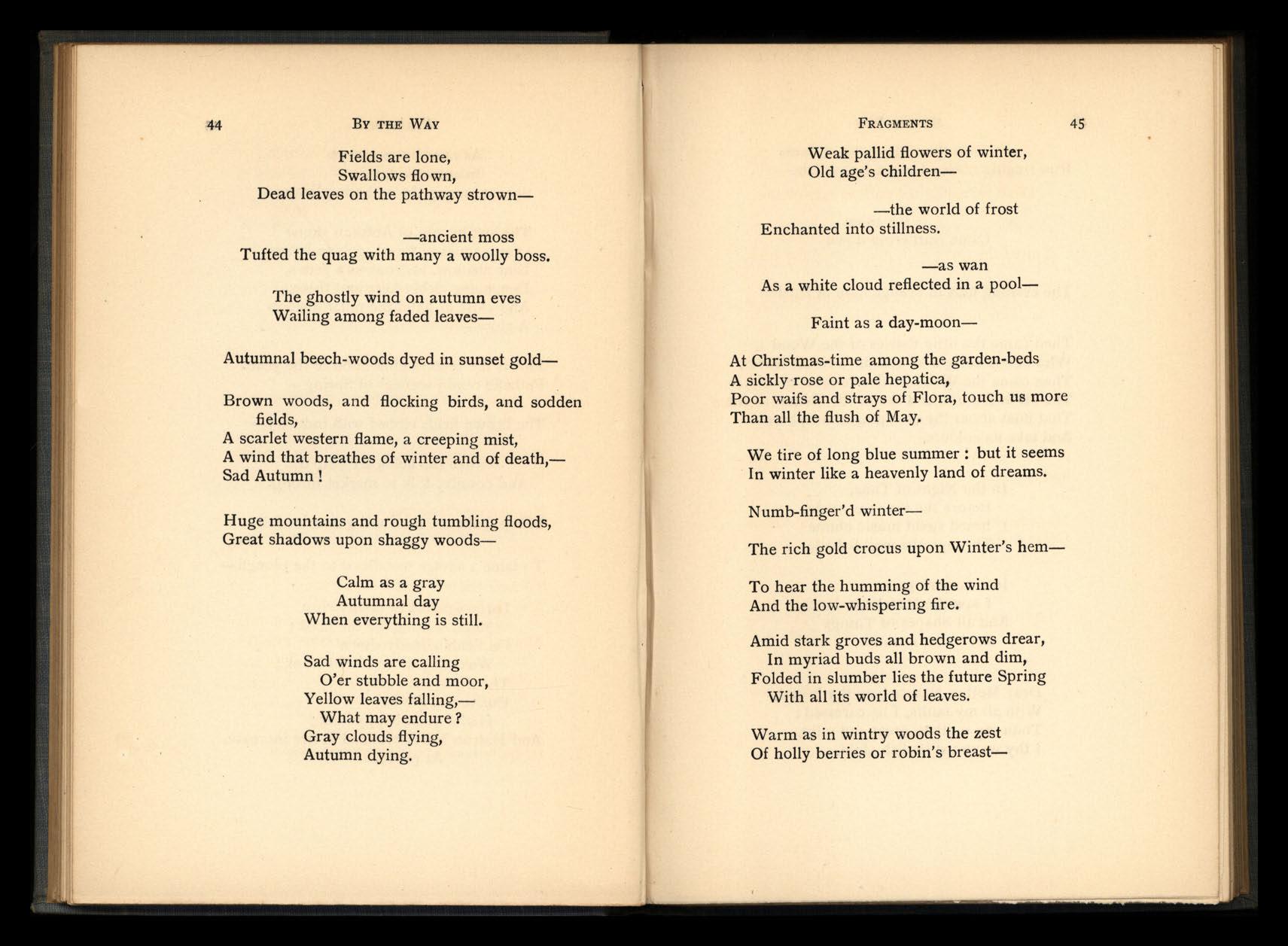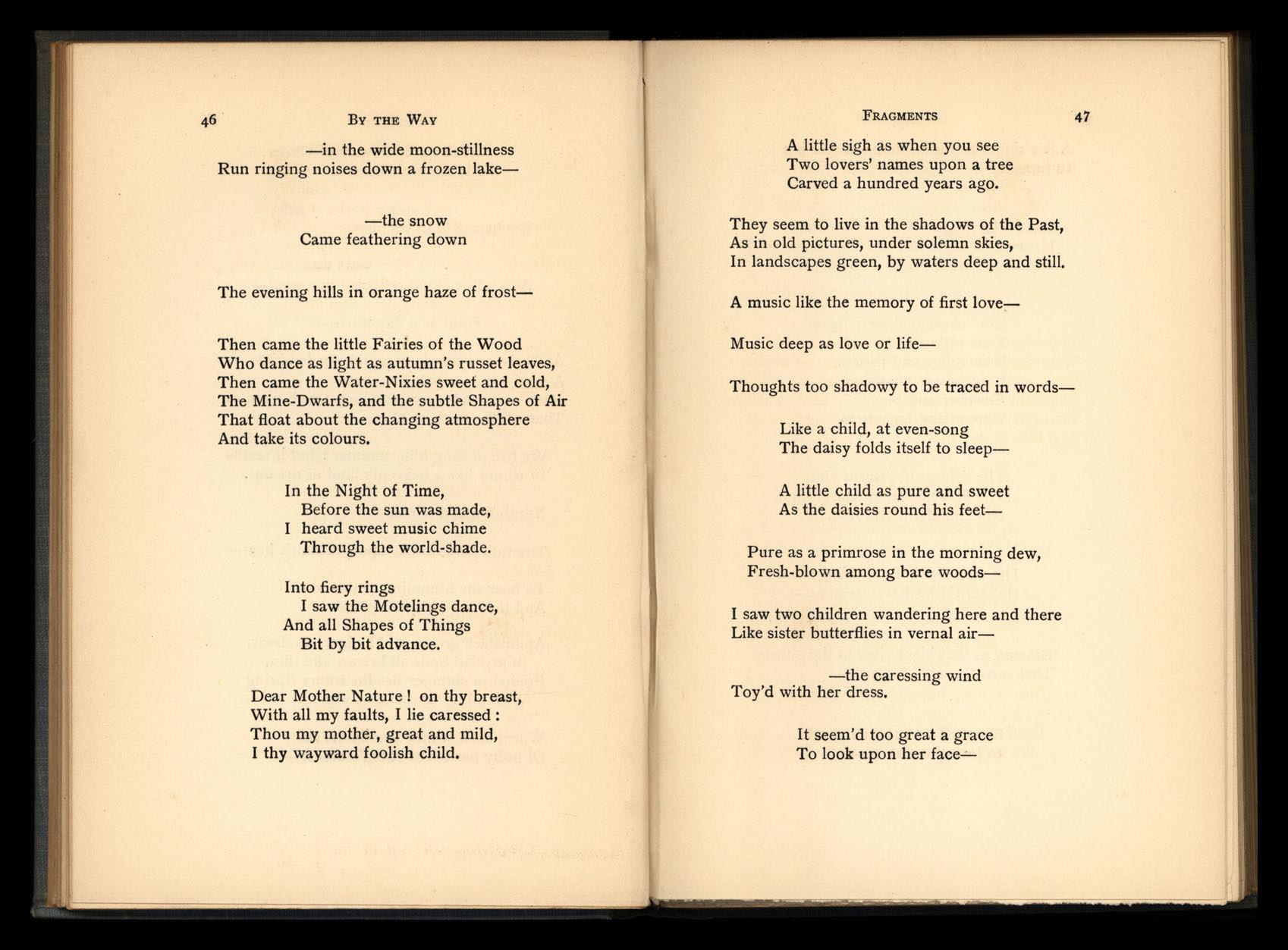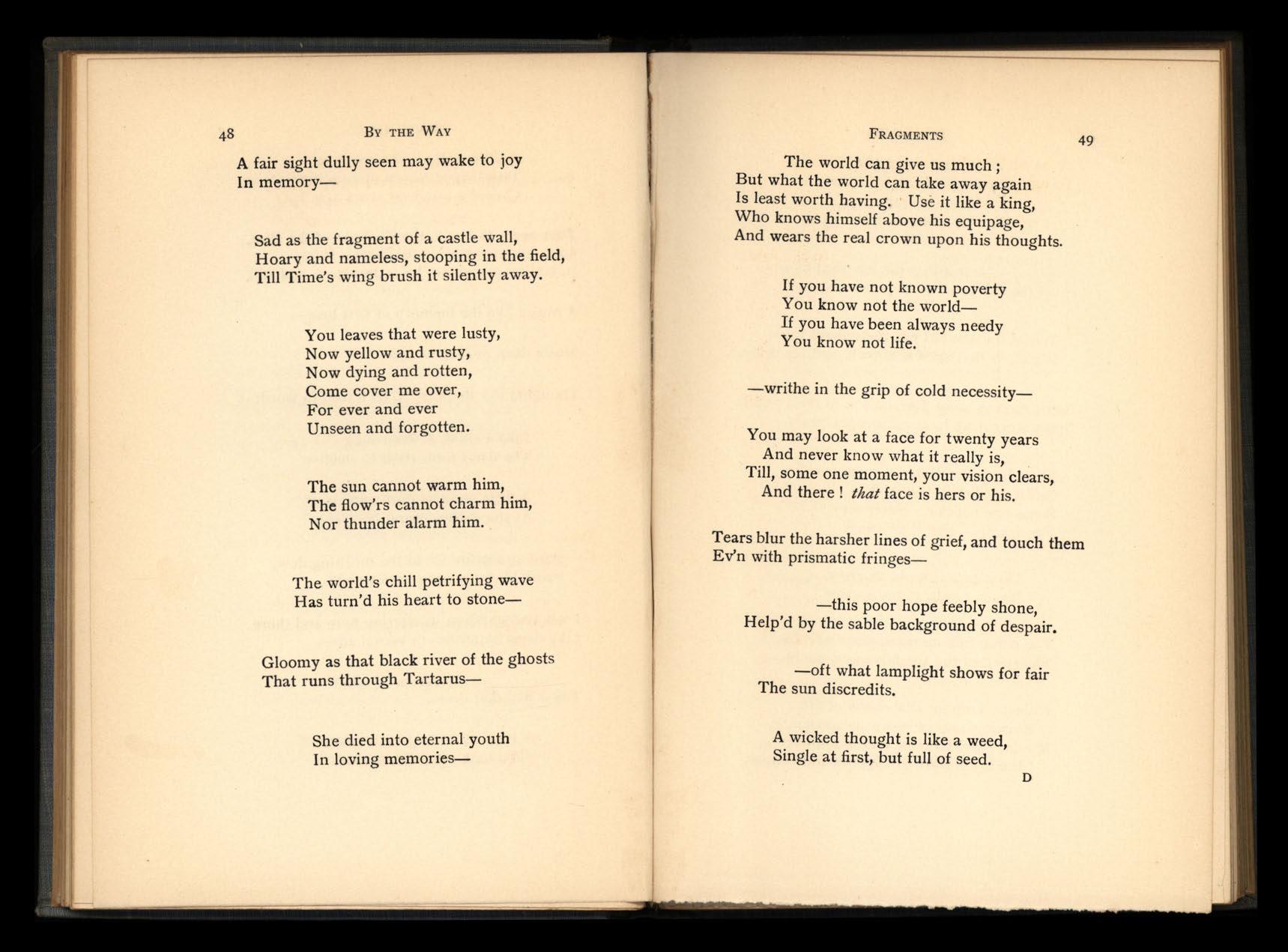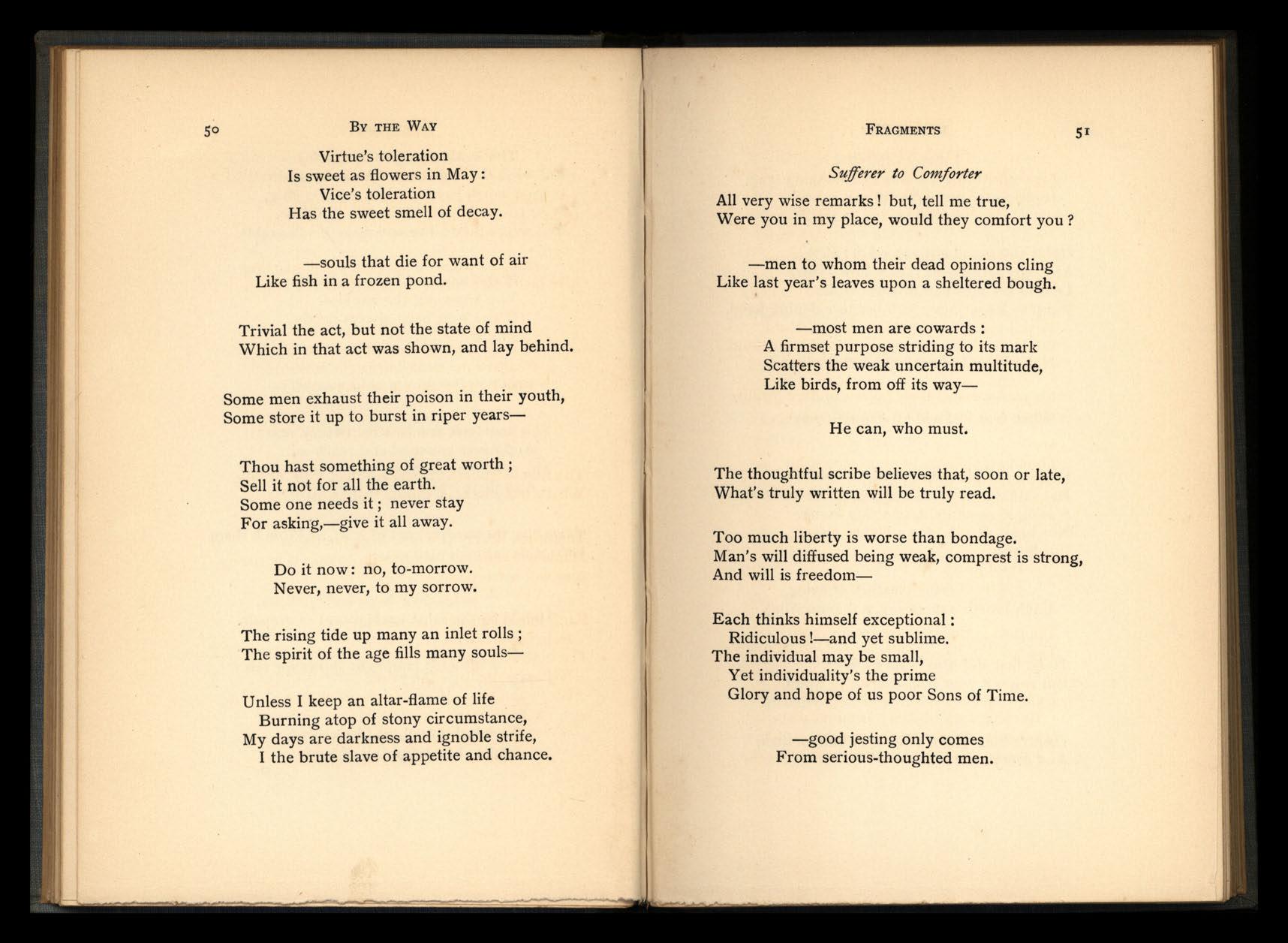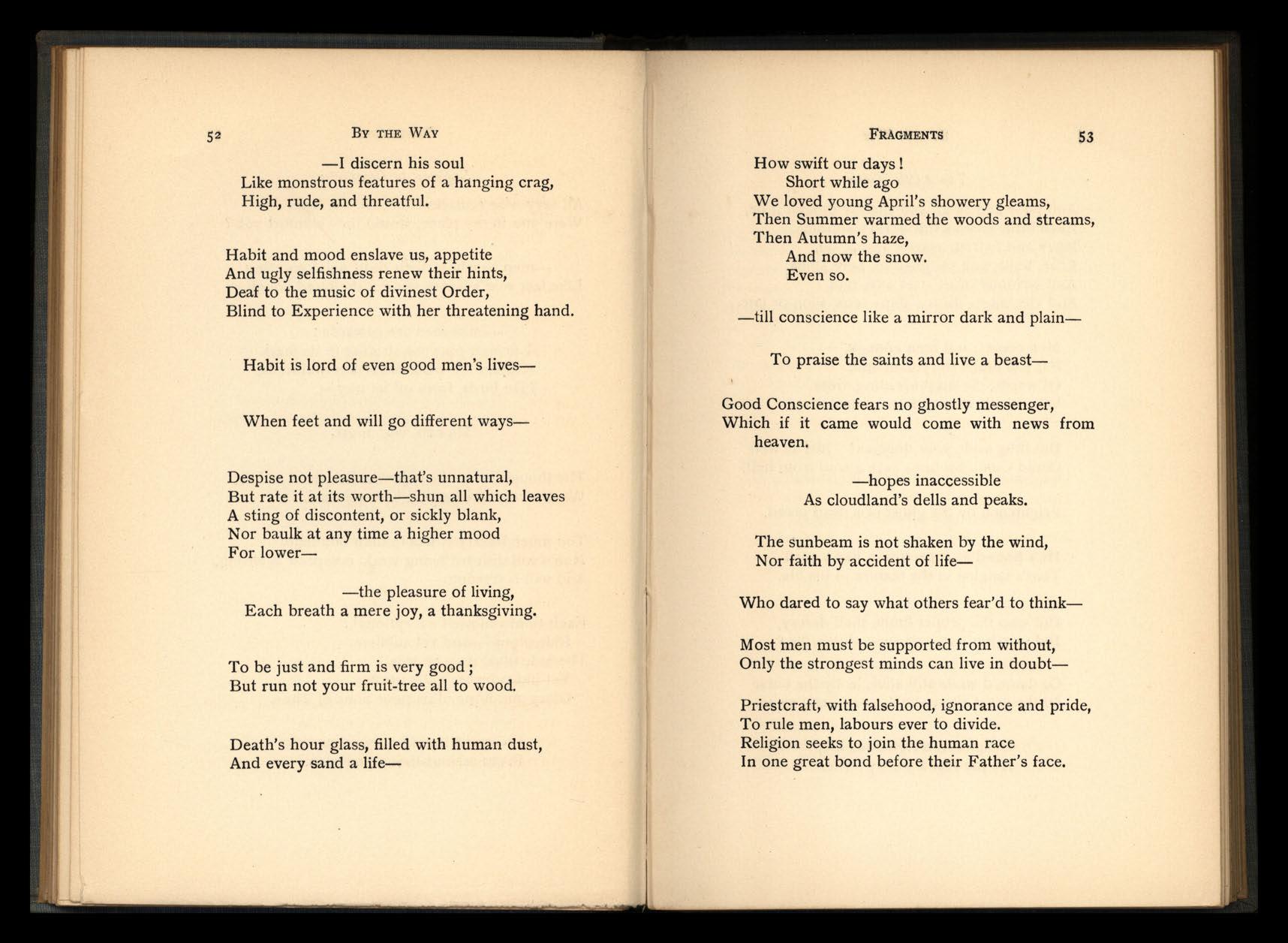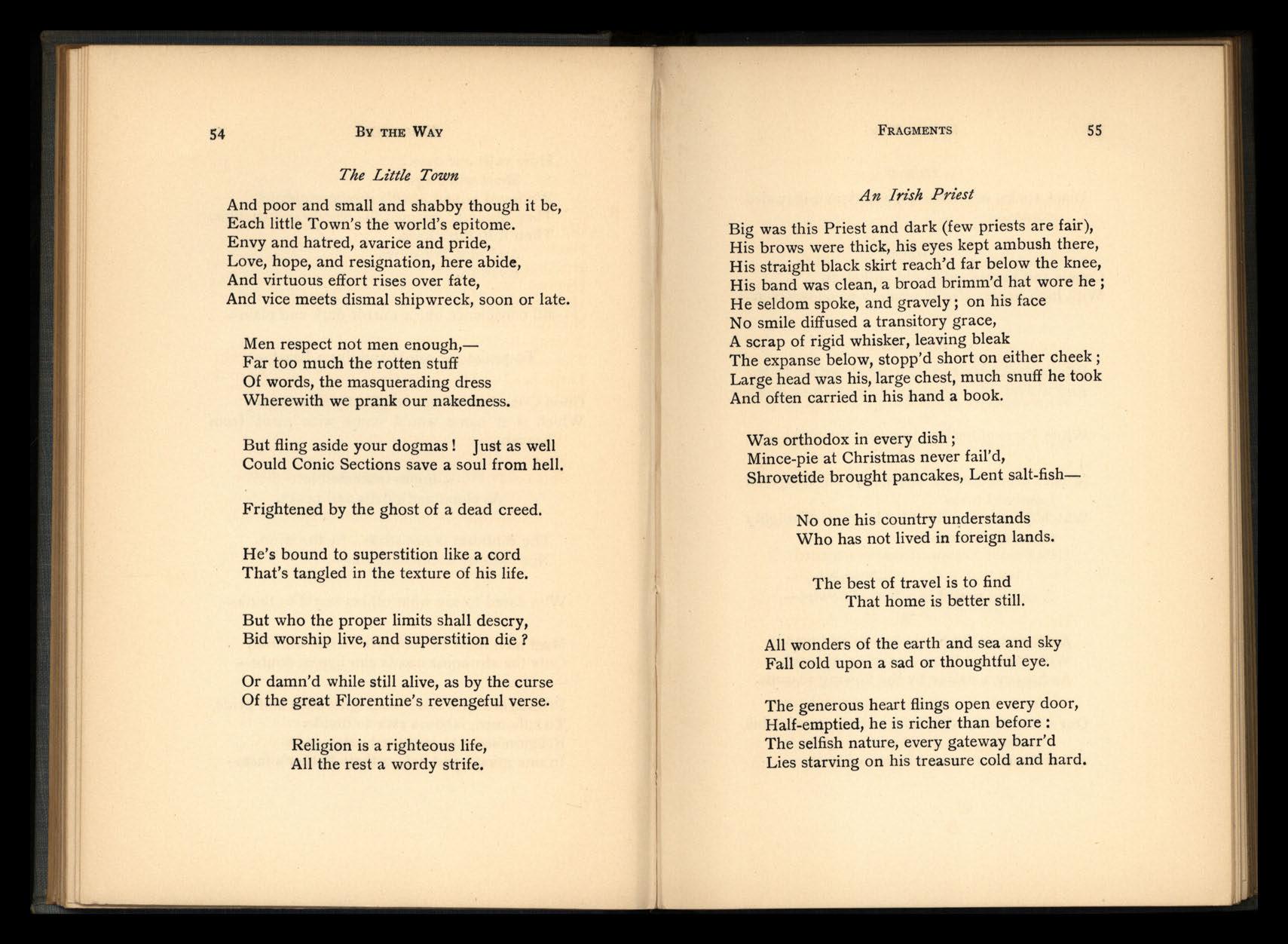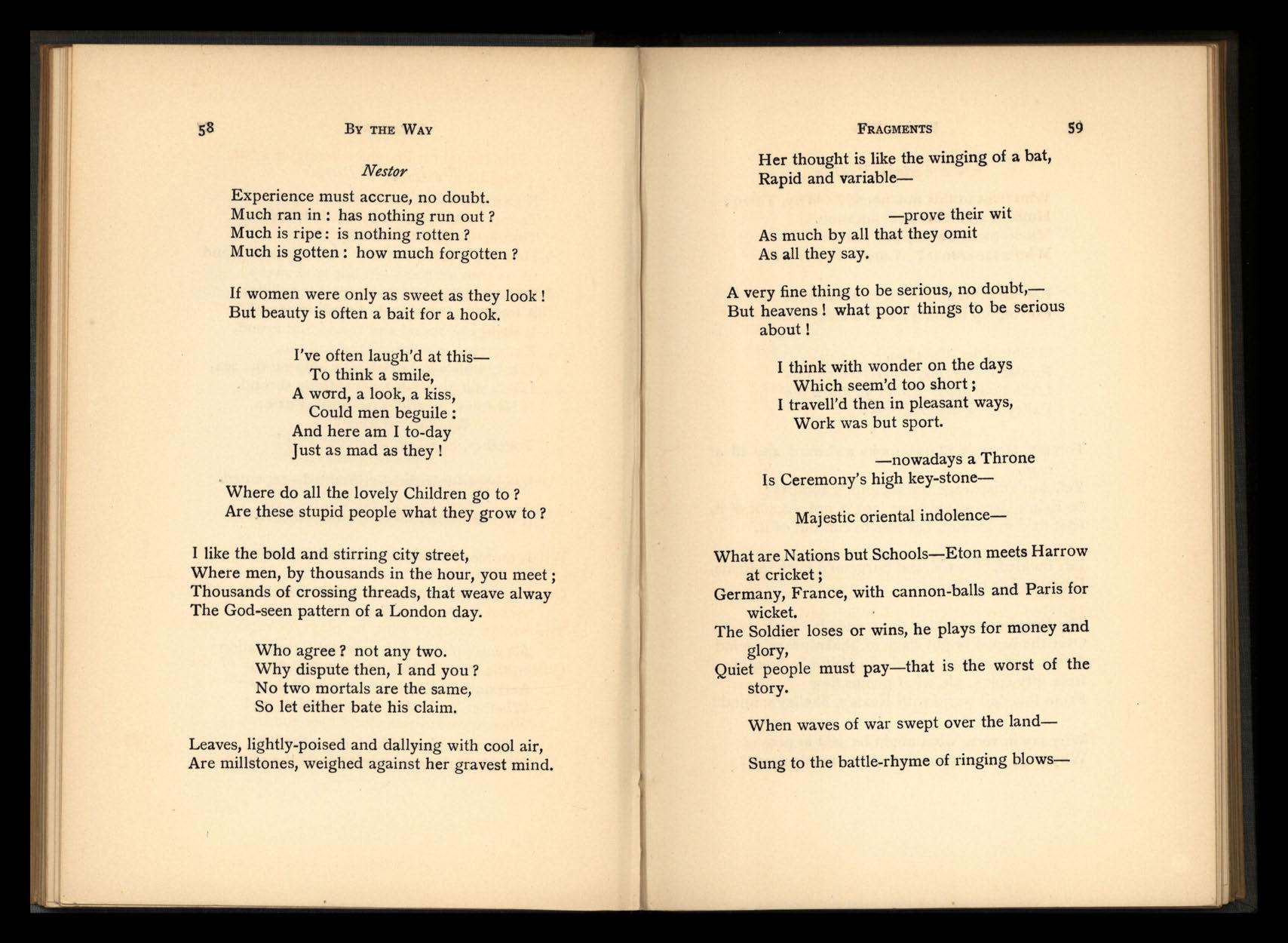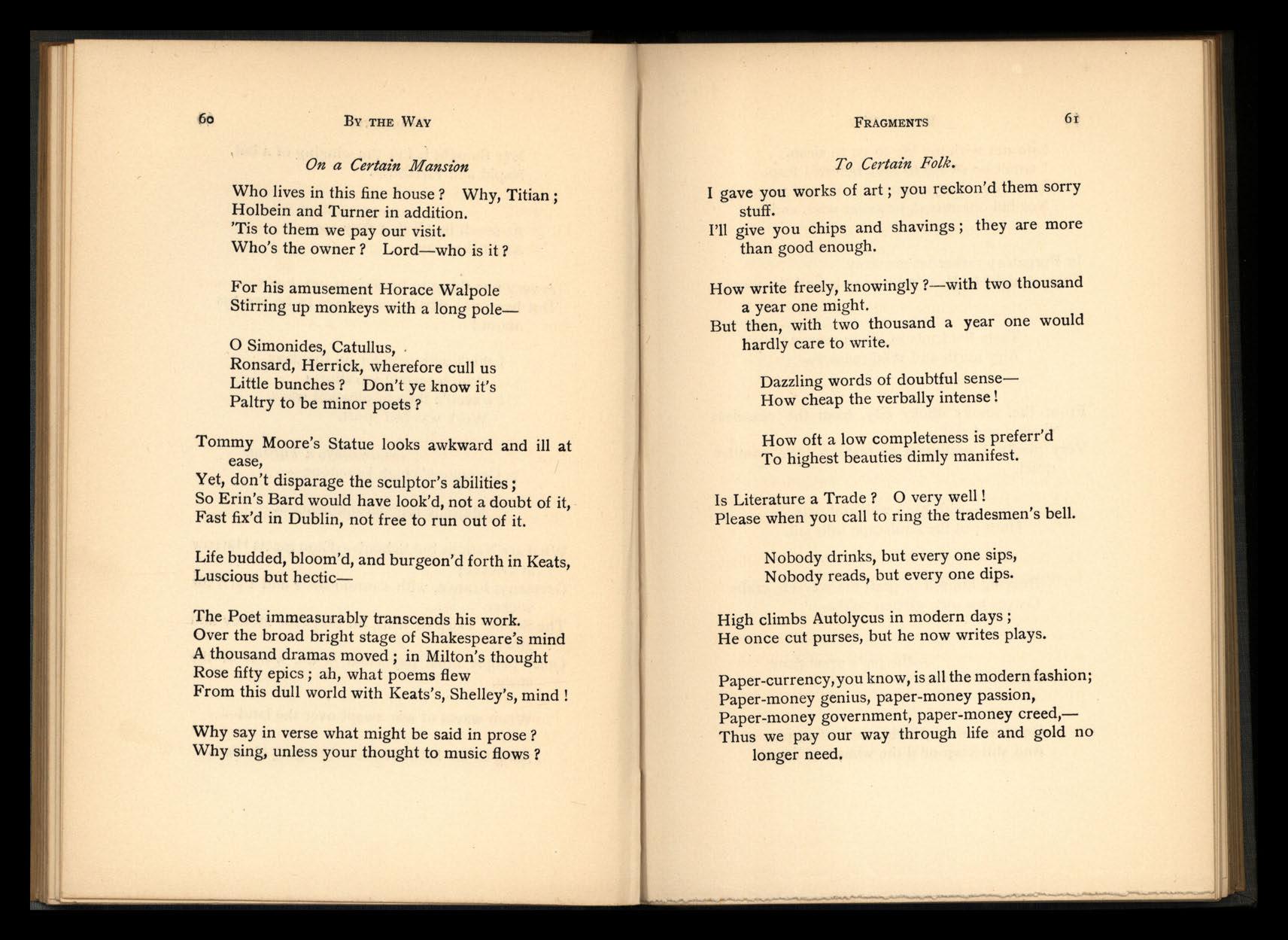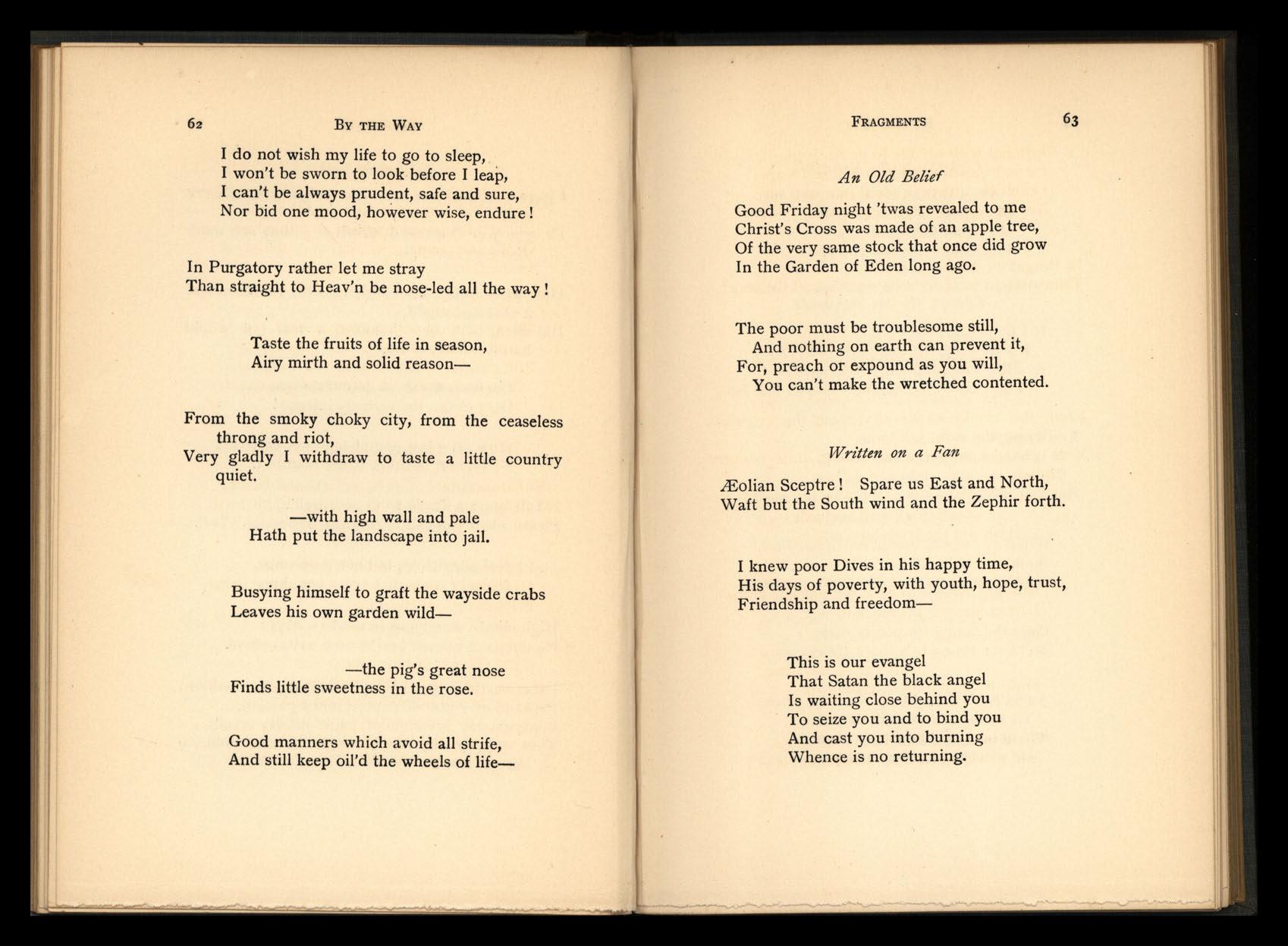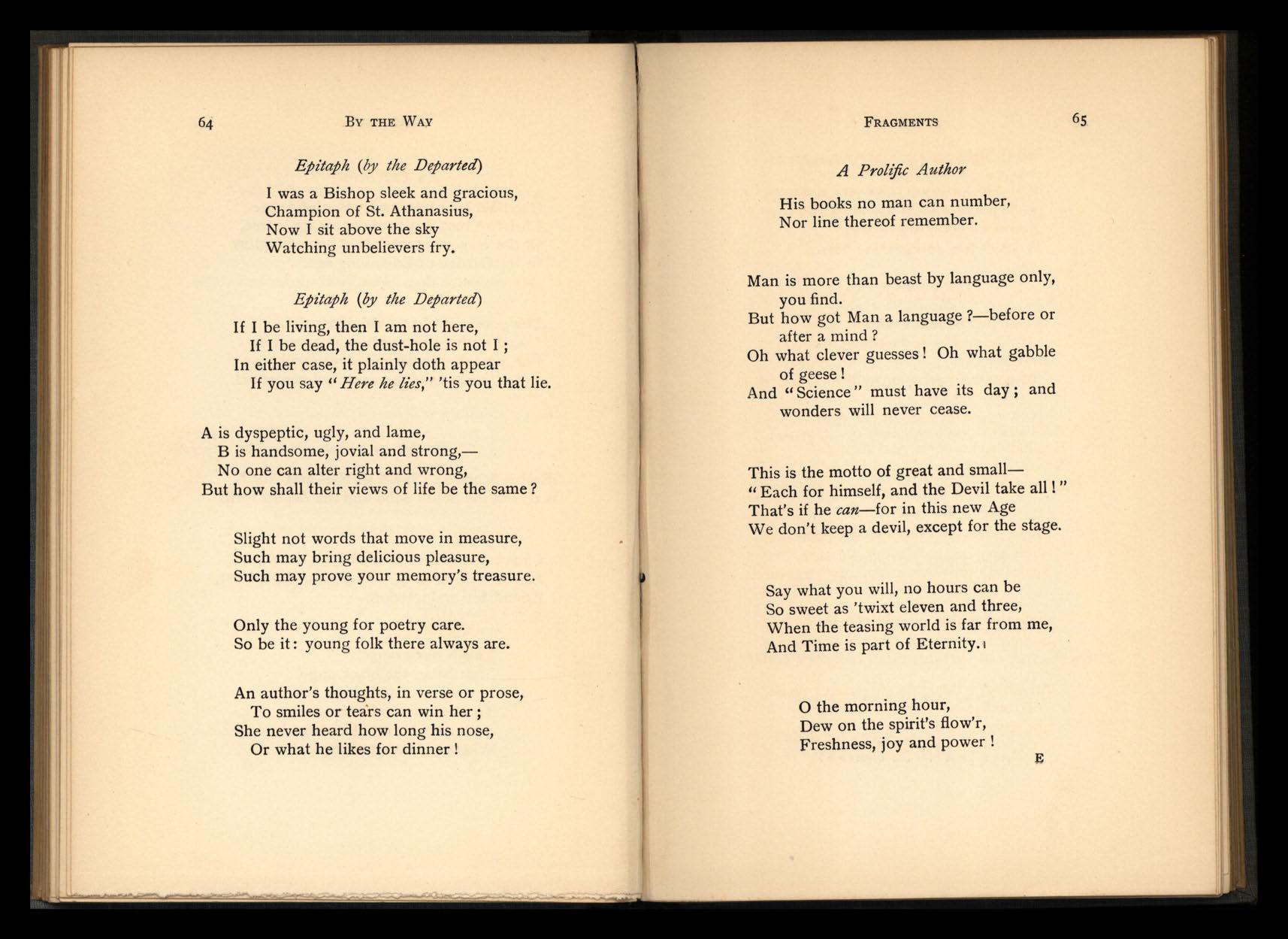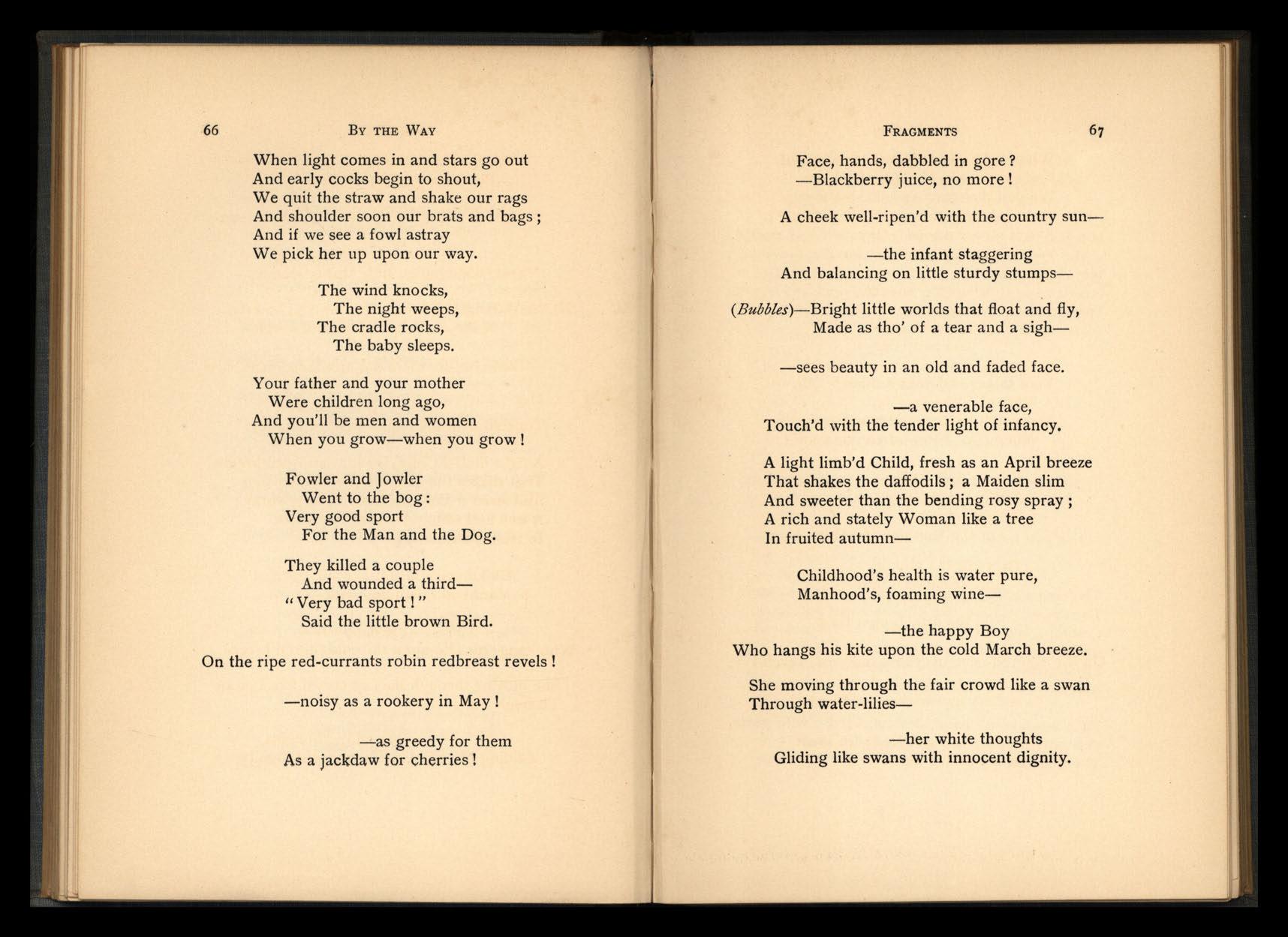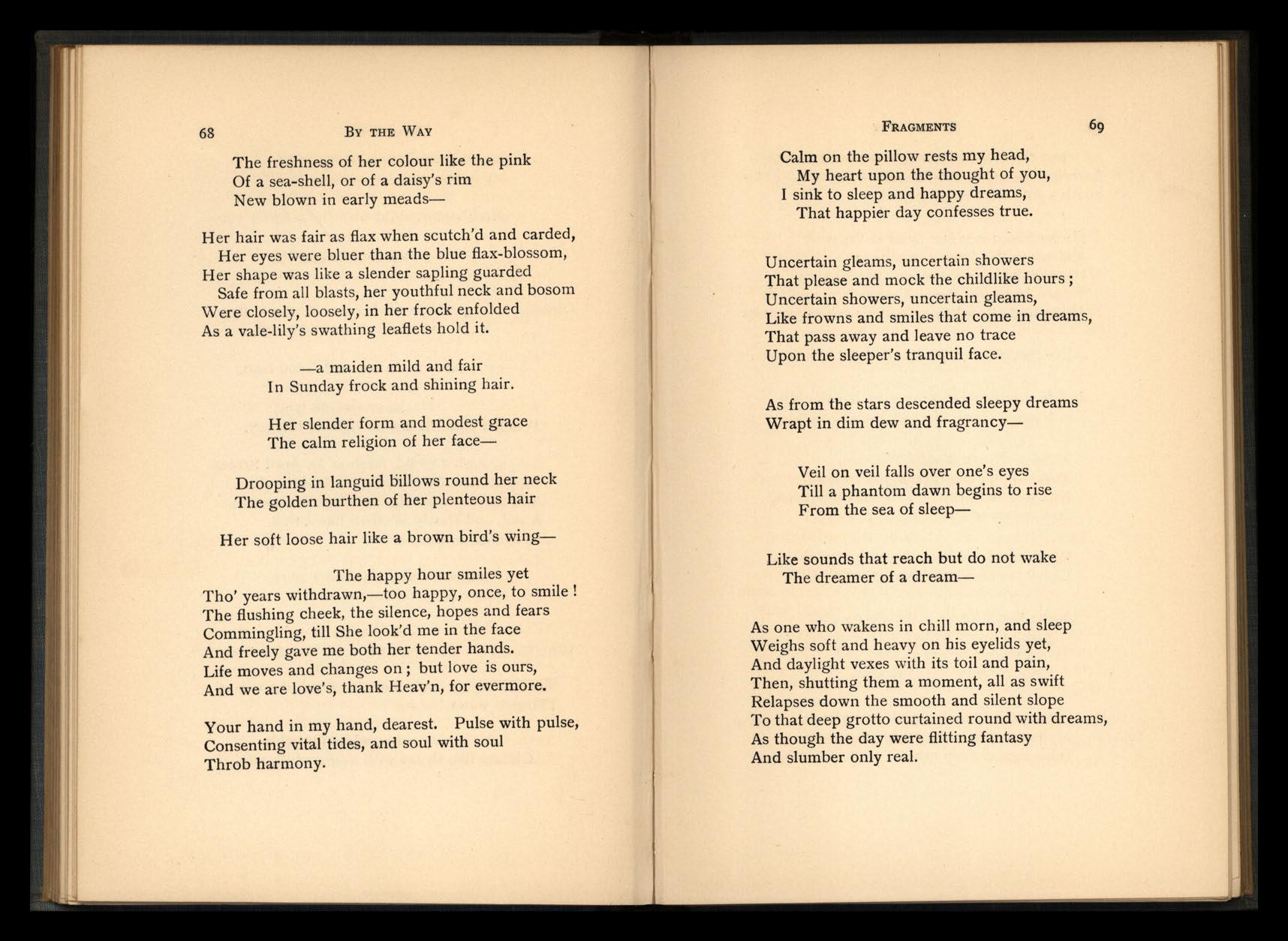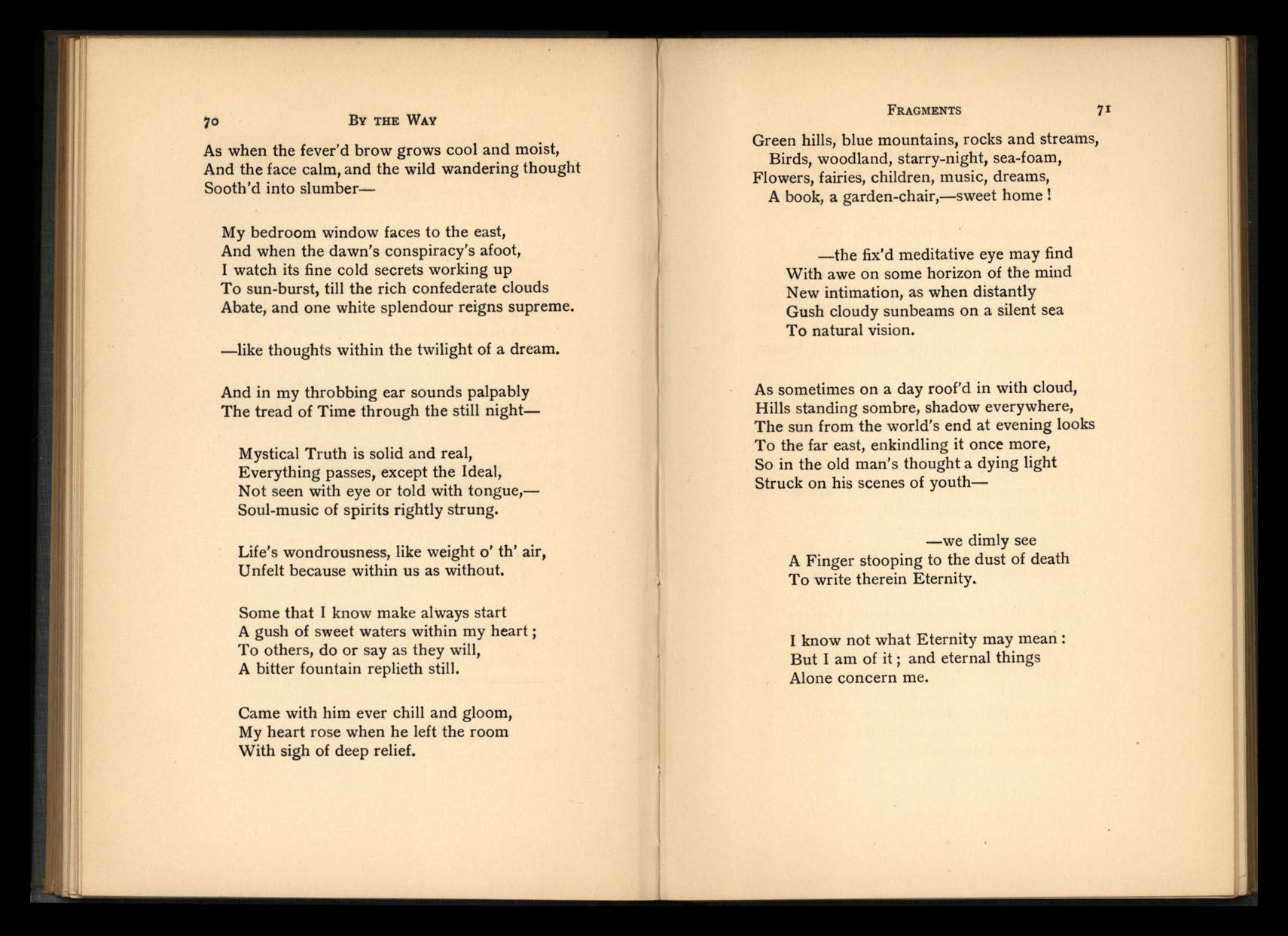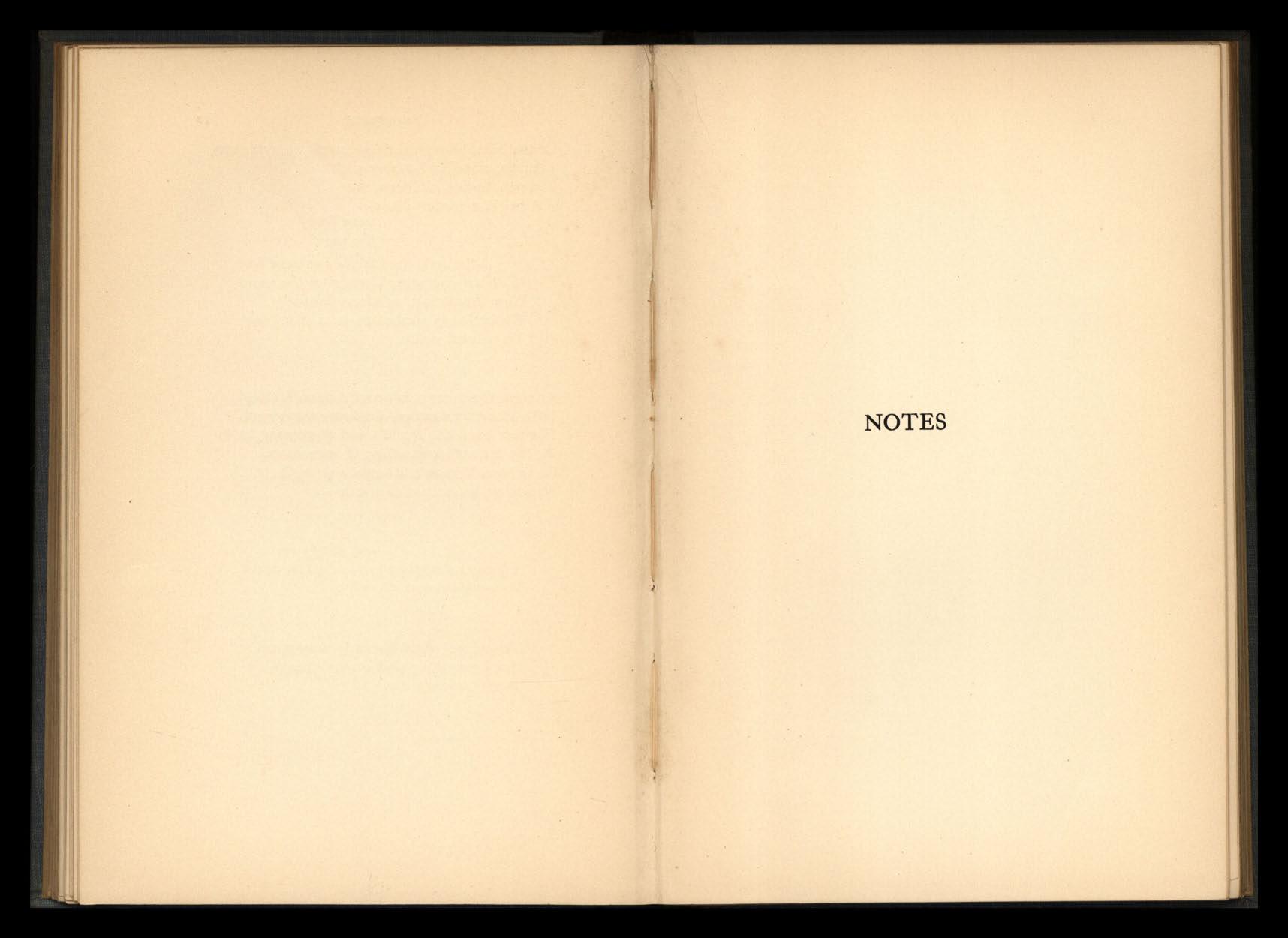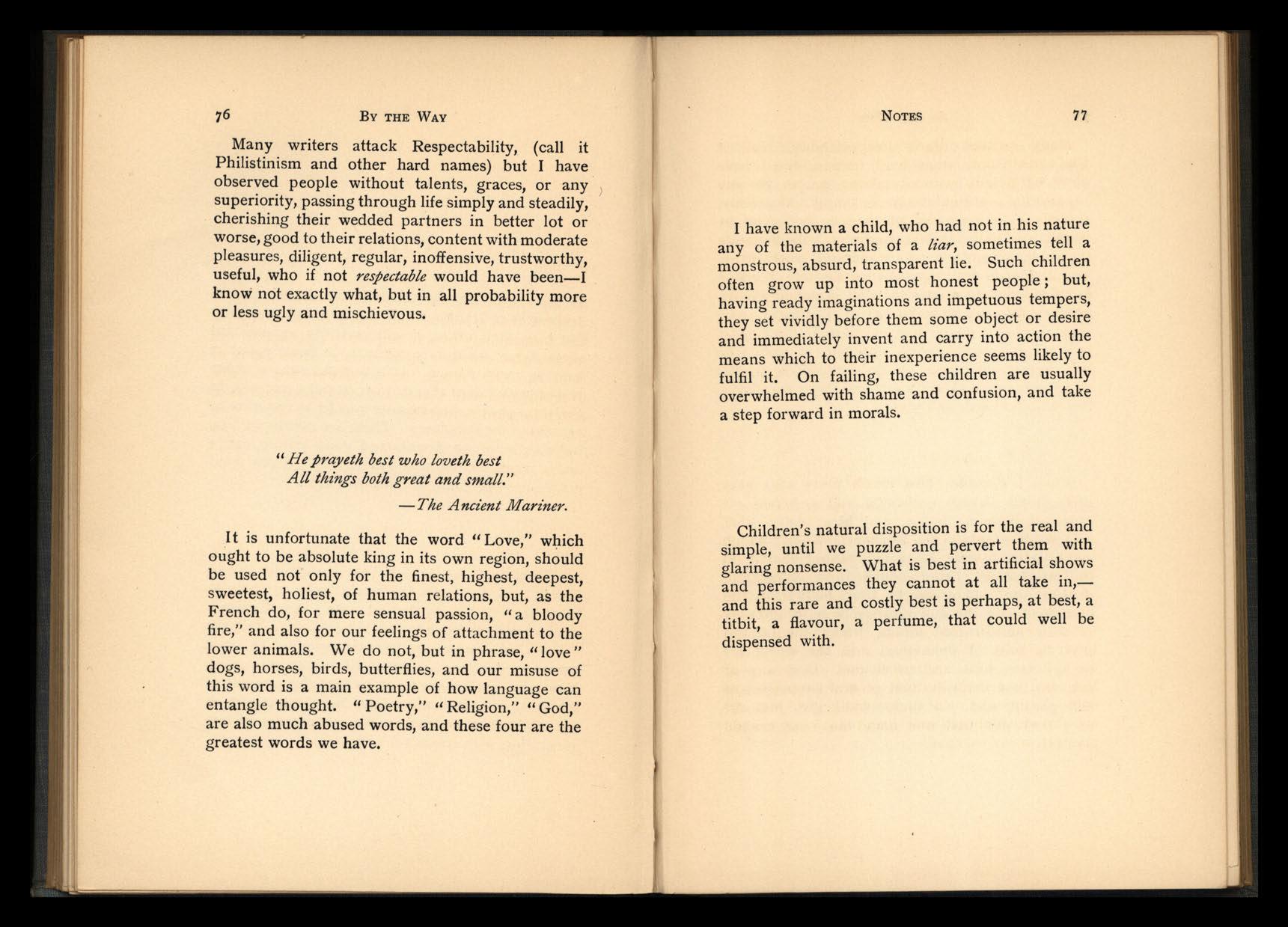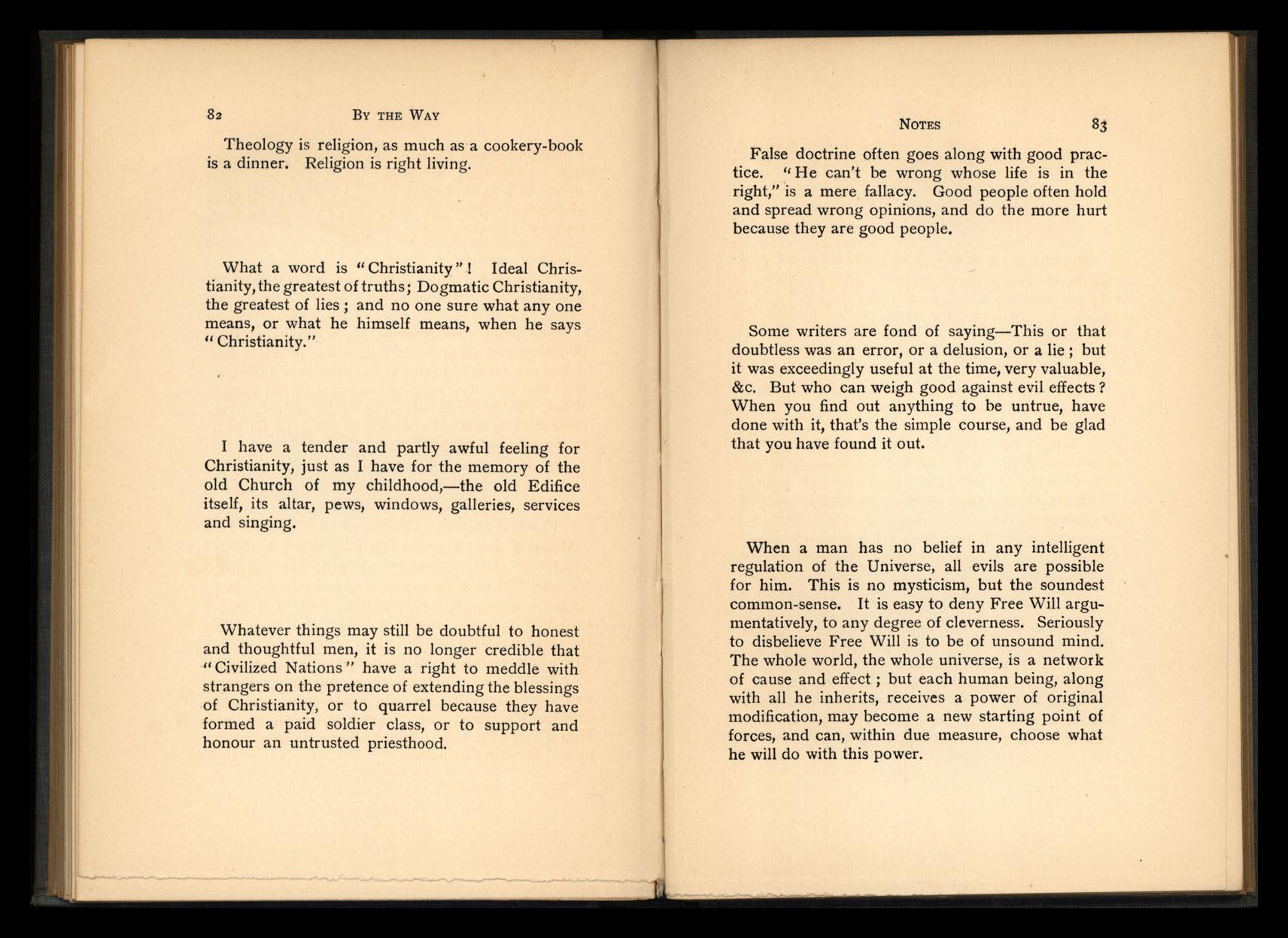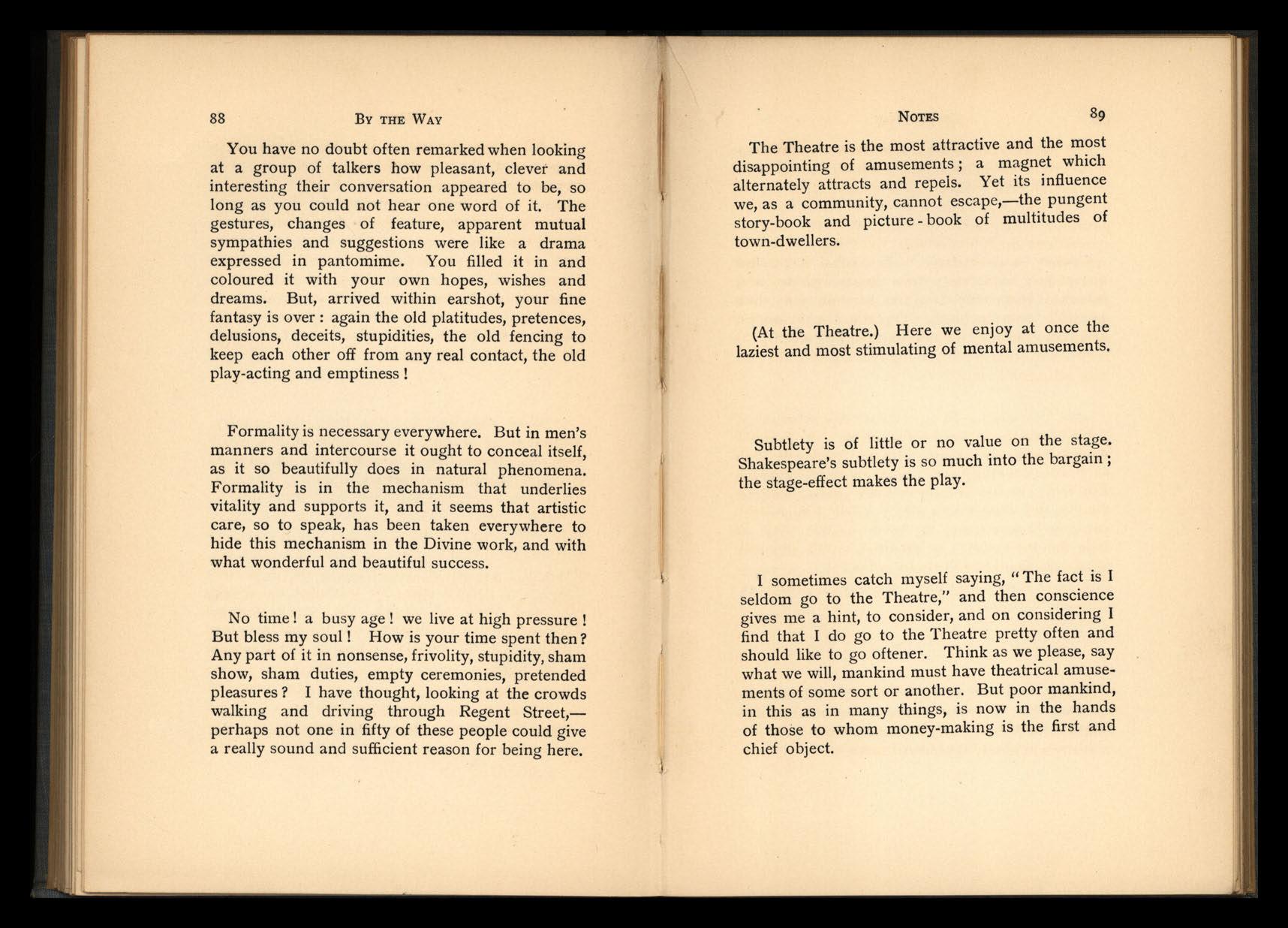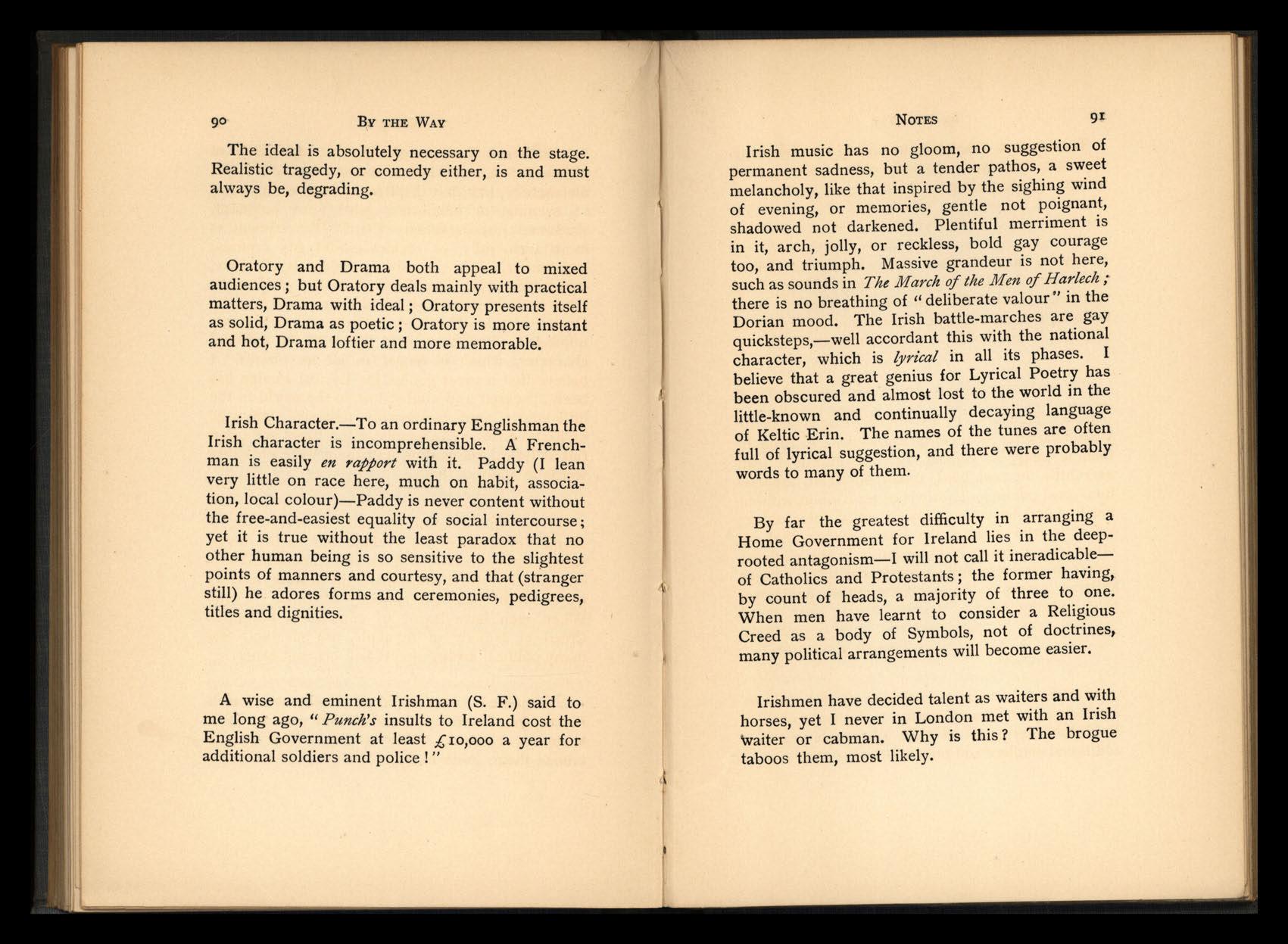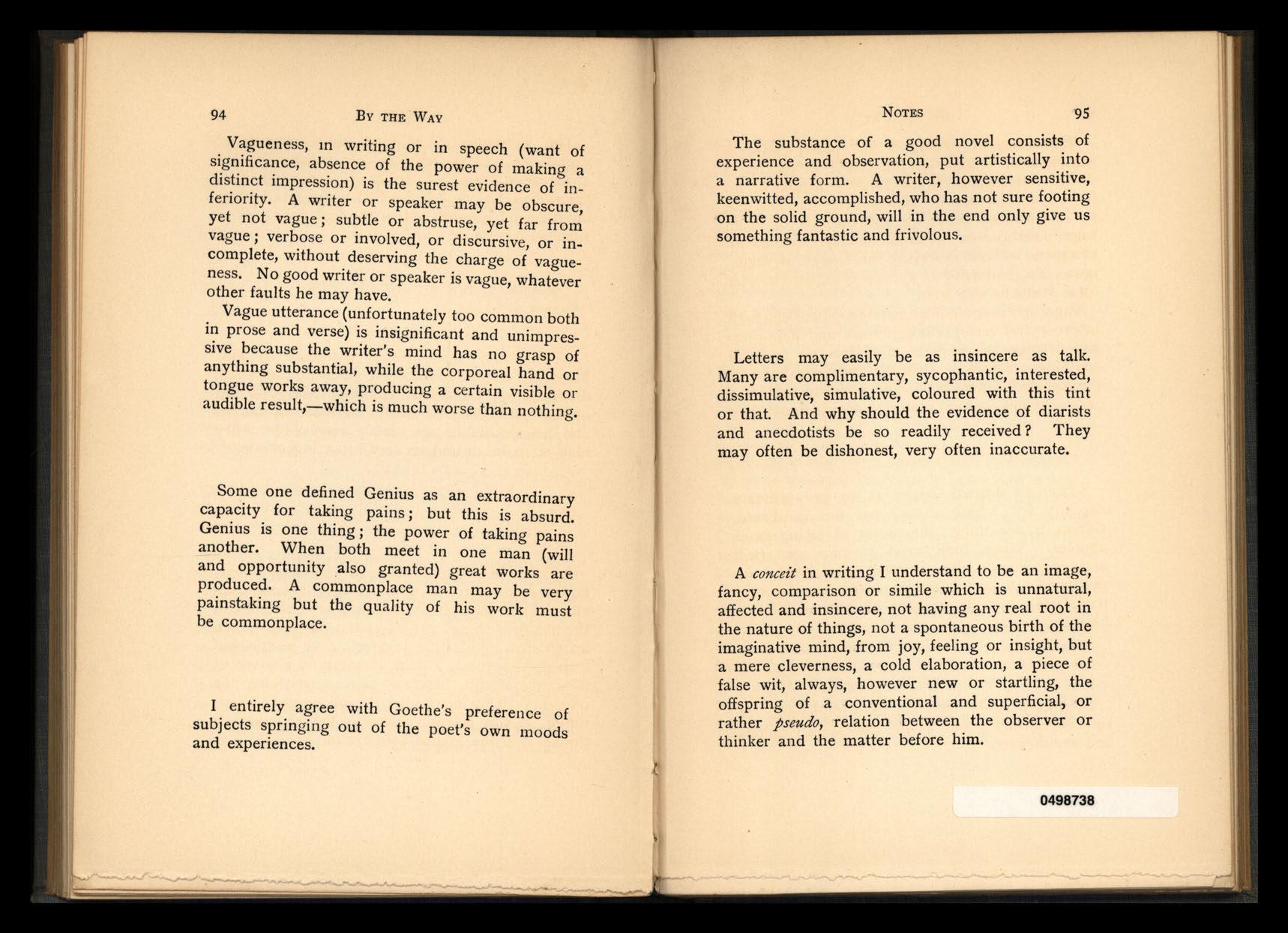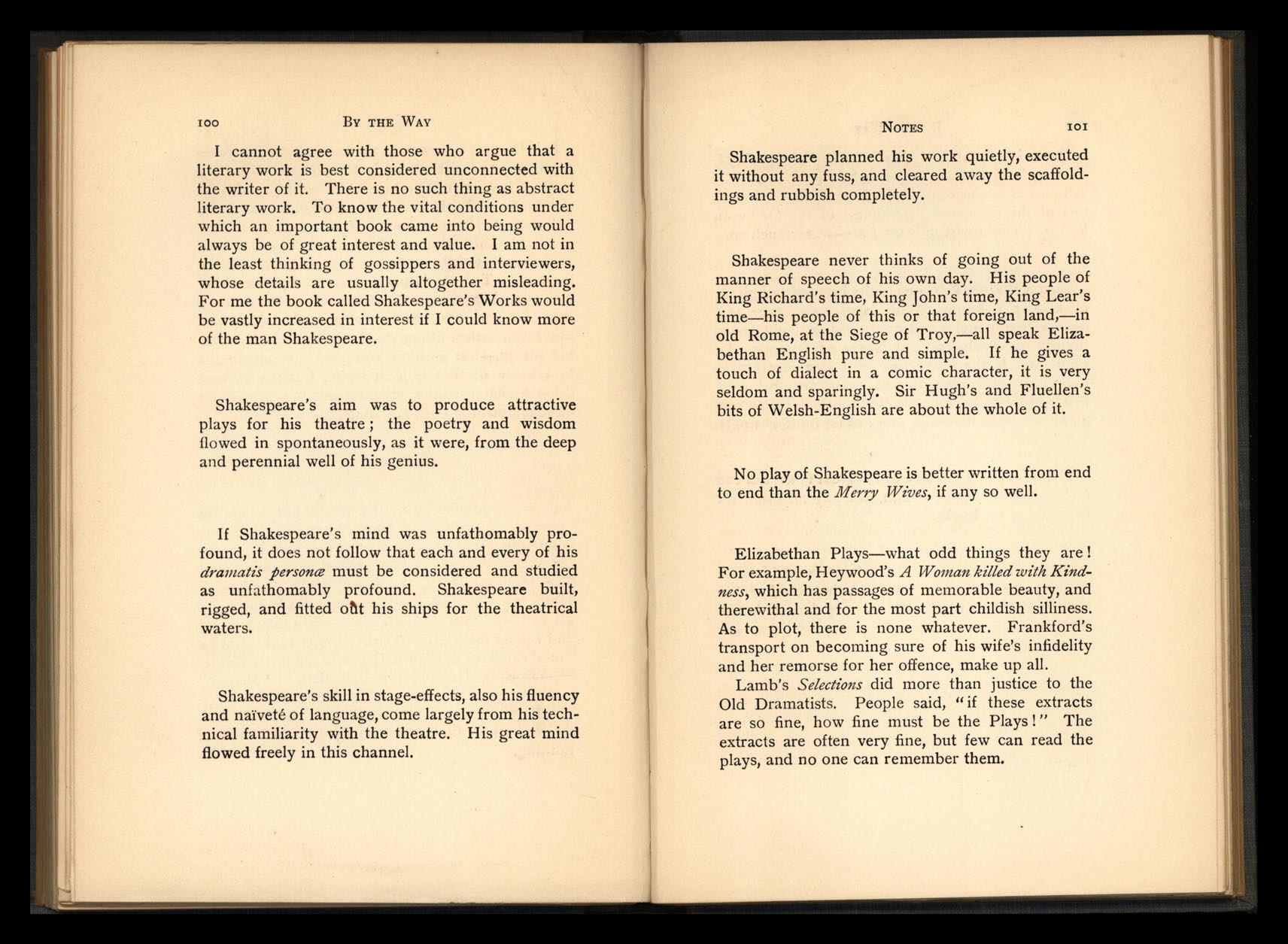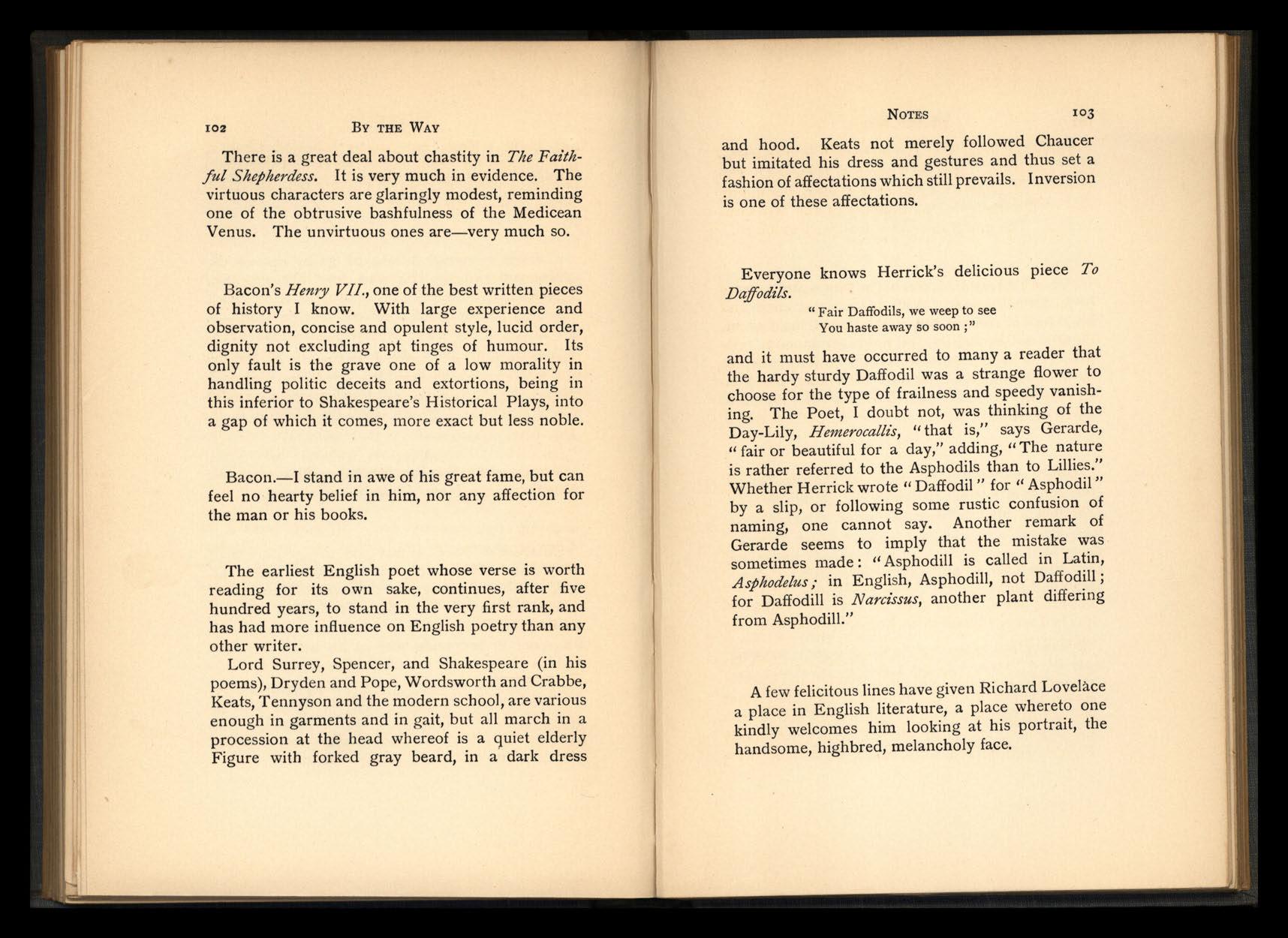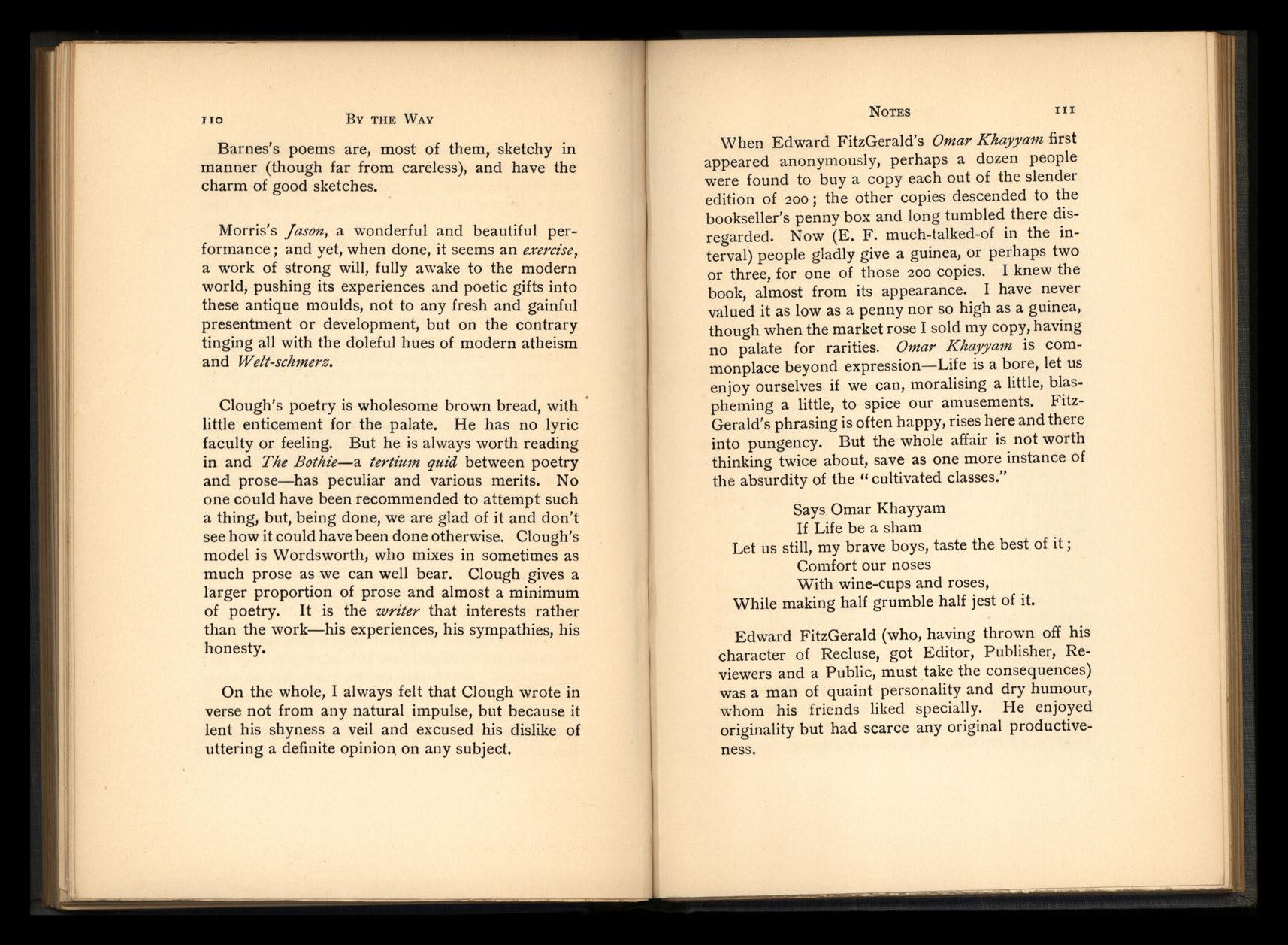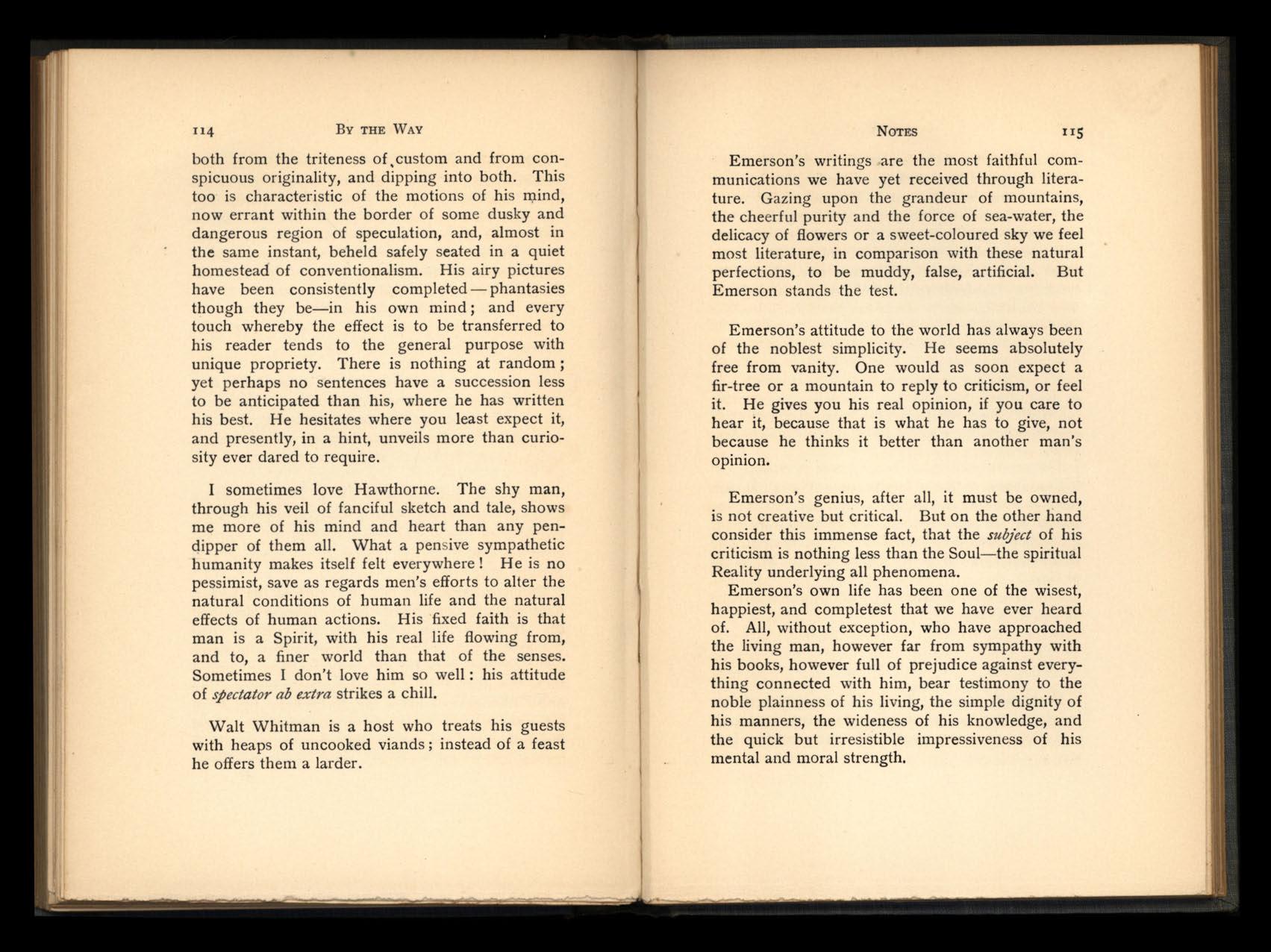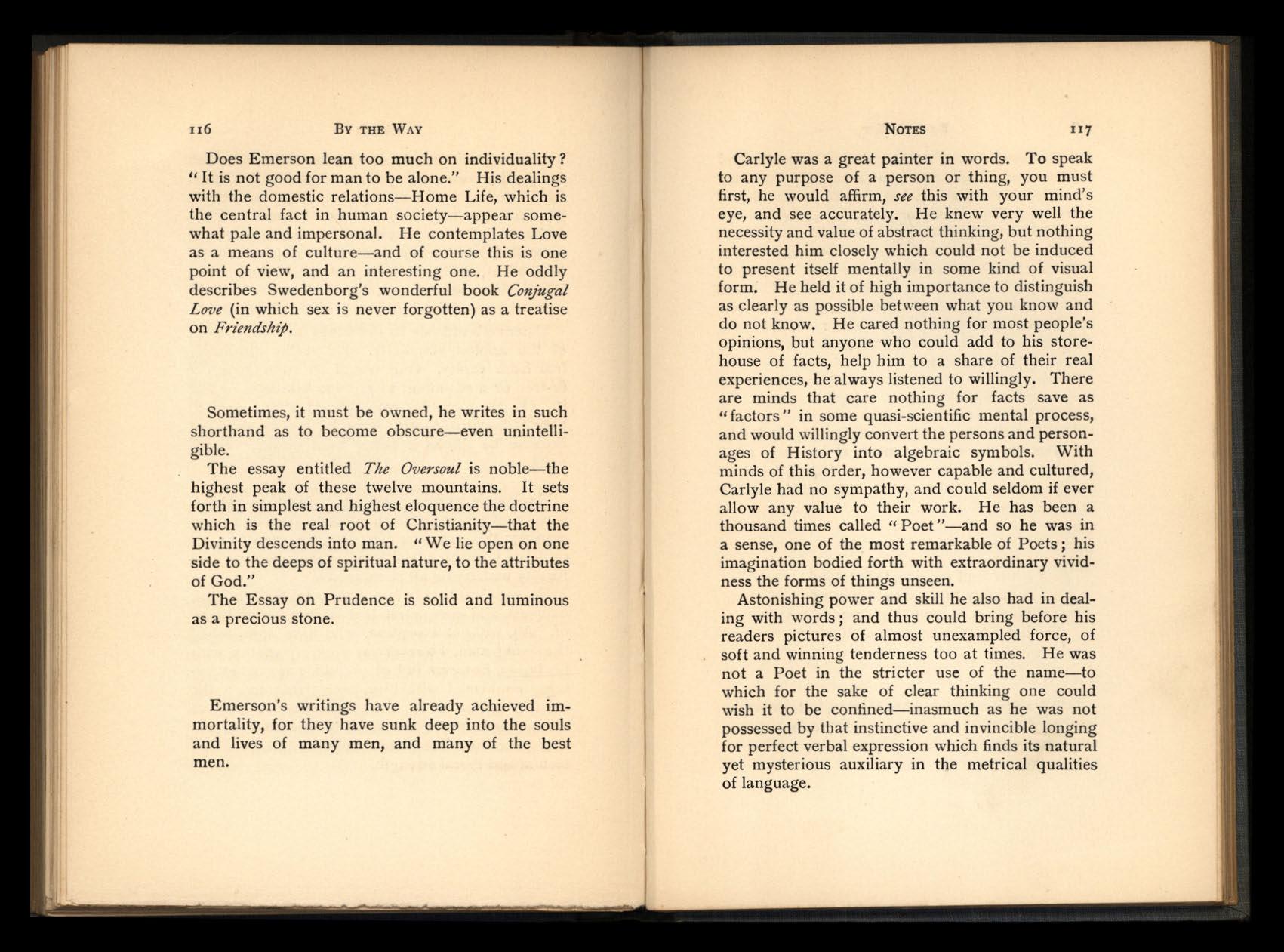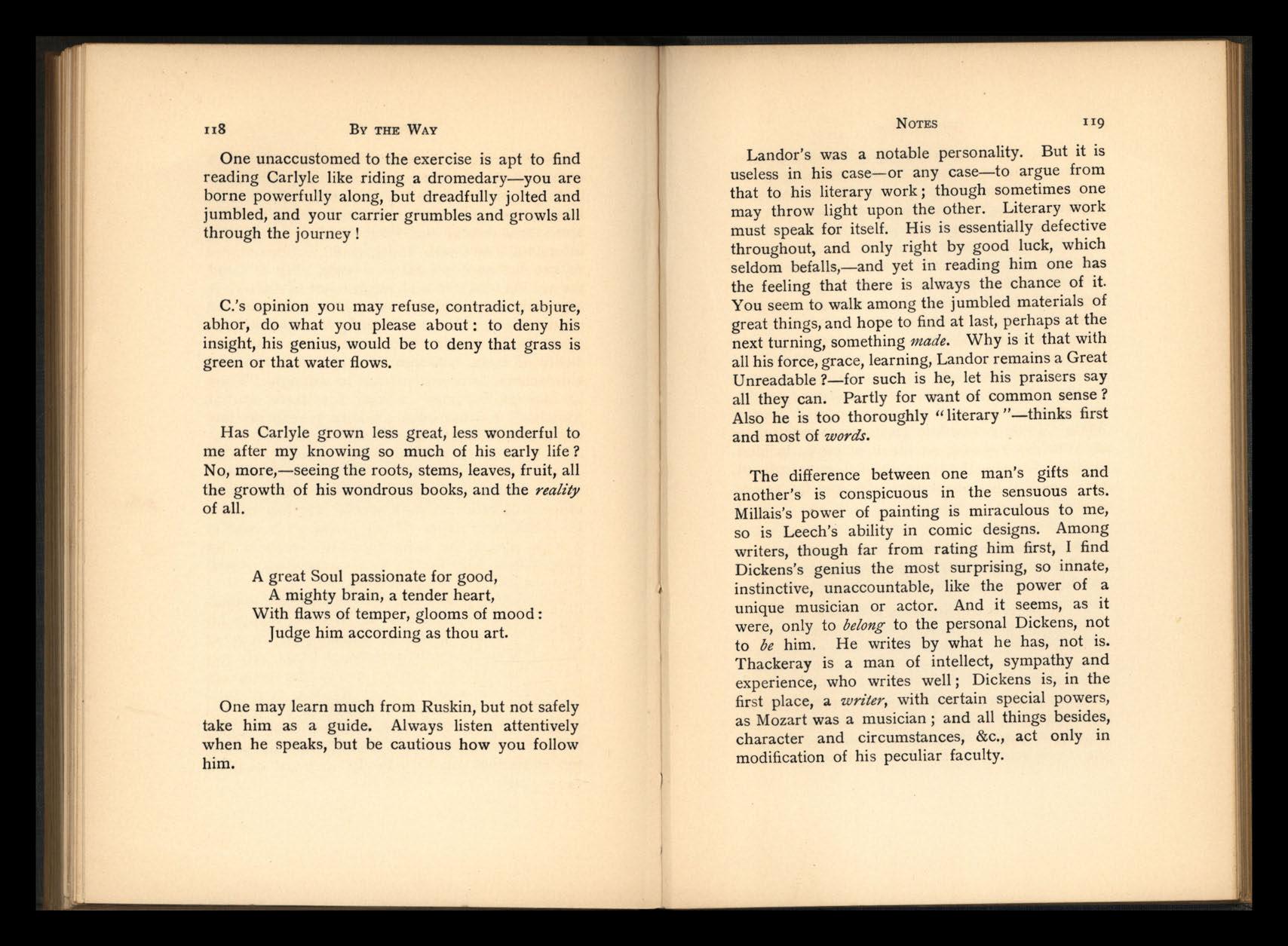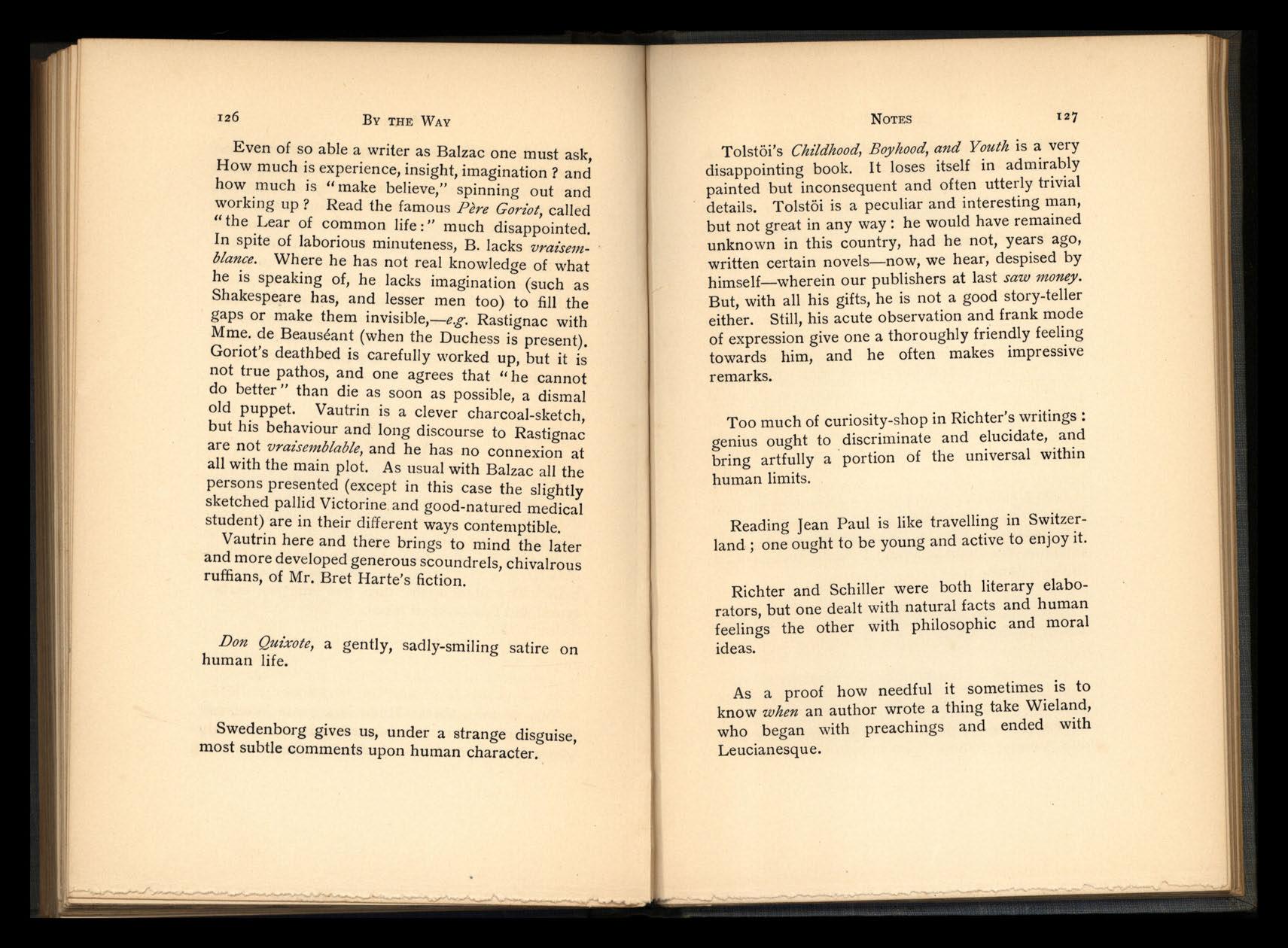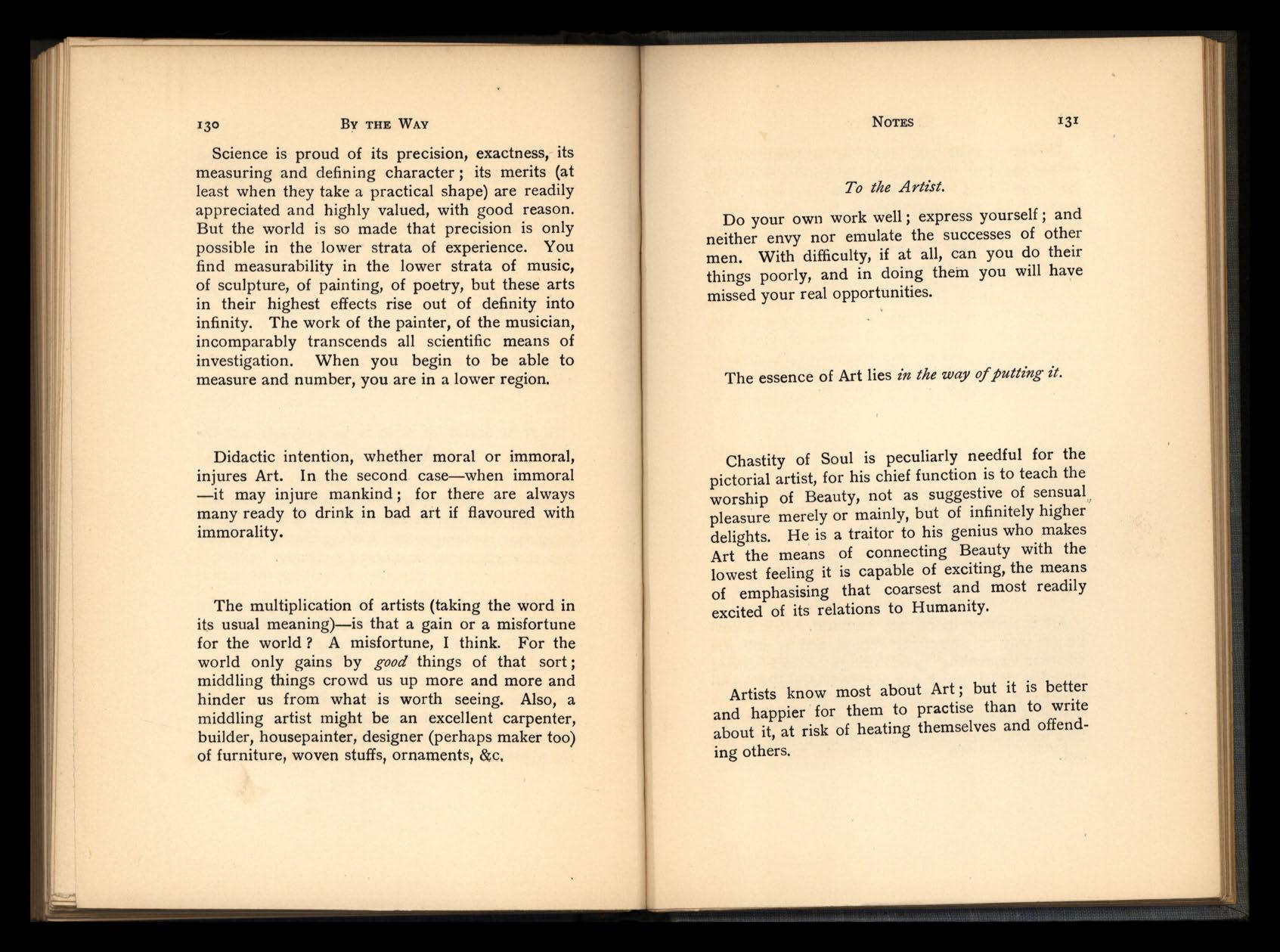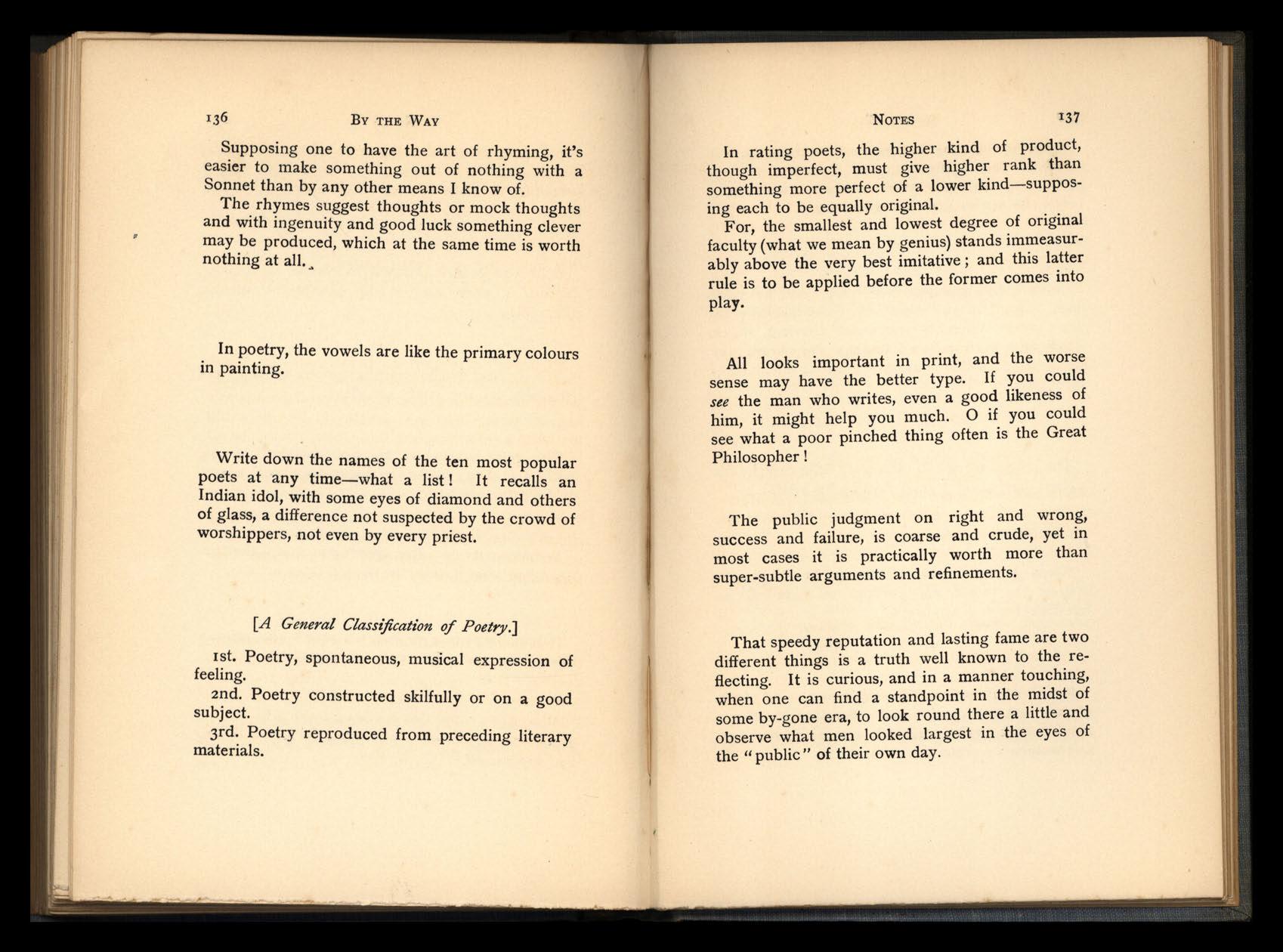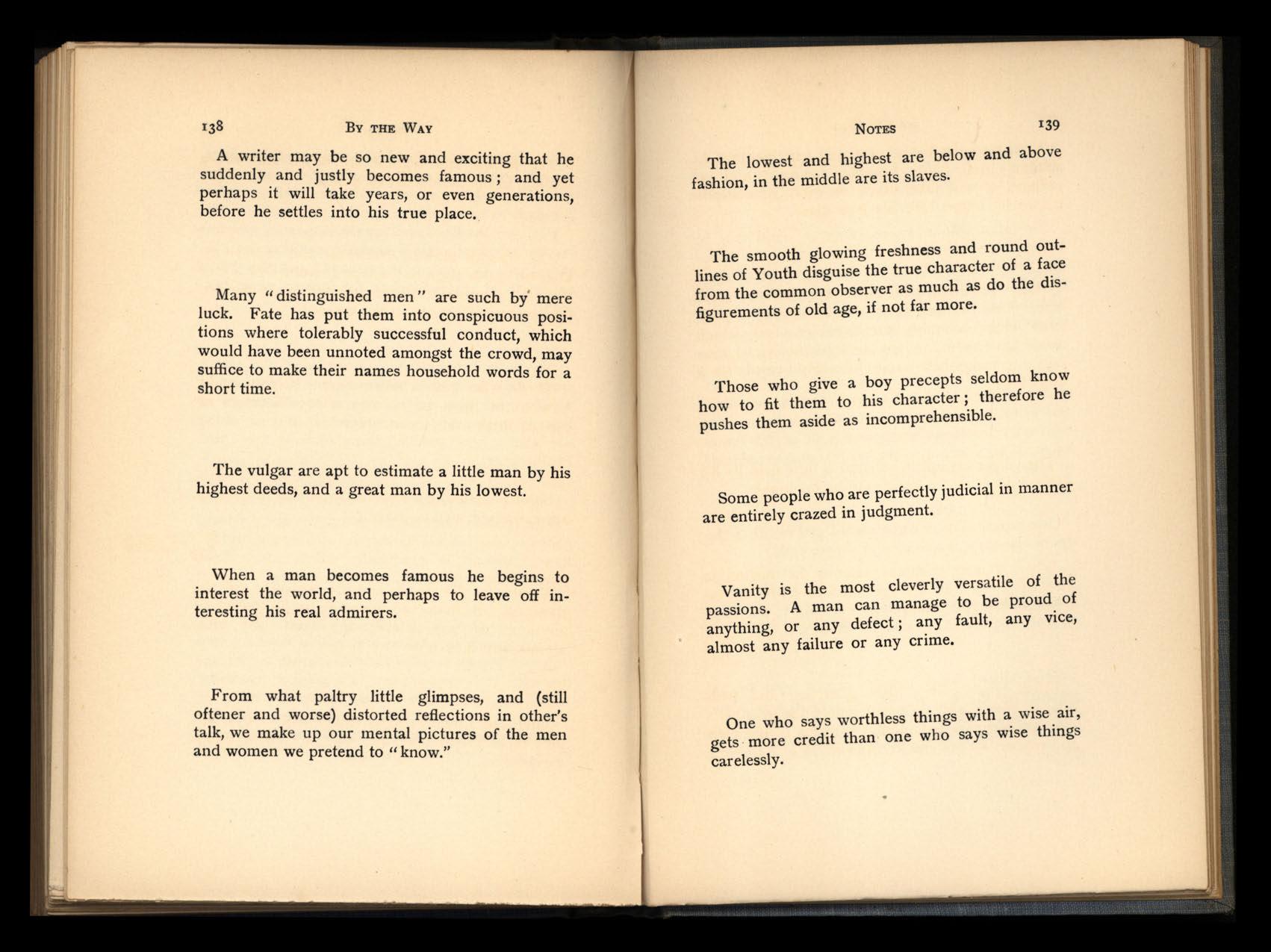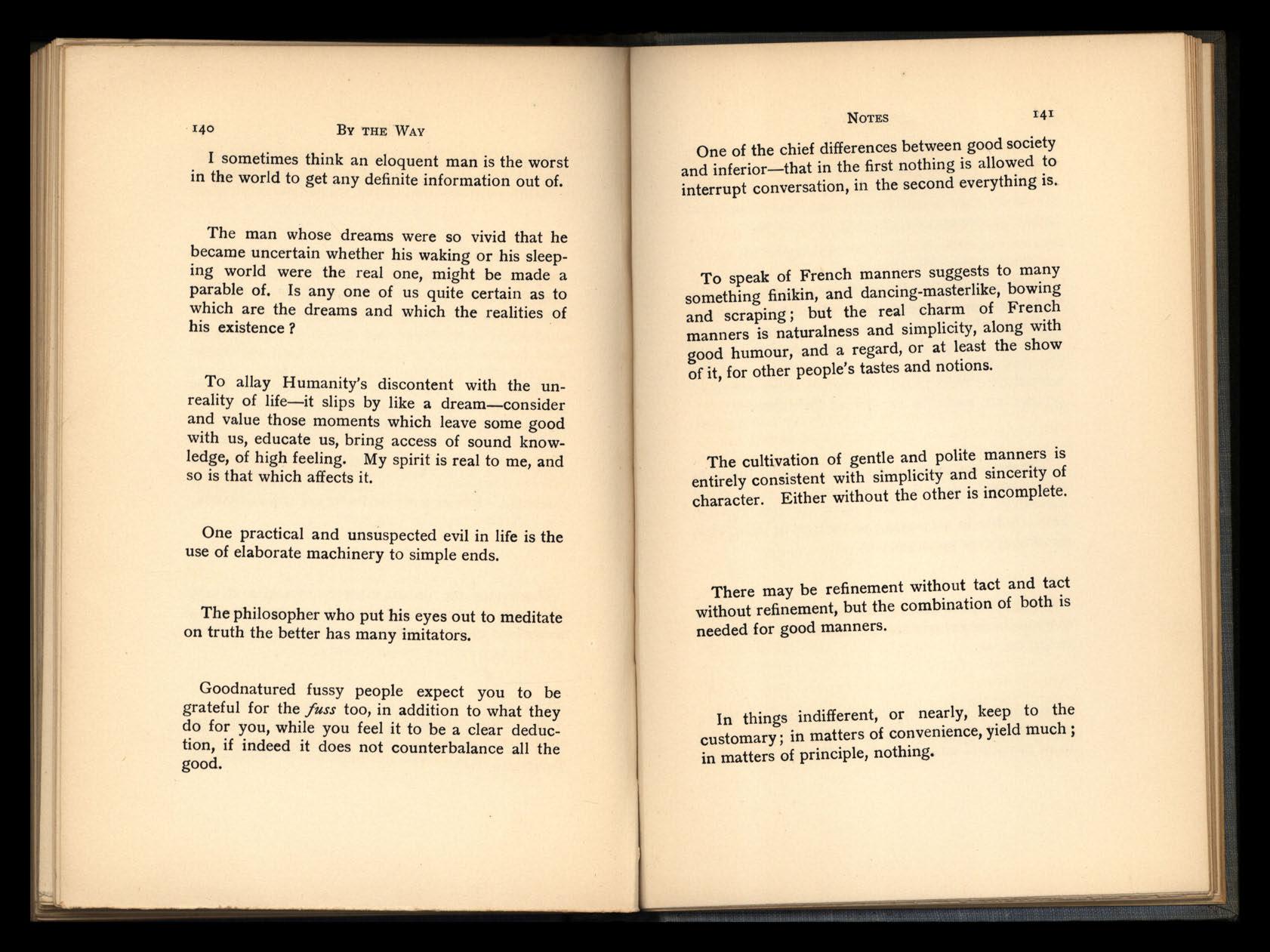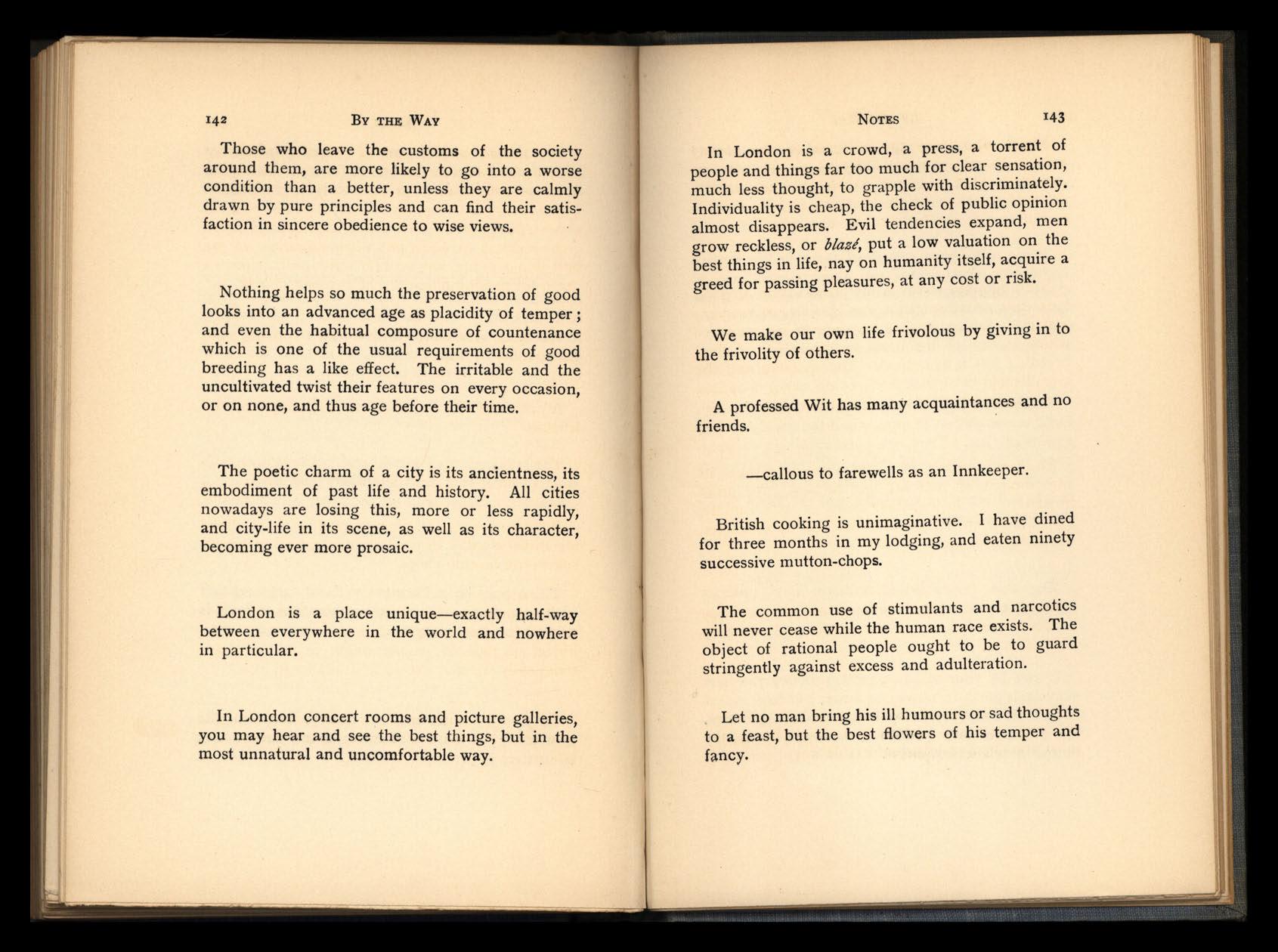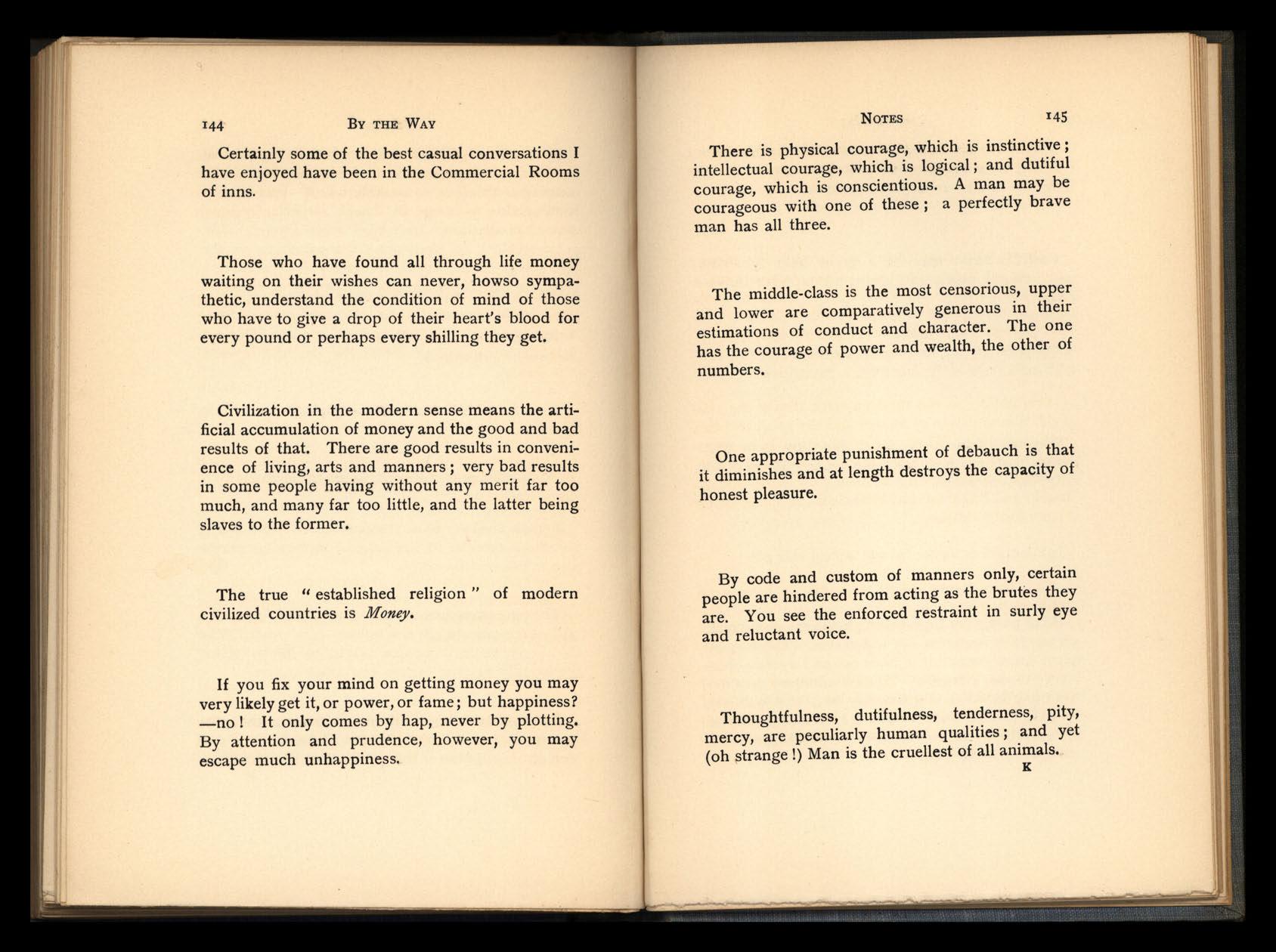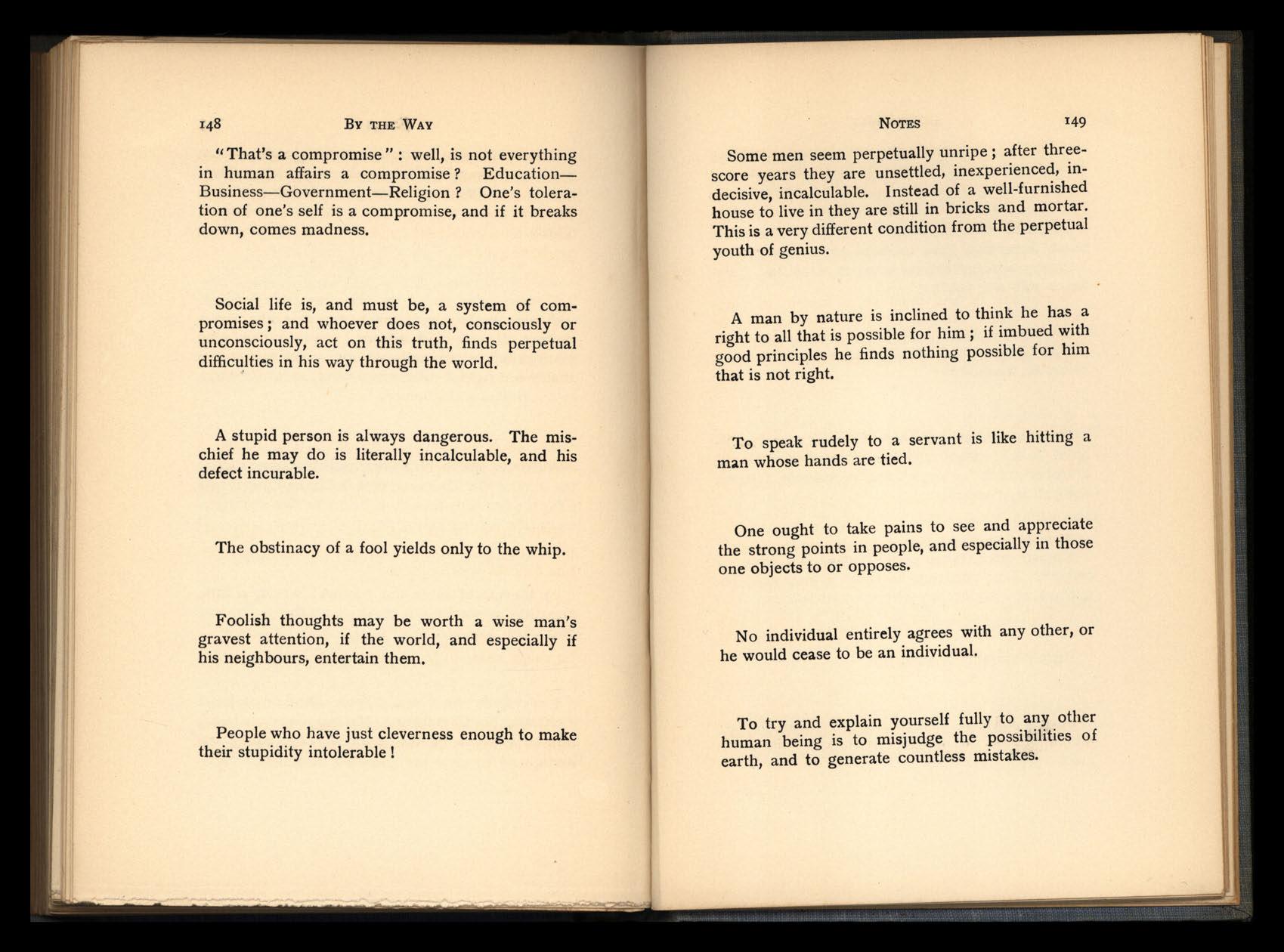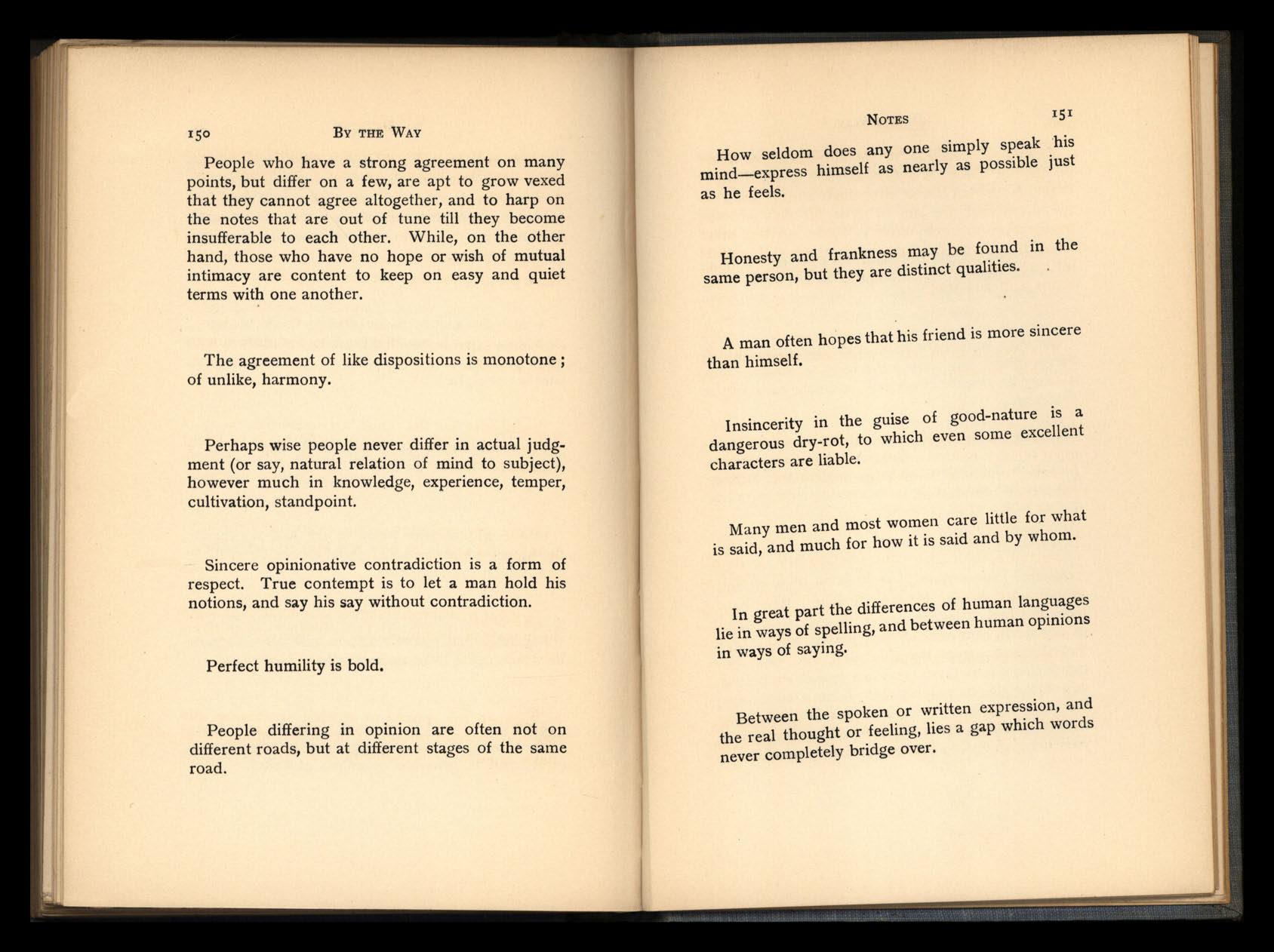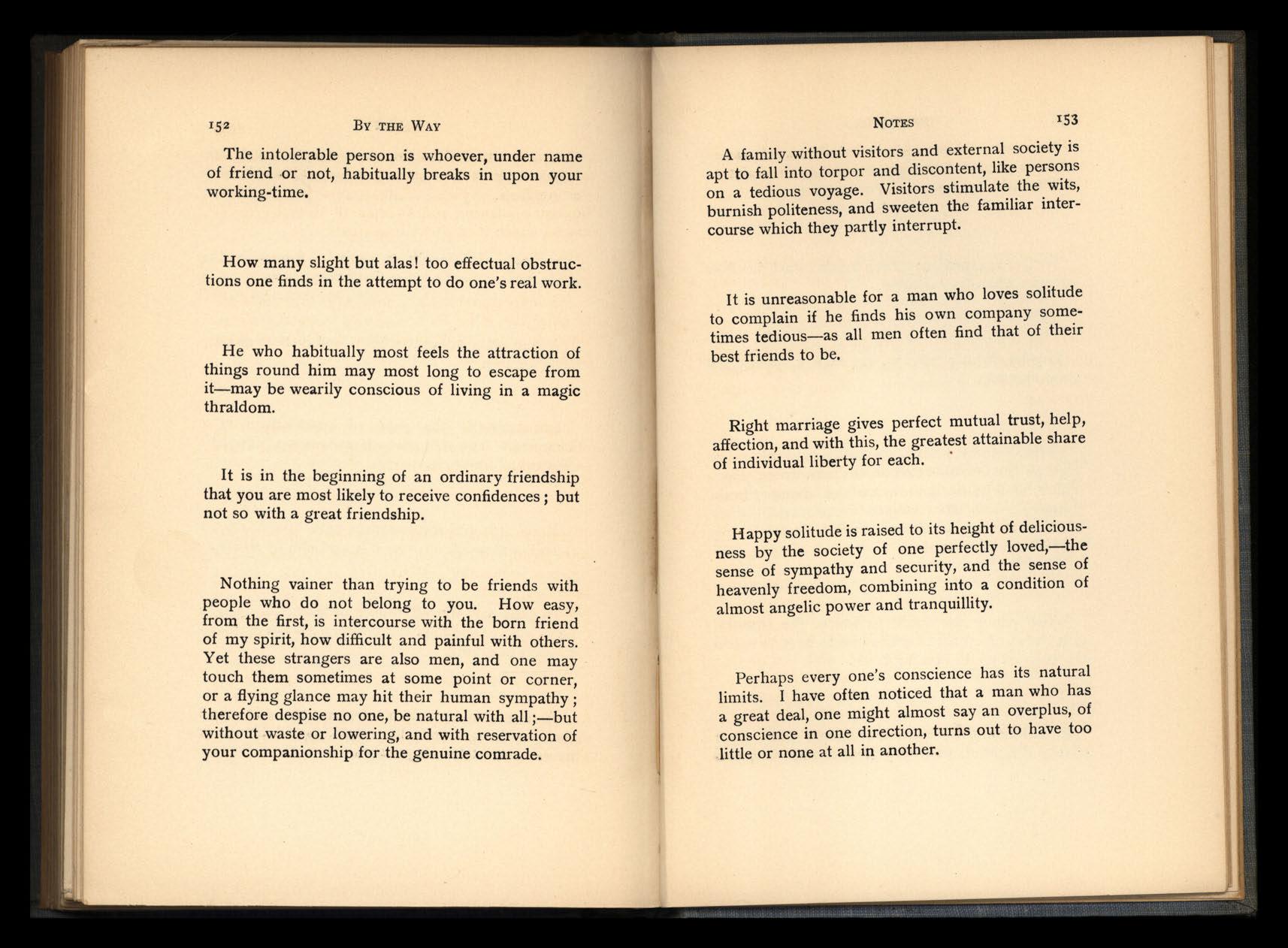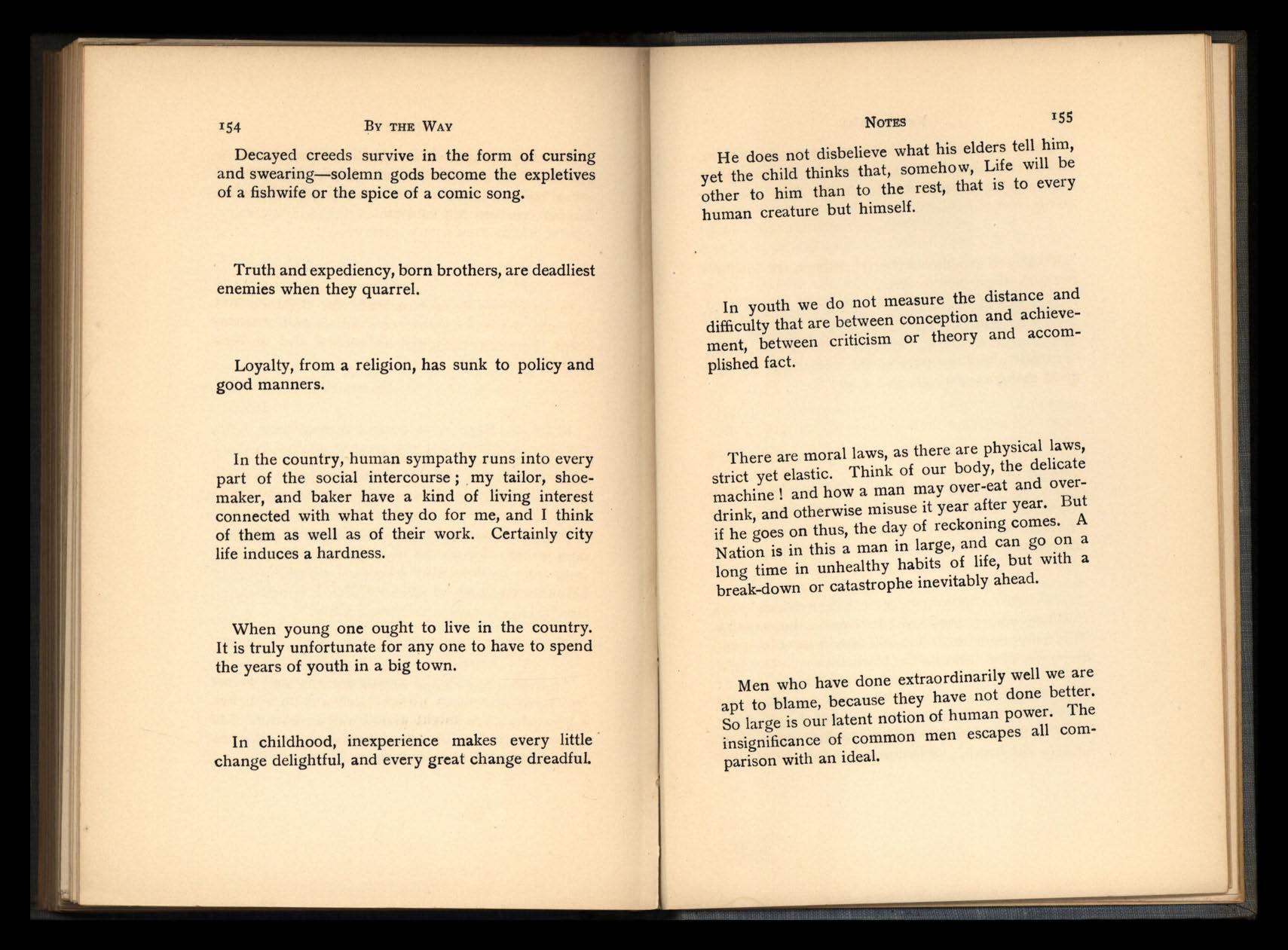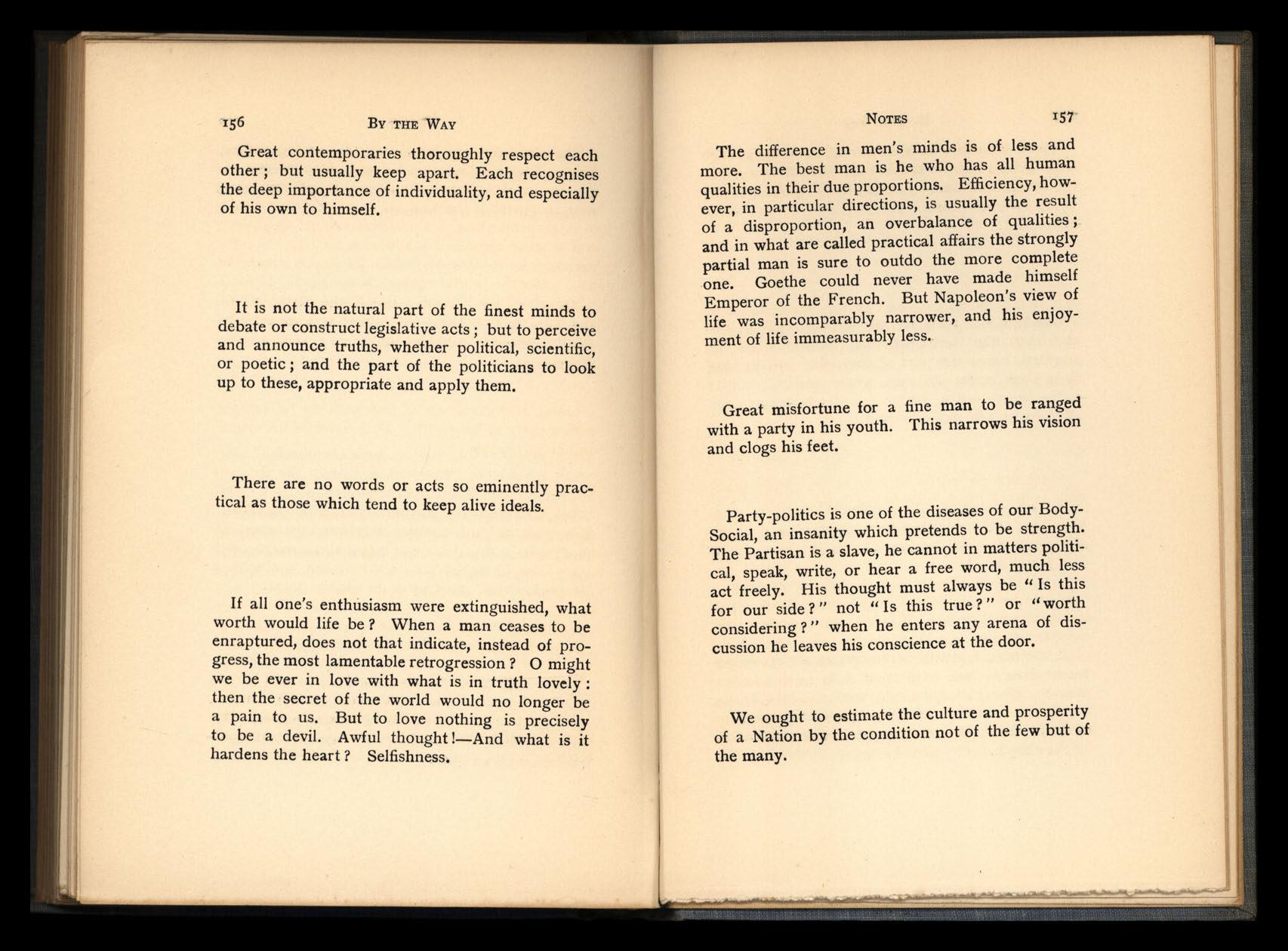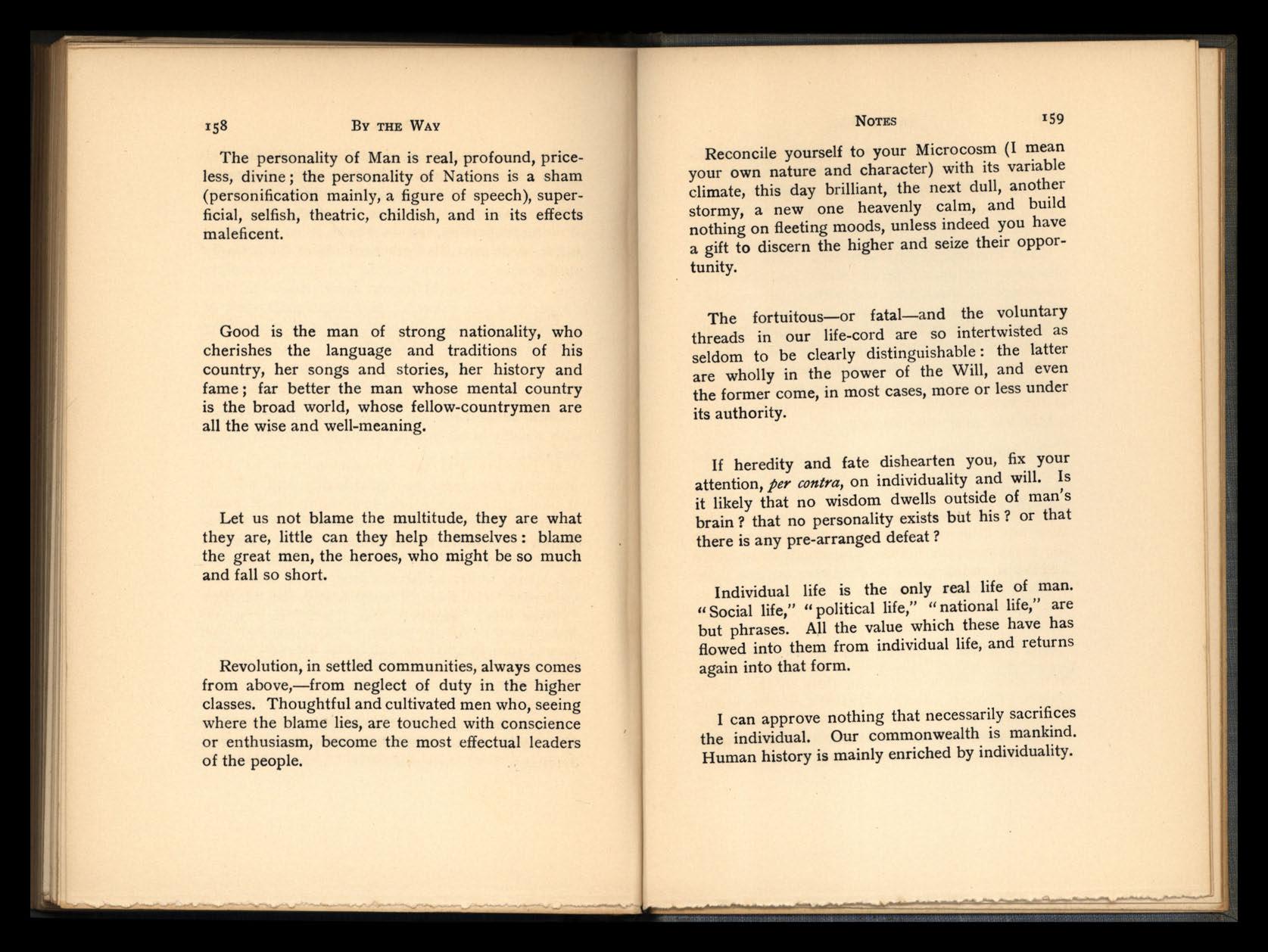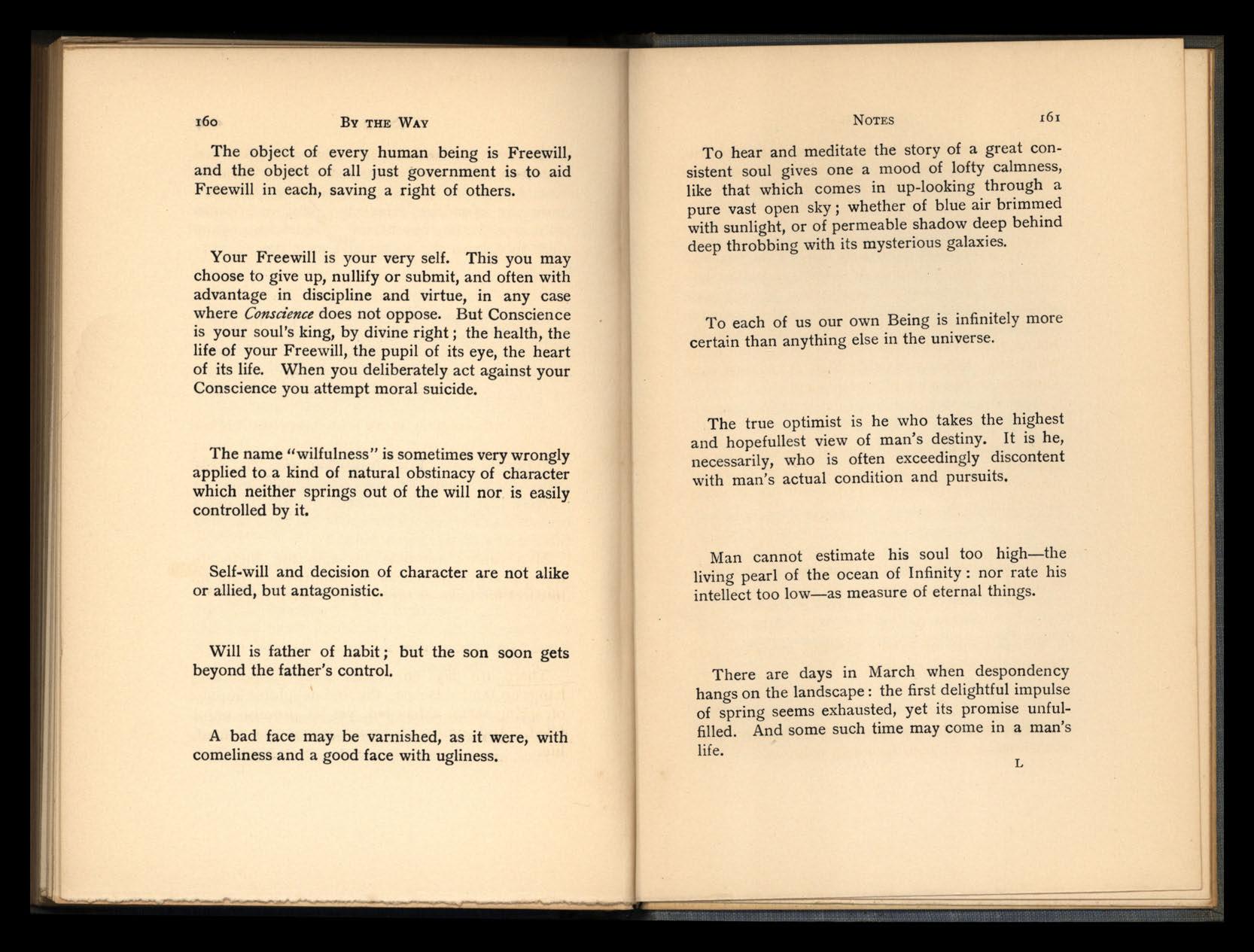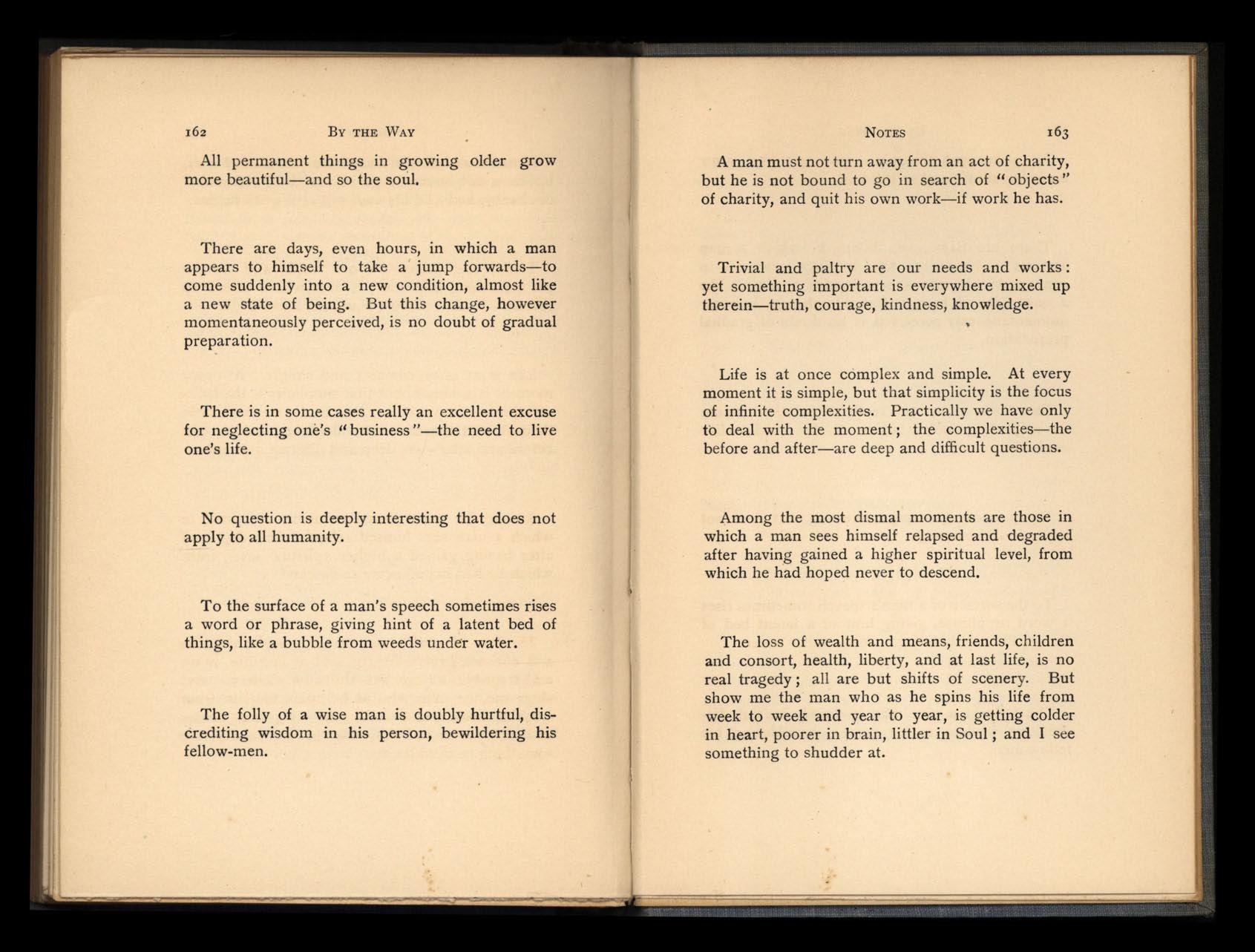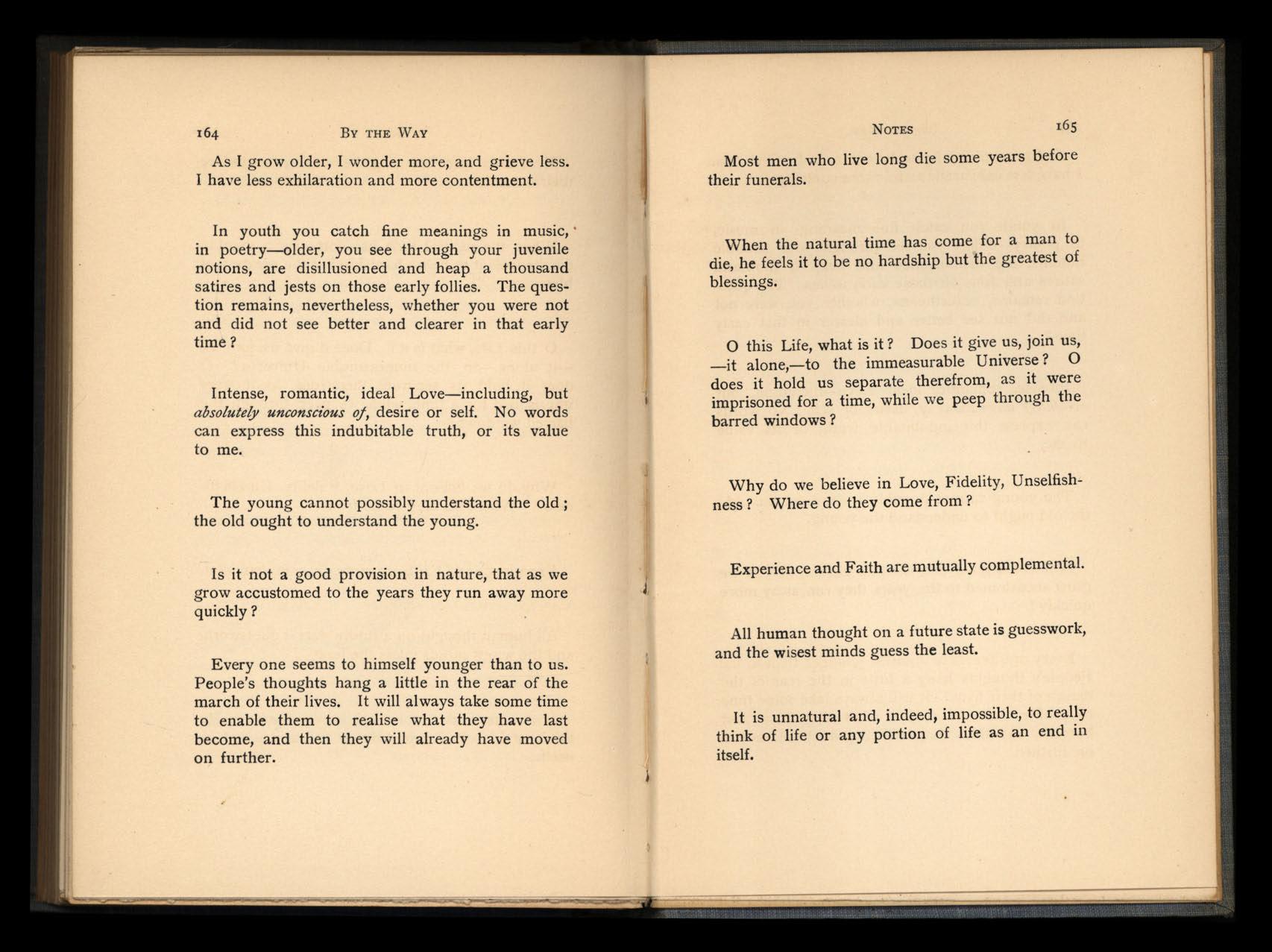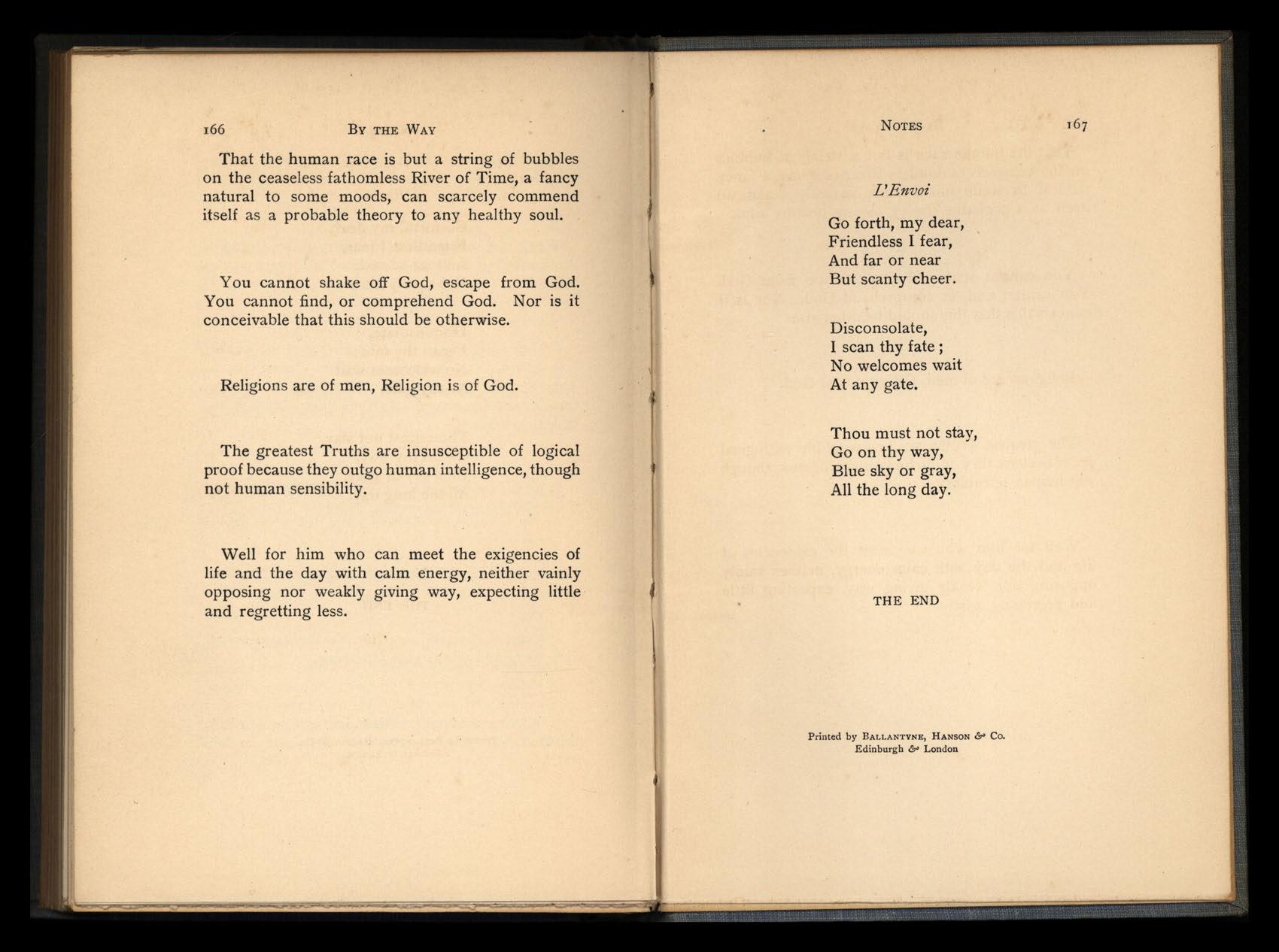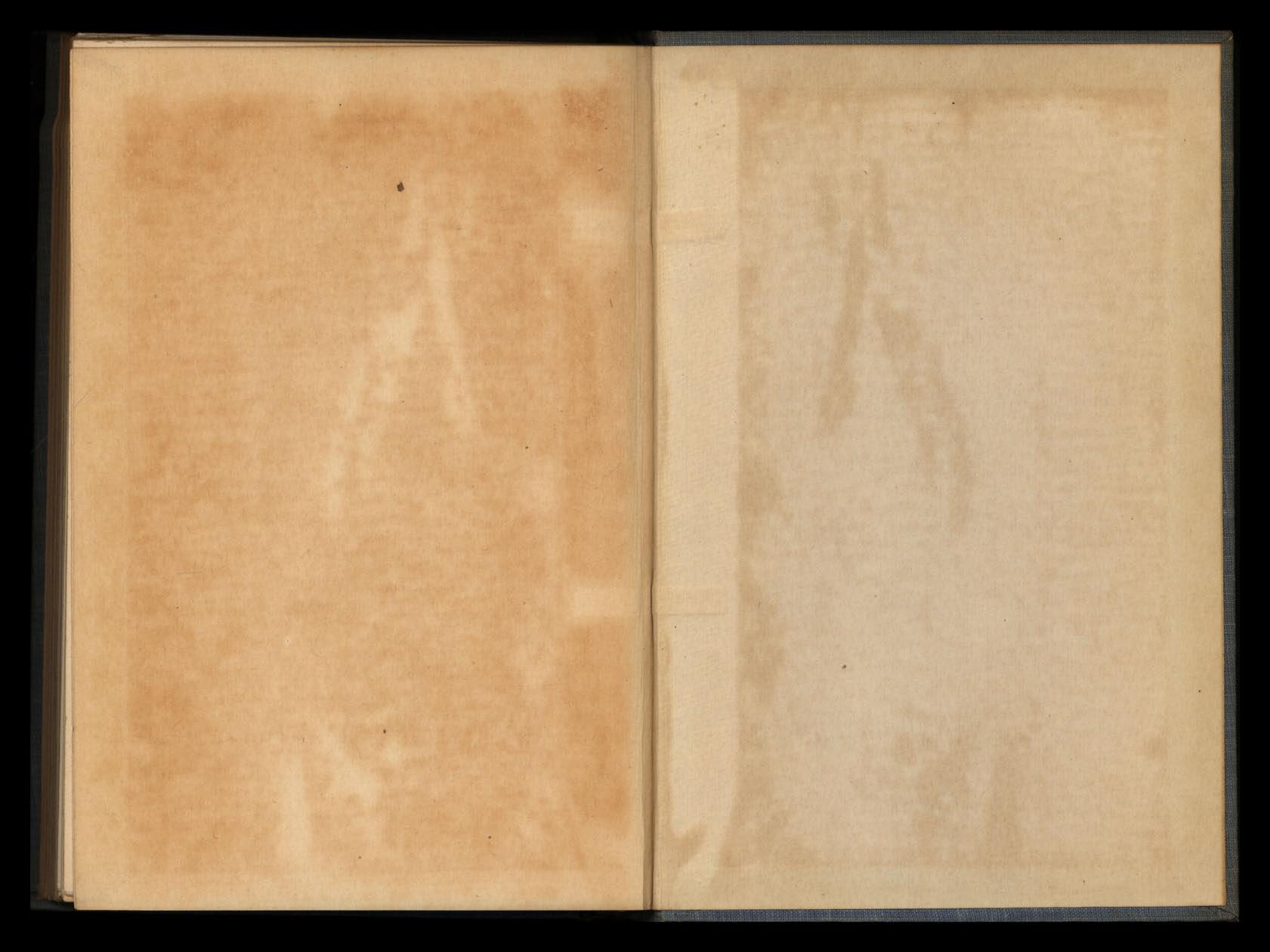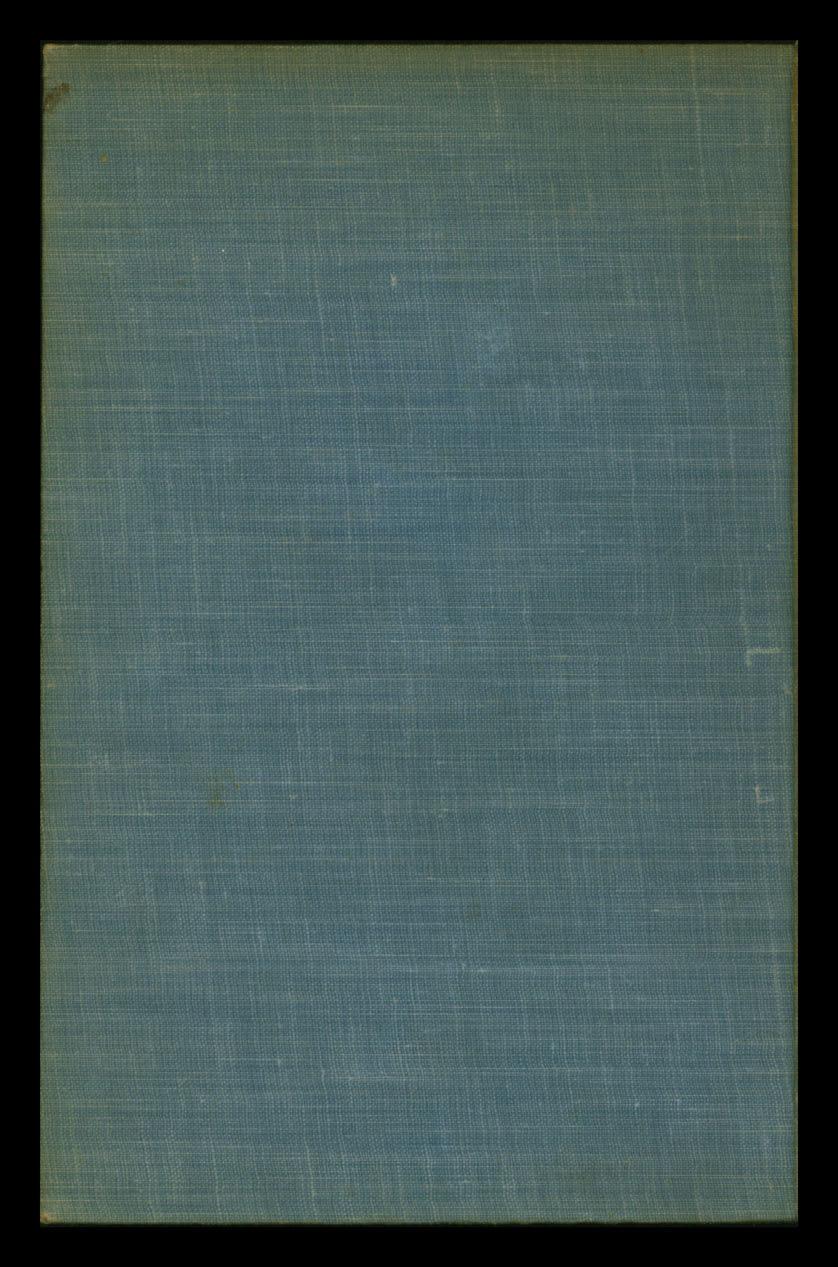VERSES THE HERMITAGE
Far from the city's smoke and stir
My quiet Hermitage is made, Where summer beech and winter fir Conjoin their hospitable shade.
The north-star crowns my wooded hill Of devious paths and thicket mild, And by my garden foot a rill Sings to itself, like happy child.
Childlike, I love that skylark's trills; This airy bloom along the hills
Enchants me; newly budding trees, The bright brook shivering in the breeze, The clumps of flow'rs, the wandering smells, And every voice that sinks or swells, And all the streaky blue above,
As many years ago, I love.
Thank Heav'n for this !-but "childlike," no !
Experience will not come and go.
3
Donegal County Library Service
TRIFLES
Slight are the colour'd threads that weave
The fabric of our days, But swiftly, and without retrieve,
Th'incessant shuttle plays, Each film is nothing as it goes, The web a glaring pattern shows.
An ill thought merely floating past, Oh whiff it quick away!
Once touching, it may hook you fast Till, like the spider's prey, You feel a poison in your blood
Corrupting all the vital flood.
To speak or write unholy things
Is true infernal work j
No man can tell what evil springs
From little seeds that lurk
In human hearts, at random sown j
A word's effect is never known.
VERSES TO-
Symbol and proof of everything
That Poets dream and try to sing, Perplex not with superfluous speech
This eloquence, beyond all reach Of tongue, that in thy being lives, Nor blurr'd with human language gives Its heavenly message: silent we
Accept it without words from thee.
In tears of blood, if such might be, I'd weep my soul's inconstancy, Remembering now to what pure heights
I have attain'd in happy flights,
Exalted moments, truer far
Than these low peeps and creeping are, Whereof the witness doth remain
To sting me with remorseful pain.
'Tis true we cannot keep the heights
Attain'd in these bold happy flights j Earth calls us yet, and there is found
A truth belonging to the ground.
Low men who live by labour of their hands
In virtuous patience and good cheer of heart, May simply apprehend immortal things j
So doth the flower of rich poetic souls.
But middle minds, presumptuous and confused
With false half-truth and ignorant knowingness, Will turn away from every highest thought.
ON A BLACKTHORN WALKING-STICK
Gt"ven to me at Bafh by W. S. Landor
This which was once a budding wand On hill-side or in shady glen, Where waters murmur'd, far from men, And fledgling thrush his lesson conn'd,
When cut and trimm'd, and coax'd to meet
The human grasp with easy crook,
In LANDOR'S fingers twirl'd and shook And bade his canine friend repeat
Gay barks and gambols; whilst in town
Or field the sagely happy man
Enjoy'd as only poets can His own wide thought o'er all things thrown,
Or teem'd the wealth of books and life
In frank discourse, where sudden jest Awoke the echo from her nest, And breathing images were rife.
But now to me the stick descends, Who love, at least, the wise and brave, And proudly feel the hand that gave Still clasp my slight hand as a friend' s.
January 18th, 1854.
VERSES A REGRET
Alas, he's gone, and never knew
My love for him, so kind, so true, He never heard in any word How d eeply oft my soul was stirr' d; My trivial glance left all untold; Why was I always dumb and cold?
Could he be with me now one day, One hour, how much there were to say!
I'd prove how I had met his thought, How tone and glance were unforgot, How brief 11 good-bye" was calmly said By one with heart brimful of tears.
I gave no sign through all the years, And now, my Friend is dead. Surely, if otherwhere we meet, As knowing these things we shall greet.
Have I cause to be afr aid?
I was mo st obscurely made In the s ecret core of thing s ;
A nd as a ro a ring cataract flings
Watery shapes to a ir, and sprin gs Into some black gulf below, My life is hurrying even so, I know not whither-D o I fear?
THE SOLITARY
"fis my fate t o walk alon e, Friends, companions, I have none. How befalls that thus I find it?
Can I be inhuman-minded?
Hate I any creature? No.
Do I long for love? I do.
Is it that I scorn the store I have, tho' others have no more, Longing after higher food?
This un restful mind or mood
Is it vanity or folly?
Is it bile and melancholy?
Or a ray of the Divine, Glimmer of the true soul-shine, Which pales the sunlight? This in me Find 1, whatso-e'er it be.
In evil forget not good, Colour not Life with thy mood; Think of old hours of bOding, Of terror and heart-corroding, The darkness, the lightning, the blast, And how they changed and pass'd And melted away altogether To sunshine and summer weather.
VERSES
Of strangely shifting elements
Our life is form'd, and life's events.
With habits pale we hedge it round, And fain would think it solid ground, But everything we strive to clutch, Melting to fog, eludes our touch; Till, sad and weary, vext and daunted, We take the flitting shows for granted.
I will not be a critic where I love.
Love must love or not love-
So long as he's my sweetheart I will love him. What care I what the world call this or that?
Have I such reason, that it cannot err,
Like God's? I am a poor weak human soul, And love or hate, I cannot tell you why-
Friends have I, real, or they seem so now, And while I'm in that notion I am theirs
Through good and evil- . , . "
If friendship, love, are nothmg, what s hfe worth.
Some may endure to play at chilly chess
With men and women-I must hate and love!
I never fancied I could lose Till knowing I had lost her.
Her own clear eye convey'd the news, And that is no impostor. It spoke to one, it spoke to two; Made him a king, left me to rue. Donegal County Library Service
By THE WAY
Tho' true love be far from common
Many men and every woman '
Can feel something fit to claim
Decently, affection's name' '
Will and Must and Has-B:en blent
Keep them, in a sort, content: '
The upon the cornfield shone, The evenmg star was mild and lone
And all the little birds were gone '
To nestle in the bushes.
The scented herbs had sweeter grown
The grass was all with dew-drops
And every breath of air had flown '
To whisper midst the rushes.
'Twas .then that by the old yew tree, We pIJghted vows to wedded be The good and ill of life to see '
And share with one another.
!he smelling like new-mown hay rh at MUl11chers put in their Wine of M ' they merrily welcome the lth and music, with dance and rhyme
(A festIval m ade to sweeten the year '
To hope.. and, after, to memory dear)
In the pmy valleys b eyond the pl ain
Whereto the city looks far and fain
1 Thro' many a sultry summer day.
.. Waldmei.rter" is used near Munich in making VERSES
Who that, even in a dream,
Has felt pure love's ethereal beam
Enkindle feelings for his heart
To treasure up and set apart,
Encasketted with jealous fear,
Most pure, most delicate, most dear,
More strictly kept than miser's pelf
And seldom conn'd ev'n by himself-
Would wish to have his hoarded thought
Into vulgar parley brought?
I can be haughty with my brother-kind, Walk on their courtesies like trivial flow'rs
strewn for a humble tribute: this is well :
But if they knew me as I know myself, The beggar's look who did not spit on me
Were grateful alms! Oh Gracious God in Heaven!
How can we show our faces to Thy sun?
Many things flash across the town-bred mind, They come and go, and leave small trace behind.
Few things, oft trudging through the country brain, Impress themselves in marks that long remain.
Folk, here, make much of trifles; there, make light
Of life's chief things. How few men judge aright!
By THE WAY LORD BLANK: A BIOGRAPHY
A Babe was born with silver spoon
Silver enough to make a moon! '
It did not interest him much
The world he came to, late Or soon.
This Babe was fed, this Babe was taught· He neither lack'd nor cared for aught. ' Nothing could interest him much Whatever youth or manhood brought. '
At school he learnt what others learn . With Alma Mater did sojourn, '
And, though not interested much Took" Little-go" and 11 Greats" in turn. '
He found a rich and handsome maid Of fitting years and proper grade; , She did not interest him much But in due form his court he paid. '
And in due course she was his dame And several children duly came; , They did not interest him much' His treatment of them none could blame.'
In House of Commons year by year He sat, on which side I'm not clear " (It did not interest him mdch) I he course of Nature made him Peer.
VERSES
A married lady whom he knew Was pretty and amusing too; She did not interest him muchYet by degrees a scandal grew.
The stupid husband made a rout, And fiercely called his Lordship out. This did not interest him much; But-killed he was a doubt.
His name is on the marble tomb, Age, style, et cetera: I presume They would not interest you much, And so, take up no further room.
I saw a man go by to-day; 0 when we were at school, They counted me a clever chap, and him a stupid fool.
Give each a bit of paper; I can write a song; but, zounds,
He, sir, can write a cheque on Coutts' for fifty thousand pounds.
He it all, I don't know how, whilst I was making rhyme;
But still, I pay my modest way, so call not that a crime.
Donegal County Library Service
By THE WAY IRISH ANNALS
( 18 52 )
MacMurlagh kill'd Flantagh, and Cormac killed Hugh,
Having else no particular business to do.
O'Toole killed O'Gorman, O'More killed O'Leary, Muldearg, ?f Phadrig, kill'd Con, son of Clearv.
rs m the reign of King Niall the Good d SIlver and honey and smoking red blood.
Satnt Col man converted a number of pagans
And g?t for his !riars some land of
The Kmg and hI s clans.men rejoiced at this teaching
And from theIr fighting to come to the preachmg.
Abbot of Gort, with good reason no doubt, WIth the Abbot of Ballinamallard fell out,
Set fire to the abbey-roof over his head
And kill'd a few score of his monks th: rest fled
The Danes, furious pirates by wate: and dry-land
Put boats on Lough Erne and took Devenish Island'
The Monks, being used to such things in a trice '
Snatc?ing relics and psalters and of price,
Got mto the Round-Tower and pull'd up the ladder;
Their end, for the D a ne s lit a fire, was the sadder.
Young Donnell slew Murlagh, then Rory slew DonnelI, T?en Connell slew Rory, then Dermod slew Connell.
o Lurcan of Cashel kill'd Phelim his cousin '
Of this Tribe, in consequence, killed one another. MacFogarty put out the eyes of his brother
James Longthair, lest James should be chosen for chief.
At Candlemas, fruit-trees this year were in leaf.
King Toole, an excitable man in his cups, Falls out with King Rorke about two deerhound pups,
And scouring the North, without risking a battle, Burns down all the hou ses, drives off all the cattle;
King Rorke to invade th e South country arouses,
Drive s off all the cattle, burns down all the houses.
If you wish for m o re slaug hter and crimes and disasters
See, passz"m, tho se Annalist s called 1/ the Four Maste rs." 1
The Whiting Society passes its t ime
In guessing at certain conundrums in rhyme,
The Author of which, still brisk and vivacious, Just lives round the corner: 1/ Consult him? Good gracious!
Was ever proposal so wild, so audacious!"
_" You know him and ch at with him "_Cl True: but, my fri end,
If he tells us his m eanin g our game 's at an end."
lOn e of th e O'Clearys becam e the principal compiler of tha t famous Chronicle of Ireland upon which the name of A n nals of the Fo u r M asters h as been accide ntally and not very happily fastened, but really called A ntta la R ioghachta E irca' tn , "Antta ls of the Kingdom of E rin . " ,
On family matters. Some two or three dozen VERS E S 15
County Library Service
WRECK OF THE /I HENRIETTA CHARLOTTE"
Wrack versus Wreck
(Circa 1858)
The wreck directly reached the rock And wronged the Rector's wrack, The Rector rushed to wreak the wrongs Of wrack upon the wreck: Can rectitude direct the Rector, Recklessly to wreak Upon the wretched wreck, the wrongs Of Rector' s wracky rock?
1 These lines were written on the loss of a trading vessel at Bally· shannon Bar, wreck ed on a portion of the shore over which the Rector claimed the rights of sea·we ed : he sued the owner of the unfortunate vessel for damages-without success.
FRAGMEN'TS
-when February studs The naked larch with million buds-
Snowdrops, the tender infants of the year-
As, upon a day of March, When blue glory fills the arch Of ether, and the wave is bright And the mountains robed in light, Hours are lovely beyond measure, Tranquil souls have perfect pleasur e ; Yet, bethink you, hedge and t r ee Stand as bare as bare can b e, ' Or but faintly hint the time, Hastening on, of leafy prime-
The throstle singing in the leafless woods; The alder-catkins, and the willow-buds That change from silver into paly gold-
The moist aerial veil was softly drawn O'er mountain peak, smooth hill, and verdant lawn.
'7 B '
Donegal County Library Service
By THE WAY
-sown with wood-anemones
Thick as a frosty night with stars-
Listless I wander'd down the wood arcades
Mid slender stems and sprouting leaflets green,
With primrose tufts and mingling violet, Wild orchis and the wood-anemone
Around my feet; the wafting western air
As sweet as tho' it blew from Childhood's Land.
-like wood-anemones
Changing in an April breeze,
Sheets of snow or purple pale
As the breath may blow or fail-.
Or paint th' unutterably tender blue
Of April skies-
To-night, returning in my walk, I saw
The soft and lingering lines of sunset cloud,
The stars around the crescent moon; far west
Shone Venus, ere she went below the ridge.
Jove's planet lighted up north-eastern heaven
Hung 'neath the Twins, and thence with easy slant
I found Orion.
-a vernal day
Of sleet and sunshine, summer patch'd with winter.
As tufts of sweet lilac
Pale-purple or milky
In freshest green leafage
Delight u s in May -
FRAGMENTS
Flow'rs on the threshold of sweet May-morning, Dead leaves drifted when summer's gone-
Blue mists of hyacinth in forest glades-
Ere from the apple-blossom fell
One dainty white or crimson shell,
Or its green boss began to swell-
And children at play in the shadowy grass
Of the pink-blossomed orchard.
(Beech)-The tender green that floats below
While upper boughs are bare-
-fresh as a green beech
Now in the young perfection of its leaves-
When ferns unroll their croziers into plumes-
Tender leaves like baby fingers
Feeling for the vernal air-
To see among those gay green clouds
Of foliage in the vernal woods
The hawthorn shining-
A cataract of snowy blossom!
The pearl'd thorn opes its fragrant flow'rs, Whitening the hedge-
Donegal County Library Service
20 By THE WAY
- a secret little bower
Of twisted stalks and happy leaves-
Ivory lilies, tongued with gold-
-where the June sun weaves Green light, green shade, in a curtain of leaves.
The lush green tangle of a leafy hedge, Bindweed and briony and honeysuckle
Twisted luxuriantly, large pure white bells, Green berries, fragrant floating coronets, Ivory and amber- .
The forest leaves in plea sant idleness Are fing e rin g the cool air-
The green twigs whisper gaily, and the barren branches croak-
The forest cloisters, where the morning dew Lies till the evening-
Root-netted paths and intricate wild ways
Through the dark forest -
Creaking boughs and hurtling leaves When the wind through woodland grieves.
-a bank of cloud
Sweeping in one great whirl from west to east.
FRAGMENTS
Like torn white lace the windy cloud Lay scattered in the blue-
Fresh gold that veins the morning cloud-
Heaven's chalice over-brimm'd with sunny light-
In the blue sea of Heaven behold .
Floating islands fring'd with gold-
White clouds that . wander through airy deserts yonder,
Bound to far-off regions of blessedness and calm-
-a windy day
Of cloudy lights and flying shadows
Over the forests and moors and meadows-kindly rains
Clothe the poor naked earth in mantling green.
The sky is dark-no matter; The west wind blows no ill ; This pleasant rain wiII scatter
New green on every hill.
-a huge soft curd-white rain-cloud
Mounded and moulded by the busy winds-
County Library Service
By THE WAY
. -above a streak of angry light
The mk-blue storm weigh'd down upon the hills.
Tower upon tower of dark embattled cloud-
Tumultuous silence of the stormy clouds-
Behind the murky curtain of the rain
Were pale expanses, gleaming wilds of sky-
Oceans of thunder breaking overhead-
-like lit clouds when a flash
Rends the black storm, and shows the frighten'd faces
Waiting for thunder-
-a thunderbolt
Treads swift its zigzag pathway down the clouds. -mount
The lightning's zigzag path to heaven.
-as dull clouds
Muffle the thunder upon mountain-tops.
The gale's fantastic symphonies,
The gestures of the raving trees,
The driving clouds, the snowy wold,
The ruffled waters dark and cold-
FR AGM ENTS
Behind the stormy precipice of cloud
A pure serene illimitable sky-
Measureless altitudes of bright white c1ouds-
On the great mountain-altar now
The sun burn'd like a sacrifice; Next moment he had sunk below, And in the lucid golden skies
A star appeared, and many a star, In purpling ether faint and far,
Until the mystic rule of Night Was paramount.
And when the day had dropt away
Behind the western hills-
Through a red portal in the jagged clouds
The sun looks fierce in parting-
Evening gold leaking through cloudy chinks-
A cleft of scarlet fire in misty clouds-
-palace of sunset, with vaporous walls, Descend into the sea.
The red of sunset lik e a murder-stainDonegal County Library Service
Bv THE WAY
-sunset's fiery realm
Of vaporous continents with peak and crag And unsubstantial headlands built of gold, Which soon the dusky twilight doth enfold.
The tranquil flame of iridescent skies
With level woof of scarlet, tender green
Over the dark-blue mountain's edge; aloft, Purple awaking into starlight-
And from a northern coast the Lovers watch'd
Midsummer sunset crimsoning the sea,
A bath of colours 'twixt the sky and sand
From east to furthest west. The ripple broke Like azure flame along the level shore, And every dimple, every ridge that nets
The glassy film was variably dyed
With floating brilliance of prismatic hues, Green, orange, golden, exquisitely gay, Like d elicate music. Ever in the north
The duskin g splendour crept behind the hills
Eastwards, and one cloud waited for the Dawn
To drink its fill of glory. To the beach, Meanwhile, ran wave on wave in lovely sport, Whispering a message to the dewy fields
Far-spread and hush'd beneath a dark-blue dome.
The night a spongy dimne ss fill'd with moonshine, Gray river-course, black boats based on their shadows,
The river, misty trees, the night, the world-
FRAGMENTS
A sudden meteor in the zenith flew, As though great Night gave signal for some wonder;
Then all was still and motionless, no sound, No stir in starry heav'n or dark earth under.
See in that clump of trees the starry Bull Hangs clear like diamond fruit, and down the sky
How steel-blue Sirius sparkles-
I saw Night's dome alive with meteors, Shooting and sailing, melting one and all
To darkness and dim starlight-
When night has settled on the vale below, Faint scarlet dyes the lonely peaks of snow
From a lost sunset-
Black texture of the leafy trees, engraved
On the clear, solemn, pearly blue of dawn; No bird as yet awake, no star asleep, Though some look drowsy.
Ocean lies tranquil in the arms of night, Uncurtain'd by Dawn's airy heralds; far
On every hand, up to the mountain mist, Fields, hills, and cots, and every forest brake
Slumber in dew.
The shore-less ocean overhead, Star-islanded-
By THE WAY
Night stole her fingers over the instrument
With preludes scarcely heard, emboldened soon
And swelling to a hymn of solemn joy
To which the stars came forth, and all the space
From earth to heaven was full of adoration.
Hear through foliage of the darken'd vale
Bubbling music of a nightingale,
Throb and thrill and mingle with the stars
Till they seem to tingle and grow pale.
-small starry points
Glitter/d aloft in the pale violet heaven-
In orient sky a solemn fleet of stars
Sail'd upwards to the zenith, and pursued
The shadowy voyage of the sinking moon,
Till Night's fourth hour engulfed them in the west.
From those vast whirling Worlds, no sigh or sound
Pierces the petty turmoil of our life-
The night was a shroud,
Made all of one cloud,
To wrap the dead earth-
-all the gray and misty night
Fill'd like a sponge with pallid light
Of the unseen moon-
-a warder Star came forth
Upon the mountain's windy battlement,
And gazed into the night-
FRAGMENTS
At kissing of the Twilight and the Dawn
In a June midnight-
-a calm clear moon
Over the ruins of tempestuous sunset-
A storm-cloud menaces the silver moon
With dusk gigantic arms-
-as Luna's pearly ship
Sails the black midnight gulfs from cloud to cloud-
The great moon roll'd her globe of gold
Above the dark world's edge-
The moon a silver fish in cloudy net-
So the grave moon, clad in white,
From the cloister of a cloud
Emerging softly into light
Walketh through the wastes of night, Too unrivall'd to be proud.
Up the shining disc of the full moon
Creeps the shadow of the greater orb
Which controls her-
-the moon
Spills a faint golden lustre in the tide-
The mighty flood that curtseys to the moon-
Donegal County Library Service
By THE WAY
See how the Witch Moon from a cave of cloud Scatters her spells upon the sleeping Earth-
0, well-h.ead and deep of silver light ° erflowlOg mIstily this dreaming world!
A tender moonshine in a marbled sky-
And where the moon in the eddy plays
Like a fiery snake-
I saw, with blunted cusps, the waning moon' Her slender golden crescent stood embost ' On a green morning sky-
A black cloud flying like a monstrous bat Across the moon-
-a waning moon, Sharp as a lancet, pierced the level cloud And spread a floating glimmer on the stream-
The moon's reflection like a fish of gold Swam in the current-
The embers of the moon slumber in sunlight-
FRAGMENTS
-see the mountains dyed With the deep blueness of a mussel-shell-
As, when the sun is shining on the fields, The swarthy mountain sulks beneath a cloud Foreshadowing tempest-
The mountains fleeced with vapours-
The huge black mountain smear'd with ghastly white.
The black mountains vein'd with snow-
Fresh verdure streaming up the rifted crag
Whose head is in the lower waifs of cloud-
And like a solid vapour, motionless
A gray-blue mountain on the horizon stood-
-the rich mountain, like a carven vase Of ancient malachite, imperial gift, With clear green slopes and shady tortuous glens-
A mountain full of lights and shades
As purple velvet flung in folds-
As a great mountain stands against the sun
With robes of shadow sweeping to the vale-
Battalions of dark pine
Ranged on the windy hills-
30 By THE WAY
-the dawn's green fold, Bepatch'd with gorse's honey-gold
And harebell-sprinkled. Thence long shadows
Creep at evening over the meadows.
Shut round with trees, but over these And far beyond the dell,
A mountain chain that like a strain Of music rose and fell.
The waves of budding barley silvery green, Like waters rippling under cloudy sky-
Broad green pastures where doth pass
A little river clear as glass
That wimples through its waving weeds-
The glassy brook runs shivering in the breeze-
Where, seldom by an ear surprised, The little stream soliloquised,
In songs and murmurs of delight, Heard clearest of a starry night, Amid the hush of all the hills.
-branches green
Across the road to kiss each other lean.
Where overhead the branches meet
And grass is cool to weary feet-
Or the warm wind wandering over Fields of grass and purple clover-
FRAGMENTS
Over the level field of ripening corn
A vision of blue hiIIs-
-between their stems the peeping lake
Like a blue flower-
Across the breathless mirror of the lake
The wild-duck drew a long dividing wake, Blurr'd for an instant the reflected shore, Then heath and rock lay pictured as before.
3 1
Under boughs that wash the stream,
Kingfisher darts, an azure gleam-
-from the blue mid mo st of the lough
With neck outstretch'd the startled widgeon skims, And for a moment rips the quiet flood
Entering her reedy chamber-
-flying remote
Through pure and lofty spaces of the air-
The sky lark hearted in a golden cloud
Shoots rays of music down, brighter than light-
-the lark spills through the sky
His rapturous unintelligible ode-
-larks high in air
Sing to the sower in brown fields below-
Donegal County Library Service
3 2 By THE WAY
The singing mountaineer of lofty clouds, The lark-
When the lark shuts her wings and drops Right down like arrowhead, then slopes To her small home amid the grass-
Hear the winnowing white doves' wings, And see their shadows crossing-
-the nightingale's
First tremulous twittering on cold April eves.
-the love-intoxicated nightingale
Piping and gurgling his luxurious chant-
Softly from wooded hills remote
Comes the cuckoo's double note.
-from high to low
Like air-borne swallows in their facile sweep-
With delighted fancy follow
View less weavings of the swallow,
To and fro on golden air
Darting like a shuttle there-
As air-borne seagull sweeps the line of cliff
On sliding pinions-
-one hern
Gray sentry of the wide morass.
FRAGMENTS
-the rook-army wavers home
Black on the sunset sky-
'Twas like the whirr of winglets
When sparrows rise from grain-
-little birds
Bustling and bickering through the bushes.
-a hawk
Balancing on the wind-
The wise muffled owl-
The proud eagle's royal melancholy-
-that winded far to Echo's call
And won a faint reply-
-to see rise
A vernal birch, green-fountain wise
With myriad sprinkling leaflets light, Against a sky of blue and white-
Gay as a glittering birch-tree after rain-
-aged oak
Grappling the soil with monstrous claws-
Under the shelter of a sturdy oak
I heard the rain upon its roof of leaves
Beating like elfin hammers-
34 By THE WAY
A huge old oak with gray and rocky trunk-
-a wizard oak
With branches fiercely scribbled on the sky.
A massy monumental puplar tree, Its head among the stars-
An iron pillar'd yew-tree, canopied
With solemn darkness-
The yew spreads over them his fringed pall-
A great tree on the midnight sky, With stars like fruit among the boughs-
Gray mossy rocks o'ershadow'd with brown thorns-
-some old fairy-thorn
Stands like an islet mid the flowing corn-
The gray ash-stems mottled with brown moss
Like a serpent's skin-
(Ashbud)-like the hoof of an elfin steed.
Or elfin-haunted elder, nurse of dreams-
Black elder- berries beaded on the tree-
FRAGMENTS
The Weathercock
North, south, east, west, Would you fix me to the best?
Must obey the wind's behest!
Rusted, broken, I should rest.
High gabled cottage, all its lattices
Unfolded to sweet air-
-from the cottage roof
An avalanche of roses-
The rich old mansion muffled round with trees-
-you see
Nestled into a hollow of the downs,
Where sheep stray widely o'er the short green turf, A little gray-wall'd church with lichen'd roof j
A farmyard and a huge old barn whose stacks
O'er-top the spire, the farmhouse lattices
Embower'd with vine j a figtree'd garden wall j
And one clump of rook-nested elms above
Gables and red tiled roofs and twisted chimneys.
An old green mound the summit crown'd, Where dances the midnight elvish round, Over the dust of pagan kings.
The bare green hills, the cloudy skies,
The sea that lone and sombre lies-
County Library Service
By THE WAY
Pillars and carven stones of antique pride
Raised by dead men-
A pillar-stone set up for memory Of some great thing, forgotten long ago.
The hill's green slope with sheep-paths interlaced-
The wing 'd seeds with decaying wings That lie upon the cold moist ground
Know this mild breath is heavenly Spring's. And every germen hath unwound
His little coil of green, and put
A pale point forth, a timid shoot,
A slowly clasping spreading root,
A rising stem, a twig, a bud,
A thousand veins of pure green blood
Through breathing leaves, to stand one day, When suns and moons have roll'd away,
A new Tre e bearing flow'rs and fruit, And many seeds like that one seed.
-more light Than pigmy parachutes of thistle-seed Floating on summer's breath-
-through pipy stalks
The sap runs eddying into fruit, That sucks the sunshine to its core, Condensing richest juices.
FRAGMENTS
37 -tropic fruits That take the sunshine deep into their hearts.
-the royal sun With Midas-finger touching corn and fruit.
Warm-scented strawberries of luscious red-
The green javelins of the wheat-
Midsummer's monotonies of green-
Hollow lanes embank'd with
A waste of flowers, a wilderness of bloom-
A nettle-leaf, that stings the timid hand, Acquits the bold.
Ev'n as the baked and iron earth must yield To the soft cleavage of a blade of grass-
The stony skeleton of a dead brook Lay in the burnt-up field.
Somewhere on thy land
Shadeless and forlorn, From a thought of love Plant a little grove, Which may sweet and sheltering stand In the days unborn. Donegal County Library Service
By THE WAY
Praised be the man who plants a grove,
Beside the way, upon the hill,
To make a shelter for the rill-
A Mill
Two leaps the water from its race
Made to the brook below,
The first leap it was curving glass,
The second bounding snow.
-rush
With bubbling gush
Into its cold green pool.
Near where the riotous Atlantic surge
Booms heavily in storm, far-heard at night,
And flings ashore the bones of murder'd ships,
Or, in a gentler time, the milky wave,
The whispering weary wave, lies down to rest,
Lives a calm Well of water, a large Spring,
Pure and perennial. Often have I watch'd
Its crystal heart with ever tremulous pulse
Dim the green lining of the hollow'd sand,
Thick-platted cress within a spacious cup
Full at the solstice and for ever cold,
A soft pulsation scarcely to be heard
Save by a loving ear. Whole caravans
Creeping in torture through a burning waste
By one such Fount were saved. But here it brims,
With purest overflow for barefoot girls
Who tread the mossy track to dip their pails
Into the lonely Spring-
The green translucent river pool
Pouring over its rocky lip
A gush of diamonds39
-the black polish'd water pours
Over its ridge, an amber comb-
The rocky mountain rivulet,
The meadow-parting, peaceful stream-
The broken fern droops in the watercourse-
As on a lake the folded water-buds
Sleep in the tremulous image of the moon-
The long weeds, anchor'd in the current, sway
With fetter'd freedom-
Silvery grasses trailing in the stream-
-green weeds
Like flowing tresses of the River God-
Each fly that makes a gliding shadow-flower
Upon the sunny gravel of the pool-
Flies weave an airy tangle in the sun-
Donegal County Library Service
By THE WAY
-the grasshopper,
Whose shifting tune works like a fairy mill, Heard everywhere and nowhere to be found.
-butterfly,
The pretty gadabout of summer hours
To carry all the gossip of the flowers, Not like the trading bee-
Now I am free
As a wildwood bee
Hiving in a hollow tree!
The stilted fly (Daddy Longlegs)-
Mail'd beetle and the courtier butterfly-
The cunning spider, fingering
Like a harper every string-
As blue flies creep from frosty sleep
In a ray of winter sun-
A multitudinous whisper, as of ants
Creeping among the dry leaves of a wood-
As the sea for a fish,
As the air for a bird,
All the world is a brave man's home-
FRAGMENTS
(A Pearl)- This drop of curdled moonlight-
And joyous fancies danced like light
Upon a fountain'd grotto's roof-
Through sunny meadows by the fresh sea-wave-
Translucent green wave rushing into foam-
The loitering wave on sunny sand-
-hoarse-echoing caves, Scooped by the immemorial waves-
Hush, hush, says the wave-
-the wide heaving sea, Folded into thunder on a reef-
Raged like the fierce artillery of the surge Against the ruin'd bastions of a cliff-
Black piles of rock, caved with the gnawing tide-
Rocks cross'd and scored as with a giant's knife-
Gray sandhills tufted with the pale-green bent
Faint rustling to the murmur of the sea-
Donegal County Library Service
By THE WAY
-the drifting sand
Is filtered with a twist of rushes-
The shifting sands, the rocks that bide The patient grooving of the tide-
There where the ocean-water swings and heaves Its dark-green billow round an iron crag, And bones of ships lie scatter'd on the strand-
-iron-gray the cloudy sky, And iron-black the sea-
Deep in the mystic valleys of the sea-
The wave's green mantle edged with ermine froth-
A little ship upon the world 's blue edge-the reappearing sun
Kindled a rainbow in the misty cloud, Shone far across the green hills, and at sea Lit the white sail.
Athwart the gloom on colour'd wings, From earth to heav'n a rainbow springs-
Rough October's tawny flood-
FRAGMENTS
As new green sprays In autumn days
Sprout among the withering leaves-
The setting sun of Autumn shone
O'er leagues of forest, golden-brown, Blue shadow, lustrous as a gem's, Deepening richly here and there, And close at hand the pillar'd stems
A-glow-
This is the second childhood of the year: Pathetic reminiscences of Spring-
The brown fields ribbed with industry-
-when the fields are reap'd And country-folk to market throng.
When fields are bare and granaries full-
To tame a savage woodland to the plough-
Large squares of tawny corn
Stood waiting for the hook; On fields already shorn Was ranged the tented stook; The sky spread gray
But warm, the day
Had a quiet happy look; And Matron Earth rejoiced in her increase, At peace.
Donegal County Library Service
By THE WAY
Fields are lone, Swallows flown, Dead leaves on the pathway sh'own-
-ancient moss
Tufted the quag with many a woolly boss.
The ghostly wind on autumn eves Wailing among faded leaves-
Autumnal beech-woods dyed in sunset gold-
Brown woods, and flocking birds, and sodden fields,
A scarlet western flame, a creeping mist, A wind that breathes of winter and of death,Sad Autumn!
Huge mountains and rough tumbling floods, Great shadows upon shaggy woods-
Calm as a gray Autumnal day
When everything is still.
Sad winds are calling
O'er stubble and moor, Yellow leaves falling,What may endure?
Gray clouds flying, Autumn dying.
FRAGMENTS
Weak pallid flowers of winter, Old age's children-
-the world of frost Enchanted into stillness.
-as wan
As a white cloud reflected in a pool-
Faint as a day-moon-
At Christmas-time among the garden-beds
A sickly rose or pale hepatica, Poor waifs and strays of Flora, touch us more Than all the flush of May.
We tire of long blue summer: but it seems In winter like a heavenly land of dreams.
Numb-finger'd winter-
The rich gold crocus upon Winter's hem-
To hear the humming of the wind And the low-whispering fire.
Amid stark groves and hedgerows drear, In myriad buds all brown and dim, Folded in slumber lies the future Spring With all its world of leaves.
Warm as in wintry woods the zest
Of holly berries or robin's breast-
By THE WAY
-in the wide moon-stillness
Run ringing noises down a frozen lake-the snow Came feathering down
The evening hills in orange haze of frost-
Then came the little Fairies of the Wood Who dance as light as autumn's russet leaves, Then came the Water-Nixies sweet and cold, The Mine-Dwarfs, and the subtle Shapes of Air That float about the changing atmosphere And take its colours.
In the Night of Time, Before the sun was made, I heard sweet music chime Through the world-shade.
Into fiery rings
I saw the Motelings dance, And all Shapes of Things Bit by bit advance.
Dear Mother Nature! on thy breast, With all my faults, I lie caressed: Thou my mother, great and mild, I thy wayward foolish child.
FRAGMENTS
A little sigh as when you see Two lovers' names upon a tree Carved a hundred years ago.
They seem to live in the shadows of the Past, As in old pictures, under solemn skies, In landscapes green, by waters deep and still.
A music like the memory of first love-
Music deep as love or life-
Thoughts too shadowy to be traced in words-
Like a child, at even-song The daisy folds itself to sleep-
A little child a s pure and sweet As the daisies round his feet-
Pure as a primrose in the morning dew, Fresh-blown among bare woods-
I saw two children wandering here and there Like sister butterflies in vernal air-
-the caressing wind
Toy'd with her dress.
It seem'd too great a grace To look upon her face-=-
County Library Service
By THE WAY
A fair sight dully seen may wake to joy In memory-
Sad as the fragment of a castle wall, Hoary and nameless, in the field, Till Time's wing brush It sIlently away.
You leaves that were lusty, Now yellow and rusty, Now dying and rotten, Come cover me over, For ever and ever Unseen and forgotten.
The sun cannot warm him, The flow'rs cannot charm him, N or thunder alarm him.
The world's chill petrifying wave
Has turn'd his heart to stone-
Gloomy as that black river of the ghosts That runs through Tartarus-
She died into eternal youth In loving memories-
FRAGMENTS
The world can give us much; But what the world can take away again Is least worth having. Use it like a king, Who knows himself above his equipage, And wears the real crown upon his thoughts.
If you have not known poverty You know not the worldIf you have been always needy You know not life.
-writhe in the grip of cold necessity-
You may look at a face for twenty years And never know what it really is, Till, some one moment, your vision clears, And there! that face is hers or his.
Tears blur the harsher lines of grief, and touch them Ev'n with prismatic fringes-
-this poor hope feebly shone, Help'd by the sable background of despair.
-oft what lamplight shows for fair The sun discredits.
A wicked thought is like a weed, Single at first, but full of seed.
Donegal County Library Service
By THE WAY
Virtue's toleration
Is sweet as flowers in May:
Vice's toleration
Has the sweet smell of decay.
-souls that die for want of air Like fish in a frozen pond.
Trivial the act, but not the state of mind Which in that act was shown, and lay behind.
Some men exhaust their poison in their youth, Some store it up to burst in riper years-
Thou hast something of great worth; Sell it not for all the earth. Some one needs it; never stay For asking,-give it all away.
Do it now: no, to-morrow. Never, never, to my sorrow.
The rising tide up many an inlet rolls; The spirit of the age fills many souls-
Unless I keep an altar-flame of life Burning atop of stony circumstance, My days are darkness and ignoble strife, I the brute slave of appetite and chance.
FRAGMENTS
Sufferer to Comforter
All very wise remarks! but, tell me true, Were you in my place, would they comfort you?
-men to whom their dead opinions cling Like last year's leaves upon a sheltered bough.
-most men are cowards: A firmset purpose striding to its mark Scatters the weak uncertain multitude, Like birds, from off its wayHe can, who must.
The thoughtful scribe believes that, soon or late, What's truly written will be truly read.
Too much liberty is worse than bondage.
Man's will diffused being weak, comprest is strong, And will is freedom-
Each thinks himself exceptional: Ridiculous I-and yet sublime. The individual may be small, Yet individuality's the prime Glory and hope of us poor Sons of Time.
-good jesting only comes From serious-thoughted men.
Donegal County Library Service
By THE WAY
-I discern his soul
Like monstrous features of a hanging crag, High, rude, and threatful.
Habit and mood enslave us, appetite And ugly selfishness renew their hints, Deaf to the music of divinest Order, Blind to Experience with her threatening hand.
Habit is lord of even good men's lives-
When feet and will go different ways-
Despise not pleasure-that's unnatural, But rate it at its worth-shun all which leaves A sting of discontent, or sickly blank, N or baulk at any time a higher mood For lower-
-the pleasure of living, Each breath a mere joy, a thanksgiving.
To be just and firm is very good j But run not your fruit-tree all to wood.
Death's hour glass, filled with human dust, And every sand a life-
FRAGMENTS
How swift our days!
53
Short while ago We loved young April's showery gleams, Then Summer warmed the woods and streams, Then Autumn's haze, And now the snow. Even so.
-till conscience like a mirror dark and plain-
To praise the saints and live a beast-
Good Conscience fears no ghostly messenger, Which if it came would come with news from heaven.
-hopes inaccessible As cIoudland's dells and peaks.
The sunbeam is not shaken by the wind, N or faith by accident of life-
Who dared to say what others fear'd to think-
Most men must be supported from without, Only the strongest minds can live in doubt-
Priest craft, with falsehood, ignorance and pride, To rule men, labours ever to divide. Religion seeks to join the human race In one great bond before their Father's face.
Donegal County Library Service
The L#tle Town
And poor and small and shabby though it be, Each little Town's the world's epitome. Envy and hatred, avarice and pride, Love, hope, and resignation, here abide, And virtuous effort rises over fate, And vice meets dismal shipwreck, soon or late.
Men respect not men enough,Far too much the rotten stuff Of words, the masquerading dress Wherewith we prank our nakedness.
But fling aside your dogmas! Just as well Could Conic Sections save a soul from hell.
Frightened by the ghost of a dead creed.
He's bound to superstition like a cord That's tangled in the texture of his life.
But who the proper limits shall descry, Bid worship live, and superstition die?
Or damn'd while still alive, as by the curse Of the great Florentine's revengeful verse.
Religion is a righteous life, All the rest a wordy strife.
FRAGMENTS ss
An lrz"sh Priest
Big was this Priest and dark (few priests are fair), His brows were thick, his eyes kept ambush there, His straight black skirt reach'd far below the knee, His band was clean, a broad brimm'd hat wore he ; He seldom spoke, and gravely; on his face
No smile diffused a transitory grace,
A scrap of rigid whisker, leaving bleak
The expanse below, stopp'd short on either cheek;
Large head was his, large chest, much snuff he took
And often carried in his hand a book.
Was orthodox in every dish; Mince-pie at Christmas never fail'd, Shrovetide brought pancakes, Lent salt-fish-
No one his country Who has not lived in foreign lands.
The best of travel is to find That home is better still.
All wonders of the earth and sea and sky
Fall cold upon a sad or thoughtful eye.
The generous heart flings open every door, Half-emptied, he is richer than before: The selfish nature, every gateway barr'd Lies starving on his treasure cold and hard.
Donegal County Library Service
By THE WAY
Iceland
Black rocks, white snows, and demon-haunted wastes-
Holland
Canals and barges, cities old and clean
With high towers o'er the watery-meadows seen-
InnsbrUck
Where dark pine-forests hang above the town, And wolves into the peopled streets look down-
White Paris glittering deep into the night-
Milan's white marble coronets, 'mid the green Lombard plain
Watch'd from afar by fifty leagues of mighty mountain chain-
-Florence, A carven casket in a bed of flow'rs-
An Eastern City hid in bow'rs and woods, With here and there a peeping minaret, And many a palace by the flowing streams.
Our citied earth, with fields, woods, mountains, waters, Is but the crust around a core of fire-
FRAGMENTS
The Dance of Despair
No time to think, no time to weep, To-morrow, to-morrow, for that, my dear, To-morrow and all eternity.
How the music laments! how it waxes proud
Of its own despair I-in one wild sweep
Of joy, of flame from the nether sphere,
A torrent, a whirlpool of wailing sound, It swings us round and round and round, Embracing, enfolding thee and me,
Like a whirlwind catching a ship on the sea,
Like a net, a serpent, a swathing shroud, It binds us, maddens us, hurries us on, Whither, whither?
Together, together, wherever it be!
Resented-relented-consented-repented.
A moment's madness, a life's remorse.
A moment's rashness, and a life's regret.
He that's proud of being wise Hath something still to learn-
All wisdom comes by mental fermentation
In the gross masses of the population, And universal suffrage soon will show Whether 'tis best to have a God or no !
Who for himself hath done the best, Hath done as much for all the rest.
Donegal County Library Service
By THE WAY Nestor
Experience must accrue, no doubt.
Much ran in: has nothing run out?
Much is ripe: is nothing rotten?
Much is gotten: how much forgotten?
If women were only as sweet as they look! But beauty is often a bait for a hook.
I've often laugh'd at thisTo think a smile, A word, a look, a kiss, Could men beguile: And here am I to-day Just as mad as they!
Where do all the lovely Children go to ? Are these stupid people what they grow to?
I like the bold and stirring city street, Where men, by thousands in the hour, you meet; Thousands of crossing threads, that weave alway The God-seen pattern of a London day.
Who agree? not any two. Why dispute then, I and you?
No two mortals are the same, So let either bate his claim.
Leaves, lightly-poised and dallying with cool air, Are millstones, weighed against her gravest mind.
FRAGMENTS
Her thought is like the winging of a bat, Rapid and variable-prove their wit
As much by all that they omit
As all they say.
A very fine thing to be serious, no doubt,But heavens! what poor things to be serious about!
I think with wonder on the days Which seem'd too short; I travell'd then in pleasant ways, Work was but sport.
-nowadays a Throne Is Ceremony's high key-stone-
Majestic oriental indolence-
What are Nations but Schools-Eton meets Harrow at cricket; Germany, France, with cannon-balls and Paris for wicket.
The Soldier loses or wins, he plays for money and glory, Quiet people must pay-that is the worst of the story.
When waves of war swept over the land-
Sung to the battle-rhyme of ringing blows-
On a Certaz"n Mansion
Who in this fine house? Why, Titian ; Holbem and Turner in addition. 'Tis to them we pay our visit. Who's the owner? Lord-who is it?
?is amusement Horace Walpole Stirnng up monkeys with a long pole-
o Simonides, Catullus, . Ronsard, Herrick, wherefore cull us Little bunches? Don't ye know it's Paltry to be minor poets?
Tommy Moore's Statue looks awkward and ill at ease,
Yet, don't disparage the sculptor's abilities'
So Erin's Bard would have look'd, not a of it, Fast fix'd in Dublin, not free to run out of it.
Life budded, bloom'd, and burgeon'd forth in Keats Luscious but hectic- '
The Poet immeasurably transcends his work.
Over the broad bright stage of Shakespeare's mind
A thousand dramas moved; in Milton's thought Rose fifty epics; ah, what poems flew
From this dull world with Keats's, Shelley's, mind!
Why say in verse what might be said in prose? Why sing, unless your thought to music flows?
FRAGMENTS 6i
To Certaz"n Folk.
I gave you works of art; you reckon'd them sorry stuff.
I'll give you chips and shavings; they are more than good enough.
How write freely, knowingly ?-with two thousand a year one might.
But then, with two thousand a year one would hardly care to write.
Dazzling words of doubtful senseHow cheap the verbally intense!
How oft a low completeness is preferr'd
To highest beauties dimly manifest.
Is Literature a Trade? 0 very well !
Please when you call to ring the tradesmen's bell.
Nobody drinks, but everyone sips, Nobody reads, but everyone dips.
High climbs Autolycus in modern days; He once cut purses, but he now writes plays.
Paper-currency, you know, is all the modern fashion; Paper-money genius, paper-money passion, Paper-money government, paper-money creed,Thus we pay our way through life and gold no longer need.
Donegal County Library Service
By THE WAY
I do not wish my life to go to sleep, I won't be sworn to look before I leap, I can't be always prudent, safe and sure N or bid one mood, however wise, endu:e !
In Purgatory rather let me stray Than straight to Heav'n be nose-led all the way!
Taste the fruits of life in season, Airy mirth and solid reason-
From the smoky choky city, from the ceaseless throng and riot, Very gladly I withdraw to taste a little country quiet.
-with high wall and pale Hath put the landscape into jail.
Busying himself to graft the wayside crabs
Lea ves his own garden wild-the pig's great nose Finds little sweetness in the rose.
Good manners which avoid all strife And still keep oil'd the wheels of
FRAGMENTS
A n Old Belief
Good Friday night 'twas revealed to me Christ's Cross was made of an apple tree, Of the very same stock that once did grow In the Garden of Eden long ago.
The poor must be troublesome still, And nothing on earth can prevent it, For, preach or expound as you will, You can't make the wretched contented.
Written on a Fan
LEolian Sceptre! Spare us East and North, Waft but the South wind and the Zephir forth.
I knew poor Dives in his happy time, His days of poverty, with youth, hope, trust, Friendship and freedom-
This is our evangel That Satan the black angel Is waiting close behind you To seize you and to bind you And cast you into burning Whence is no returning.
Donegal County Library Service
By THE WAY
Epitaph (by the Departed)
I was a Bishop sleek and gracious, Champion of st. Athanasius, Now I sit above the sky
Watching unbelievers fry.
Epitaph (by the Departed)
If I be living, then I am not here, If I be dead, the dust-hole is not I ; In either case, it plainly doth appear If you say (I Here he lies," 'tis you that lie.
A is dyspeptic, ugly, and lame, B is handsome, jovial and strong,No one can alter right and wrong,
But how shall their views of life be the same?
Slight not words that move in measure , Such may bring delicious pleasure, Such may prove your memory's treasure.
Only the young for poetry care. So be it: young folk there always are.
An author's thoughts, in verse or prose, To smiles or tears can win her; She never heard how long his nose, Or what he likes for dinner!
FRAGMENTS
A Prolific Author
His books no man can number, Nor line thereof remember.
Man is more than beast by language only, you find.
But how got Man a language ?-before or after a mind?
Oh what clever guesses! Oh what gabble of geese!
And "Science" must have its day; and wonders will never cease.
This is the motto of great and smallIt Each for himself, and the Devil take all! "
That's if he can-for in this new Age
We don't keep a devil, except for the stage.
Say what you will, no hours can be So sweet as 'twixt eleven and three, When the teasing world is far from me, And Time is part of Eternity. I
o the morning hour, Dew on the spirit's flow'r, Freshness, joy and power!
County Library Service
By THE WAY
When light comes in and stars go out
And early cocks begin to shout,
We quit the straw and shake our rags
And shoulder soon our brats and bags i
And if we see a fowl astray
We pick her up upon our way.
The wind knocks, The night weeps, The cradle rock s, The baby sleeps.
Your father and your mother
Were childre n long ago, And you'll be men and women
When you grow-when you grow!
Fowler and Jowler
Went to the bog: Very good sport
For the Man and the Dog.
They killed a couple And wounded a third-
iI Very bad sport ! 11
Said the little brown Bird.
On the ripe red-currants robin redbreast revels!
-noisy as a rookery in May!
-as greedy for them
As a jackdaw for cherries!
FRAGMENTS
Face, hands, dabbled in gore?
-Blackberry juice, no more!
A cheek well-ripen'd with the country sun-
-the infant staggering
And balancing on little sturdy stumps-
(Bubbles)-Bright little worlds that float and fly, Made as tho' of a tear and a sigh-
-sees beauty in an old and faded face.
-a venerable face, Touch'd with the tender light of infancy.
A light limb'd Child, fresh as an April breeze
That shakes the daffodils; a Maiden slim And sweeter than the bending rosy spray; A rich and stately Woman like a tree In fruited autumn-
Childhood's he alth is water pure, Manhood's, foaming wine-
-the happy Boy
Who hangs his kite upon the cold March breeze.
She moving through the fair crowd like a swan Through water-lilies-
-her white thoughts
Gliding like swans with innocent dignity.
Donegal County Library Service
68 By THE WAY
The freshness of her colour like the pink
Of a sea-shell, or of a daisy's rim
New blown in early meads-
Her hair was fair as flax when scutch'd and carded,
Her eyes were bluer than the blue flax-blossom,
Her shape was like a slender sapling guarded
Safe from all blasts, her youthful neck and bosom
Were closely, loosely, in her frock enfolded
As a vale-lily's swathing leaflets hold it.
-a maiden mild and fair
In Sunday frock and shining hair.
Her slender form and modest grace
The calm religion of her face-
Drooping in languid billows round her neck
The golden burthen of her plenteous hair
Her soft loose hair like a brown bird's wing-
The happy hour smiles yet
Tho' years withdrawn,-too happy, once, to smile!
The flushing cheek, the silence, hopes and fears
Commingling, till She look'd me in the face
And freely gave me both her tender hands.
Life moves and changes on; but love is ours,
And we are love's, thank Heav'n, for evermore.
Your hand in my hand, dearest. Pulse with pulse,
Consenting vital tides, and soul with soul
Throb harmony.
FRAGMENTS
Calm on the pillow rests my head,
My heart upon the thought of you, I sink to sleep and happy dreams, That happier day confesses true.
Uncertain gleams, uncertain showers
That please and mock the childlike hours;
Uncertain showers, uncertain gleams,
Like frowns and smiles that come in dreams,
That pass away and leave no trace
Upon the sleeper's tranquil face.
As from the stars descended sleepy dreams
Wrapt in dim dew and fragrancy-
Veil on veil falls over one's eyes
Till a phantom dawn begins to rise
From the sea of sleep-
Like sounds that reach but do not wake
The dreamer of a dream-
As one who wakens in chill morn, and sleep
Weighs soft and heavy on his eyelids yet,
And daylight vexes with its toil and pain,
Then, shutting them a moment, all as swift
Relapses down the smooth and silent slope
To that deep grotto curtained round with dreams,
As though the day were flitting fantasy
And slumber only real. Donegal County Library Service
By THE WAY
As when the fever'd brow grows cool and moist, And the face calm, and the wild wandering thought
Sooth'd into slumber-
MY bedroom window faces to the east,
And when the dawn's conspiracy's afoot, I watch its fine cold secrets working up
To sun-burst, till the rich confederate clouds Abate, and one white splendour reigns supreme.
-like thoughts within the twilight of a dream.
And in my throbbing ear sounds palpably
The tread of Time through the still night-
Mystical Truth is solid and real, Everything passes, except the Ideal, Not seen with eye or told with tongue,Soul-music of spirits rightly strung.
Life's wondrousness, like weight 0' th' air, Unfelt because within us as without.
Some th a t I know make always start
A gush of sweet waters within my heart; To others, do or say a s they will, A bitter fountain replieth still.
Came with him ever chill and gloom, My heart rose when he left the room
With sigh of deep relief.
FRAGMENTS
Green hills, blue mountains, rocks and streams, Birds, woodland, starry-night, sea-foam, Flowers, fairies, children, music, dreams, A book, a garden-chair,-sweet home!
-the fix'd meditative eye may find
With awe on some horizon of the mind
New intimation, as when distantly
Gush cloudy sunbeams on a silent sea
To natural vision.
As sometimes on a day roof'd in with cloud, Hills standing sombre, shadow everywhere, The sun from the world' s end at evening looks
To the far east, enkindling it once more, So in the old man's thought a dying light
Struck on his scenes of youth-
-we dimly see
A Finger stooping to the dust of death
To write therein Eternity.
I know not what Eternity may mean:
But I am of it; and eternal thing s Alone concern m e.
Donegal County Library Service
NOTES
Donegal County Library Service
NOTES
IF one considers the sensibilities, suspicions and prejudices of Mankind, and also how little we really know of each other, it will certainly appear that some finesse is requisite, not only in Society, but in meeting every Person. It is not the same whether you approach him thus or thus, or put a question in that form or tMs,. the manner may be as requisite to success as the substance. These are not duplicities, but niceties of good sense and good feeling, easily learnt when we see and feel rightly. Some good people neglect them, to their own cost,

// Laudat01 t emporz's actt''' is a very old jest or taunt; and no doubt the world looks brighter to most of us at twenty than at sixty; nevertheless a man must have leave to say, if he think so, that the world-even supposing gen eral progress to be a necessary doctrine-is not at all points improving. Nay, does not history teach us that the praisers of the good old times must have been sometimes in the right of it, at least in the comparison of one generation with another?
7S
Donegal County Library Service
By THE WAY
Many writers attack Respectability, (call it Philistinism and other hard names) but I have observed people without talents, graces, or any superiority, passing through life simply and steadily, cherishing their wedded partners in better lot or worse, good to their relations, content with moderate pleasures, diligent, regular, inoffensive, trustworthy, useful, who if not respectable would have been-I know not exactly what, but in all probability more or less ugly and mi schievous.
H He prayeth best who lo v eth best All thz'ngs both great and small."
- The A ncz'ent M arz'ner.
I t is unfortunate that the word It Love," wl,1ich ought to be absolute king in its own region, should be used not only for the finest, highest, deepest, sweetest, holiest, of human r elations, but, as the French do, for mere sensual passion, 11 a bloody fire," and also for our feelings of attachment to the lower animals. We do not, but in phrase, "love" dogs, horses, birds, butterflies, and our misuse of this word is a main example of how language can entangle thought. 11 Poetry," 11 Religion," "God," are also much abused words, and these four are the greatest words we have.
I have known a child, who had not in his nature any of the materials of a liar, sometimes .tell a monstrous, absurd, tran sparent lie. Such chlldren often grow up into most ho.nest people; but, having ready imaginations and tempe:s, they set vividly before them some o.bJect deslre and immediately invent and carry 111to the means which to th eir inexperience seems likely to fulfil it. On failing, these children are usually overwhelmed with shame and confusion, and take a step forward in morals.
Children's natural disposition is for the real simple, until we puzzle and wlth glaring nonsense. What is best 111 artificlal and performances they at all take 111,and this rare and costly best 1S perhaps, at best, a titbit, a flavour, a perfume, that could well be dispensed with.
Donegal County Library Service
By THE WAY
There are really good and bad people in the world; of whom, respectively, you ought to think well and ill, and indeed must, if your perceptions ' are healthy and your decisions honest. But there are also many people of whom you may choose to think ill or well,-that is, kindly or unkindly,-by the voluntary and customary action of your mind. You may open your eyes to what there is of better in them, shut your eyes to what is not so good; and, so far, you may be acting justifiably, nay wisely; but to go farther, as often is done, into habitual misrepresentation, applying as suits you the magnifying power or the diminishing power of an optic glass to every fact and every surmisethis is both foolish and wicked.

When I consider how much those who have their minds already cultivated and enriched are indebted daily to books, and how many other sources of supply to the Intellect and Imagination are constantly open for me, I cannot wonder .at the uneducated being impelled so often into drunkenness and crime by their bodily miseries conjoined with the dull vacancy or bitter gnawing of their uninstructed minds, where the notions that do exist of themselves and the world are mainly erroneous and pernicious. Give a poor man the best education that general circumstances will permit, and you undoubtedly give him the very best gift that one man can confer upon another.
NOTES 79
The Government, that is the Nation, ought to ensure the training, physical, moral, intellectual and industrial, of every child born within the circle of its authority,-ought to keep supervision of each until the age of discretion,-and ought to give to each the freest opportunities of advancement according to capacity.
The greatest of social questions is not land or monarchy or women's rights, but Education; not merely or mainly alphabetic education, but moral and practical training, formation of good habits of mind and body, and in the first place obedience, self-control, punctuality and diligence; then as far as possible, apportionment of fit labour to each and to all, and exaltation of their pleasures. Fit labour for each; fit pleasure for each; both within wholesome limits.
The loftiest conceivable theory of education is not too fine-spun to be applicable to the dullest and coarsest human material. Given any human creature, what is the right aim for his education? It can be given infallibly in six words :-To make the best of him. Neither more nor less than that is the right aim of education.
Education cannot add one tittle to a man's genius, but it can wondrously affect his character and career. Right education is a blessing, wrong a curse, each to an immeasurable degree. Donegal County Library Service
By THE WAY
In these modern times the crowd of over-educated men (and women too) is alarmingly on the increase. Over-educated is by no means synonymous with highly educated. Some are over-educated in learning to spell, because they are thus spoilt for their proper places in life. All education which is not a drawing-out but an over-l a yin g and over-loading of natural powers is an evil and not a good. Persons but scantily endowed with imagination, judgment, and reasoning faculty may under favourable circumstances acquire a large, though not discriminating, knowledge of what others have said, a fluent supply of words, and therewith a boundless self-conceit, so that they seem to themselves to be not only wise but the wisest of living mankind, while in fact they are essentially and incurably poor-minded. Such people, unoriginal, fluent, plausible, narrow and immodest, are certain, even in retailing the good thin gs acquired by memory, t9 confuse them by lack of proportionality and by additions from their own weakness. Spoilt for such work as nature meant them for, they are very ready to put themselves forward as counsellors and leaders, and not seldom gain a temporary acceptance. Their effect as a class is to darken coun sel and mislead. Even a man of more than average ability may be overeducated, and thus lose his prope r work and effectiveness in life.

There is a class of people who find what they want, or something th at looks like it, in Comte,those namely who require, before all else, satisfaction to their reasoning faculties. This, properly considered, and without the least paradox in the world, is the most unreasonable demand they could possibly make.
11 Positivism," that ghastly parody on religion, has no future. It is absolutely sterile. The feeblest form of mysticism has more of truth and reality.
Immeasurably better even the fog and smoke of Superstition than the vacuum of Scientific Atheism. The one is unwholesome, the other fatal.
There is certainly nothing absurd in the notion of special providence or that of answers to prayer. We know that, within limits, will can alter the chain of events.
Old Rome with disdainful toleration made room for each conquered country's Gods in her Pantheon; and this to the cultivated meant One God, many Symbols,-to tho se of them, that is, to whom it meant more than Policy.
Donegal County Library Service
Theology is religion, as much as a cookery-book is a dinner. Religion is right living.
NOTES
False doctrine often goes along with good practice. 11 He can't be wrong whose life is in the right," is a mere fallacy. Good people often hold and spread wrong opinions, and do the more hurt because they are good people.
What a word is 11 Christianity" I Ideal Christianity, the greatest of truths; Dogmatic Christianity, the greatest of lies; and no one sure what anyone means, or what he himself means, when he says 11 Christianity."
I have a tender and partly awful feeling for Christianity, just as I have for the memory of the old Church of my childhood,-the old Edifice itself, its altar, pews, windows, galleries, services and singing.
Some writers are fond of saying-This or that doubtless was an error, or a delusion, or a lie; but it was exceedingly useful at the time, very valuable, &c. But who can weigh good against evil effects? When you find out anything to be untrue, have done with it, that's the simple course, and be glad that you have found it out.
Whatever things may still be doubtful to honest and thoughtful men, it is no longer credible that 11 Civilized Nations" have a right to meddle with strangers on the pretence of extending the blessings of Christianity, or to quarrel because they have formed a paid soldier class, or to support and honour an untrusted priesthood.
When a man has no belief in any intelligent regulation of the Universe, all evils are possible for him. This is no mysticism, but the soundest common-sense. It is easy to deny Free Will argumentatively, to any degree of cleverness. to disbelieve Free Will is to be of unsound ml11d. The whole world, the whole universe, is a network of cause and effect; but each human being, along with all he inherits, receives a power of original modification, may become a new starting point of forces, and can, within due measure, choose what he will do with this power. Donegal County Library Service
By THE WAY
Only in and by thyself could even Almighty Power work thy salvation.
NOTES
I am submissive and grateful to the 11 Scientists" so long as they do not go over their own border; when they do 1 feel vexed and sometimes angry with them. When one is received as a great authority there is always temptation to answer en mattre the questions that assail one on all sides.
Surely it is for Man's good that he cannot comprehend the primary, or even the post-primary forces of the Universe. Had he the intellect of a God (and nothing less would serve) without the other qualities inseparable from the idea of Divinity, his state must become Devilish. Through Eternity man's correlation with God may resemble that of the mathematical line and curve \vhich continually approach but can never meet?
To talk of our resting on civilization is childish. Our civilization rests on supernatural faith, and without that could never have come into existence.
We feel within ourselves something greater immeasurably than all that happens to us. Our life is not a mere portion or atom, but a centre, a throne; and the universe a panorama that spreads and chan ges around us.
One may naturally enough object to be told one's duty in an austere and dictatorial tone. After all, does the lecturer so precisely know what my duty is? Life is not a simple but a complex, and often puzzling, business. His experiences, his views, are perhaps different from mine, and why should I adopt his in preference? He must, at least, be a very uncommon man who has a right to bully me for not giving in to his opinion.
In thin gs proveable you must honestly go by your logical reason; but in the vast crowd of things (thoughts ) beyond human proof or testing. but felt in the heart, soul, imagina tion, you cannot go by it on pain of being struck stupid-the condition of all prosaists.
Darwinism interests mankind, not as a question of natural history-mankind cares little for natural history-but as it touches or seems to touch the question, I s the Universe governed by Mind? Donegal County Library Service
By THE WAY
I was sick and dull, without courage, without faith, could speak with no one, hated all my books, hated life itself where mortals play the fool,-dark be the sleep of death!
I slept a short sleep, not of death, and awoke, and walked out to the hills. ' I saw silent clouds standing afar off in the sky; I noted the wild birds, and heather, and green moss. As I walked homewards through blowing air, my circle expanded itself to the distant horizon and immeasurably beyond; my spirit was tranquil, my heart praised God the Lord, my soul exulted greatly in its wonderful being.

I like the smell of Southernwood; which is sweet along with an acid freshness, and seems as though it ought to be good in sick rooms. I remember when taken out to walk by my nurse, seeing Southernwood in cottage-gardens (also marygolds and bachelor's buttons, and a blue flower, crosslaced with black) and having a bunch sometimes to carry home. These plants on this account give me a peculiar delight, and they are united with the remembrance of long sunny Sunday afternoons. I was glad to see in the kitchengarden of Chelsea Hospital a great deal of Southernwood grown by the old pensioners, thinking that it testified of a love, preserved through war and travel, for the innocent delights of their childhood.
NOTES
From infancy a devourer of books, I have many times regretted that my reading has been so desultory and miscellaneous. But of late I am more satisfied in the retrospect, perceiving that I sought in turn, and usually managed to find, at each epoch of life, the special nutriment for which my nature then craved. I ate with appetite and assimilated the food. The gains from this naturalness are to be set against the losses from lack of governance; and though I should not dare to choose thus for another, I would not on the whole have had things fall differently in my case.
I never approach London from the country, without some renewal of that throb with which I first felt myself flying into the dim cloud that droops over the monstrous metropolis of England. I was then a boy, and had lived most of the time in a distant corner of the kingdom, so that every sight and sound of the great city was marvellous and delightful to me-the long lines of houses, the shops and gas lamps, the whirling carriages and throngs of pedestrians, the adventurous diving here and there at choice, the many - roomed Aladdin's palace of theatre and musical wonders nightly open, the variety of people, the freedom of the hotel. Travel mostly on foot, when you can; the natural way of going.
Donegal County Library Service
You have no doubt often remarked when looking at a group of talkers how pleasant, clever and interesting their conversation appeared to be, so long as you could not hear one word of it. The gestures, changes of feature, apparent mutual sympathies and suggestions were like a drama expressed in pantomime. You filled it in and coloured it with your own hopes, wishes and dreams. But, arrived within earshot, your fine is over: again the old platitudes, pretences, deluslOns, deceits, stupidities, the old fencing to keep each other off from any real contact, the old play-acting and emptiness!
Formality is necessary everywhere. But in men's manners and intercourse it ought to conceal itself as it so beautifully does in natural phenomena: Formality is in the mechanism that underlies vitality and supports it, and it seems that artistic care, so to speak, has been taken everywhere to hide this mechanism in the Divine work, and with what wonderful and beautiful success.
No time! a busy age! we live at high pressure! But bless my soul! How is your time spent then? Any part of it in nonsense, frivolity, stupidity, sham show, sham duties, empty ceremonies, pretended pleasures? I have thought, looking at the crowds walking and driving through Regent Street,perhaps not one in fifty of these people could give a really sound and sufficient reason for being here.
NOTES
The Theatre is the most attractive and the most disappointing of amusements; a magnet which alternately attracts and repels. Yet its influence we, as a community, cannot escape,-the pungent story-book and picture - book of multitudes of town-dwellers.
(At the Theatre.) Here we enjoy at once the laziest and most stimulating of mental amusements.
Subtlety is of little or no value on the stage. Shakespeare's subtlety is so much into the bargain; the stage-effect makes the play.
I sometimes catch myself saying, /I The fact is I seldom go to the Theatre," and then conscience gives me a hint, to consider, and on considering I find that I do go to the Theatre pretty often and should like to go oftener. Think as we please, say what we will, mankind must have theatrical amusements of some sort or another. But poor mankind, in this as in many things, is now in the hands of those to whom money-making is the first and chief object.
Donegal County Library Service
By THE WAY
The ideal is absolutely necessary on the stage. Realistic tragedy, or comedy either, is and must always be, degrading.
Oratory and Drama both appeal to mixed audiences; but Oratory deals mainly with practical matters, Drama with ideal; Oratory presents itself as solid, Drama as poetic; Oratory is more instant and hot, Drama loftier and more memorable.
.Irish Character.-To an ordinary Englishman the Insh character is incomprehensible. A Frenchman i.s easily en rapport with it. Paddy (I lean very little on race here, much on habit, association, local colour)-Paddy is never content without the free-and-easiest equality of social intercourse' yet it is true without the least paradox that other human being is so sensitive to the slightest of manners and courtesy, and that (stranger still) he adores forms and ceremonies, pedigrees titles and dignities. '
A wise and eminent Irishman (S. F.) said to me long ago, // Punch's insults to Ireland cost the English Government at least £ro 000 a year for additional soldiers and police! " '
NOTES
91
Irish music has no gloom, no suggestion of permanent sadness, but a tender pathos, a sweet melancholy, like that inspired by the wind of evening, or memories, gentle not shadowed not darkened. Plentiful mernment IS in it, arch, jolly, or reckless, bold gay courage too, and triumph. Massive grandeur is not here, such as sounds in The March of the Men of Harlech; there is no breathing of 11 deliberate valour" in the Dorian mood. The Irish battle-marches are gay quicksteps,-well accordant this with the national character, which is lyrz'cal in all its phases. I believe that a great genius for Lyrical Poetry has been obscured and almost lost to the world in the little-known and continually decaying language of Keltic Erin. The names of the tunes are often full of lyrical suggestion, and there were probably words to many of them.
By far the greatest difficulty in arranging a Home Government for Ireland lies in the deeprooted antagonism-I will not call it ineradicabl.eof Catholics and Protestants j the former hav1l1g, by count of heads, a majority of three to one. When men have learnt to consider a Religious Creed as a body of Symbols, not of doctrines, many political arrangements will become easier.
Irishmen have decided talent as waiters and with horses, yet I never in London met with an Irish waiter or cabman. Why is this? The brogue taboos them, most likely.
County Library Service
By THE WAY
War, some argue, must be so long as men keep so much ?f the brutish nature. But do wars spnng out of mankind's brutishness, combahveness, anger, lust for blood? Or not rather from the selfish greed, ambition trickery of a few who craftily up and use these the gross paSSIO?S latent in the multitude! War once let. .enlists, it violently compels all th.e passIOns mto Its mad service, blessing them wIth most sacred names.
NOTES
Though I can't register myself as democrat, I would sooner leave a question of war or no war to working men than to political partisans and mercantile speculators.
Bonaparte, first the Apostle then the Judas of Democracy.
The nation ought to be at all times ready to defend itself. with the whole fighting force of its male population.
No standing army. War is only allowable in defence of some principle greatly dearer than life' for m.oney (i.e. trade), vanity, revenge, 11 prestige ,; any kmd of selfishness, it is devilish. '
One thing I don't yet understand about the AntiCorn-law agitation. Must English "vorking men and their families eat wheaten bread or else starve? Might they not do better with a very much smaller quantity of wheaten bread?
I can't fall in with his proposals for R f (.f:' •• e orm vonnz.ng agazn the strongest sense)-but when one lIke my fnend William Morris poet t' t ht' , ar IS , o.nes comes forward thus as extreme agItator, It IS full surely a Sign of the Times no to be neglected. ' t
Public evils once defined let the G . .f' . ' overnment mter ere wIth them m every possible way.
Mathematics-a collection of methods of measurement, without any reference to substance or quality of things, but so rapid, wide, complicated, ful that to those of a particular turn of mmd It magical, as it were, and superlative, and to give them a key to all doors in the Temple of Knowledge; nay further, opens, some of them conceive, the gardens of imaginative beauty: But this is wholly a delusion, Mathematics bemg an instrument of Science, and where Imagination and Art begin, Science ends. Donegal County Library Service
By THE WAY
Vagueness, 10 writing or in speech (want of significance, absence of the power of making a distinct impression) is the surest evidence of inferiority. A writer or speaker may be obscure, yet not vague; subtle or abstruse, yet far from vague; verbose or involved, or discursive, or incomplete, without deserving the charge of vagueness. No good writer or speaker is vague, whatever other faults he may have.
Vague utterance (unfortunately too common both in prose and verse) is insignificant and unimpressive because the writer's mind has no grasp of anything substantial, while the corporeal hand or tongue works away, producing a certain visible or audible result/-which is much worse than nothing.
Some one defined Genius as an extraordinary capacity for taking pains; but this is absurd. Genius is one thing; the power of taking pains another. When both meet in one man (will and opportunity also granted) great works are produced. A commonplace man may be very painstaking but the quality of his work must be commonplace.
I entirely agree with Goethe's preference of subjects spring ing out of the poet's Own moods and experiences.
NOTES 95
The substance of a good novel of experience and observation, put artishcally a narrative form. A writer, however keenwitted, accomplished, who has not sure f?otmg on the solid ground, will in the end only glve us something fantastic and frivolous.
Letters may easily be as as talk. Many are complimentary, dissimulative, simulative, coloured w1th or that. And why should the eviden.ce of d1ansts and anecdotists be so readily They may often be dishonest, very often mac curate.
A conceit in writing I understan? to ?e an image, fancy, comparison or simile :vhlCh 1S affected and insincere, not havmg any re.al root 10 the nature of things, not a spontaneous of the imaginative mind, from joy, feeling. or but a mere cleverness, a cold elaborahon, a of false wit, always, however new or startbn.g, the offspring of a conventional and superfic1al, or rather pseudo, relation between . the observer or thinker and the matter before h1m.
By THE WAY
Conceit, when spoken of a man's manners and bearing, has a well-known meaning, some part of which continues in the word in its application to literature, for we are impelled to think of a writer of conceits as one pluming himself on his talents and itching for immediate and petty applause. Fashion has sometimes seduced great men into imitating this tendency of lower minds, and in them it is at once conspicuous as a blemish among the virtu es of their writing. Shakespeare, by the way, who so often carelessly indulged himself in this idle fashion of his time, shows in Lo ve's Labour's Lost, as well as in many separate passages elsewhere, how conscious he was of the absurdity.

Translation.-An attempt at literal translation of a poem into verse of another language-close in words and close in metre-( except here and there, by luck, a passage or a short poem) must needs be a failure: to succeed (if at all possible, which I doubt, considering the nature of language and the nature of poetry) it would require a wonderful and hitherto unseen combination of powers. It may be said that Shakespeare has been translated into Ge rman with g reat closeness and great felicity. The relationship between the German and English tongues has certainly lessened the difficulty, yet not removed it. Whenever in Shakespeare you find a passage specially poetical, you may rely upon it that the more rich, poetical and peculiar it is, the less has it been possible for the ablest translator to
put it into other words without loss. This seems to me almost self-evident. Put the sense of any of Shakespeare's finest passages or scenes into other English words, however carefully, however ably, and can you doubt the result? Must it not be more or less a failure? Even if w e imagined a greater poet th a n Shakespeare undert aking it, he could not d eal with Shakespeare's thoughts and imaginings as well as Shakespeare him self. In short, the form and substan ce of Poetry are one and inseparable.
A second method of translation is to attempt giving the spirit rather than the letter-thi s is in fact paraphrasing-writing a new poem on the same theme: it may be a good poem or a bad one, but it is not Goethe's Faust, nor Homer's Iliad, but something which so far as it possesses origina l merit supersedes and shuts out from sight the original.
[Unfinished.]
I must be born over again before I can enjoy, or even tolerate, those identical endin gs which the custom of the French language makes pass for rhymes. The French are wrong in this I am sure; the principles of assonancy involved are too universal and absolute to b e fairly over-ridden by the custom even of so gr eat and polished a nation. Likeness in variety is the acoustical law of rhyming j and this law has announced itself emphatically, and the more so because unconsciously, with early hymns of monkish Latin, and in the jingles of the nursery.
As every art is imperfect at first, a few identical G
County Library Service
98 By THE WAY
endings (clearly exceptional) were admitted by our primitive English pdets, but have become rarer with each new generation, and if found in a modern production appear as confessed blemishes.
But our neighbours have adopted and extended the barbarous license into a habit so general that a large proportion of the quasi-rhymes of their best poets are pairs of identical sound.
Verse, which may be called the daughter of Language and Music, was born at a time of the world whereto History stretches not, and has been cherished and beloved amongst all the nations, ancient and modern, barbarous and civilized. Babes love the sound, youth passionately delights in it, age remembers it gladly. It helps memory, purifies and steadies language, guards elocution. It gives wings to thought, touches hidden veri ties, can soothe grief, heighten joy, beautify the common world, and blend with the divinest aspirations.
NOTES 99
It is true that, anciently, verse was always accompanied by the sister art; but each was then in a kind of barbarous freedom, and the union, though constant, was loose and easy. Burns, a true poet, wrote many famous and favourite songs, with a poetic hue throughout and here and there a line or a verse of poetry, but no complete poem among them all. The ideal song is at once a perfect song and a perfect poem. Moore, a wit and worldling, with musical ear, wrote many fashionable and successful songs, fitting words to tunes with amazing nicety,-but without any poetry at all, in the best sense of that ill-used term; I mean without those higher qualities, wanting which, verse is but an ingenious toy of the intellect.
Songs (I now speak of those made to be sung) form a weak but pleasing class of poetry. United with actual music, they touch many auditors who care little or nothing for poetry alone. But good songs are seldom or never good poetry; the words are enslaved to the music.
There is originality in the world, but where an Originator? We have Poetry and Art the noble companions of King Soul, Science and Criticism his potent servants: where have these come from? The Oriental Myth, the Greek Myth, the Jewish Myth, the Christian Myth, no man made them, no set of men. Yet they have come into man's world and rooted themselves there. Homer took what he found existing, so did the Greek Dramatists, Dante, Shakespeare, Goethe, the balladists. /I Shaper" rather than /I maker" is the word for a poet. In the mental world, as in the physical, man shapes with boundless ingenuity, but makes nothing. Donegal County Library Service
By THE WAY
I cannot agree with those who argue that a literary work is best considered unconnected with the writer of it. There is no such thing as abstract literary work. To know the vital conditions under which an important book came into being would always be of great interest and value. I am not in the least thinking of gossippers and interviewers, whose details are usually altogether misleading. For me the book called Shakespeare's Works would be vastly increased in interest if I could know more of the man Shakespeare.
NOTES
Shakespeare planned his work quietly, executed it without any fuss, and cleared away the scaffoldings and rubbish completely.
Shakespeare's aim was to produce attractive plays for his theatre; the poetry and wisdom flowed in spontaneously, as it were, from the deep and perennial well of his genius.
Shakespeare never thinks of going out of the manner of speech of his own day. His people of King Richard's time, King John'S time, King Lear's time-his people of this or that foreign land,-in old Rome, at the Siege of Troy,-all speak Elizabethan English pure and simple. If he gives a touch of dialect in a comic character, it is very seldom and sparingly. Sir Hugh's and Fluellen's bits of Welsh-English are about the whole of it.
If Shakespeare's mind was unfathomably profound, it does not follow that each and every of his dralllatzs personce must be considered and studied as unbthomably profound. Shakespeare built, rigged, and fitted o a t his ships for the theatrical waters.
Shakespeare's skill in stage-effects, also his fluency and naivete of language, come largely from his technical familiarity with the theatre. His great mind flowed freely in this channel.
No play of Shakespeare is better written from end to end than the Merry Wives, if any so well.
Elizabethan Plays-what odd things they are!
For example, Heywood's A Woman killed with Kindness, which has passages of memorable beauty, and therewithal and for the most part childish silliness. As to plot, there is none whatever. Frankford's transport on becoming sure of his wife's infidelity and her remorse for her offence, make up all.
Lamb's Selectz'ons did more than justice to the Old Dramatists. People said, 11 if these extracts are so fine, how fine must be the Plays!" The extracts are often very fine, but few can read the plays, and no one can remember them.
Donegal County Library Service
By THE WAY
There is a great deal about chastity in The Faithful Shepfterdess. It is very much in evidence. The virtuous are glaringly modest, reminding one of the obtrusive bashfulness of the Medicean Venus. The unvirtuous ones are-very much so.
Ba.con's Henry VII., one of the best written pieces of history I know. With large experience and concise and opulent style, lucid order, dlgmty not excluding apt tinges of humour. Its only fault is the grave one of a low morality in politic deceits and extortions, being in this mfenor to Shakespeare's Historical Plays into a gap of which it comes, more exact but less
Bacon.-I stand in awe of his great fame, but can feel no hearty belief in him, nor any affection for the man or his books.
The earliest English poet whose verse is worth reading for its own sake, continues, after five hundred years, to stand in the very first rank, and has had more influence on English poetry than any other writer.
Lord Surrey, Spencer, and Shakespeare (in his poems), Dryden and Pope, Wordsworth and Crabbe, Keats, Tennyson and the modern school, are various enough in garments and in gait, but all march in a at the head whereof is a quiet elderly Figure With forked gray beard, in a dark dress
NOTES 10 3
and hood. Keats not merely followed Chaucer but imitated his dress and gestures and thus set a fashion of affectations which still prevails. Inversion is one of these affectations.
Everyone knows Herrick's delicious piece To DaffodZ"ls.
" Fair Daffodils, we weep to see You haste away so soon;"
and it must have occurred to many a reader that the hardy sturdy Daffodil was a strange flower to choose for the type of frailness and speedy vanishing. The Poet, I doubt not, was thinking of the Day-Lily, Hemerocallz"s, "that is," says Gerarde, " fair or beautiful for a day," adding, "The nature is rather referred to the Asphodils than to Lillies."
Whether Herrick wrote 11 Daffodil" for" Asphodil " by a slip, or following some rustic confusion of naming, one cannot say. Another remark of Gerarde seems to imply that the mistake was sometimes made: 11 Asphodill is called in Latin, Asphodelus; in English, Asphodill, not Daffodill j for Daffodill is Nardssus, another plant differing from Asphodill."
A few felicitous lines have given Richard Lovelace a place in English literature, a place whereto one kindly welcomes him looking at his portrait, the handsome, highbred, melancholy face.
Donegal County Library Service
has masterly sense and wit, a lofty sustamed. rhetoric flowing in measured and vigorous but of poetry not a jot; he is not even poetIcal. was an able critic, a vigorous political satinst, a hack play-wright, a sycophant and a turncoat. His verse is declamation muscular resonant . '" w.ltty, essentially unpoetic; though by dint of hIS faculty,. general intelligence, and long practIce. 111 busmess of versifying he produced some VIvacIOUS and memorable lines. He and his like have no true brotherhood with Chaucer and Shakespeare.
Blake's poetry has too much of the random in its manner of exposition j there are extraordinarily tine effects, and he deserves to be credited with high general intention, but you are never sure for many to.gether that he is definitely expressing Ide.as, and not mostly drifting about WIth wmd and tide-say whim and rhyme.
The muscular grasp of style which makes common material valuable by compression is shown in Cowper's Royal George lines.
Burns's poetry-full of life-juice.
NOTES
I gaze with astonishment at the magnificent youthful prodigality of Shelley's genius. The loose and lavish splendour of its eloquence sometimes causes a smile, which has sadness in it. They who, after doing something remarkable, die young stand at a kind of advantage in the eyes of posterity, their extravagancies and their shortcomings are extenuated, and they are vaguely credited with an unaccomplished future.
The lofty and tender sensuousness of Keats, Shelley's impassioned purity,-to taste these is a delight fit for angels.
In Byron we have a man of the world, of the Regency time, a dandy and a wit of the town, flowering into a Poet to everybody's surprise, and most of all to his own.
Byron wrote with scornful ease, vigour, humour too; but he is inaccurate, slovenly, commonplace, coarse, and repeats a few effects. The swagger, the sneer, the sham-sentimental are his properties. He was precocious, went far at a dash, and afterwards went little farther. After twenty his mind no longer grew j it only aged.
Donegal County Library Service
By THE WAY
Byron and both wrote under awe of the FashlOn (which Byron so affected to despise) the notions and taste of the bea .J t r't . u monue se Iml s which they feared to overpass.
was quick and bright, and good-natured cultIvated, .mannedy. and highly adaptable. was and Liberal in Ireland, Protestant and Tory 111 England. He had a conventional of honour for which he was ready to risk his hfe, but no dislike to falsehood for its own He was born a Poet so far as sensibility to e sound and value of words and tact in their arrangement went: Being also naturally, and to techmcally, musical, he fitted words to musIc With adroitness. His work is altogether superficial, but unrivalled in its own kind.
NOTES
There are some who could easily dispense with Campbell's name on their roll of poets. Others (agreeing there with Camp bell himself) would be content without Wordsworth (who himself saw little or nothing in Campbell's writing). Some would strike off Byron, and more perhaps Moore with his drawing-room conventionalities. Many to this day (including Emerson and Carlyle) deny Shelley a place, or Keats, and reckon both vapoury, puerile, morbid. Scott, it appears evident to a certain portion of the intellectual public, was a story-teller rather than a poet. Southey has unquestionably sunk in general estimation. Coleridge to no few appears vague and fragmentary. Crabbe might be called more prosaic than prose itself. In short, very few names would be left if a moderate proportion of black-balls could exclude from Parnassus, and Fame's Roll would be left almost a blank for the benefit of the rising generation and its new ideas.
Campbell in his lyrics aimed at being pithy and sonorous, and succeeded. It is natural that he should be popular. He has engrafted on the formal of the eighteenth century something of the and boldness of the school th t succeeded It. a
Browning's mind is surprisingly opulent, rapid and acute, and his powers fill me with inexpressible admiration. Many of his poems are unsatisfactory. I think his colloquialism of style a heresy in art, and his obscure quaintnesses, faults. But he is a very great poet,-strong, manly, copious, fresh as light among the clouds, abundant in imagery, and at once exquisitely true and surprisingly novel in his presentment of things j native in all nobleness of character, wide and deep in his view of human
Donegal County Library Service
life, rich in various knowledge and cultivation of strong sense, delicate sensibility, unive;sal profoundly and simply religious overfloWIng WIth imagination, humour
He delights in chains of' motives and lInes reasoning so fine-spun as to be invisible to ?rdInary eyes. His dramatis persona! are all addIcted to special pleading.
. In certain modern poets, in much of Browning hImself, the verse-forms are but a succession of obstacles artificially raised, as in a steeple-chase course; the more difficult, the cleverer the horse that gets over them.
. is, first and last and always, a great poet: HIS and modes of expression are mtc:nsely Interesting. His real opinions he ne.ver gIves you. His formula! are cast in old lines. HIS general hypothesz's, as far as one can gather it has no special value. '
The Pied Piper almost extempore,' to please Willy Macready, son of the actor. Lord Houghton told me he made I wandered by the Brookside in Ireland while. driving along to visit Miss Edgeworth, and thought It worth nothing. NOTES
Browning is said, I believe truly to have written
Pan and Luna-most wonderfully done; and, when done, what is it? One more proof that R. B. can toss the caber, put the stone, foot the sworddance, beyond all possible rivalry.
R-B-
Quick wit that moves in many a tortuous line, Through nature's bias or by whim's design; An opulence of strange and splendid things Gorgeously coloured as Archangel'S wings; Most marvellous chaos I-one electric flash Would make a glorious World here, or a crash!
My Tennyson. is the Tennyson of the two volumes of 1842, of Locksley Hall, the Lotos Eaters, the Vision of Sin, the Morte d'Arthur. What precedes this book is preparation-Tennysongathering his powers together. In this book I find Tennyson giving his priceless gift to the present and all future generations. Here and there, out of the newer work, adds itself a poem to the old treasury: the first Northern Farmer, The Spinster's Sweet-Arts. But my two dear volumes are for me-Tennyson.
D. G. R. swears by picturesque vigour in poetry, no matter how violently or how crabbedly exprest; simplicity or sweetness is flavourless to him as water or milk to a brandy-drinker; pathos touches him not, unless weeping tears of blood. He delights in the brilliant and strange; the complete and musical has little interest for him.
Donegal County Library Service
JIO By THE WAY
Barnes's poems are, most of them, sketchy In manner (though far from careless), and have the charm of good sketches.
Morris's Jason, a wonderful and beautiful performance; and yet, when done, it seems an exe1'cise, a work of strong will, fully awake to the modern world, pushing its experiences and poetic gifts into these antique moulds, not to any fresh and gainful presentment or development, but on the contrary tinging all with the doleful hues of modern atheism and Welt-schmerz
Clough's poetry is wholesome brown bread, with . little enticement for the palate. He has no lyric faculty or feeling. But he is always worth reading in and The Bothie-a tertt'um quid between poetry and prose-has peculiar and various merits. No one could have been recommended to attempt such a thing, but, being done, we are glad of it and don't see how it could have been done otherwise. Clough's model is Wordsworth, who mixes in sometimes as much prose as we can well bear. Clough gives a larger proportion of prose and almost a minimum of poetry. It is the writer that interests rather than the work-his experiences, his sympathies, his honesty.
On the whole, I always felt that Clough wrote in verse not from any natural impulse, but because it lent his shyness a veil and excused his dislike of uttering a definite opinion on any subject.
NOTES III
When Edward FitzGerald's Omar Khayyam first appeared anonymou sly, perhaps a dozen people were found to buy a copy each out of the slender edition of 200; the other copies descended to the bookseller's penny box and long tumbled there disregarded. Now (E. F. much-talked-of in the interval) people gladly give a guinea, or perhaps two or three, for one of those 200 copies. I knew the book almost from its appearance. I have never , . valued it as low as a penny nor so high as a gmnea, though when the market rose I sold my having no palate for rarities. Omar Khayyam IS commonplace beyond expression-Life is a bore, let us enjoy ourselves if we can, moralising a little, pheming a little, to spice our amusements. FltzGerald's phrasing is often happy, rises here and there into pungency. But the whole affair is not worth thinking twice about, save as one more instance of the absurdity of the 11 cultivated classes."
Says Omar Khayyam
If Life be a sham
Let us still, my brave boys, taste the best of it; Comfort our noses With wine-cups and roses, While making half grumble half jest of it.
Edward FitzGerald (who, having thrown off his character of Recluse, got Editor, Publi sher, Reviewers and a Public, must take the consequences) was a man of quaint personality and dry humour, whom his friends liked specially. He enjoyed originality but had scarce any original productiveness.
Donegal County Library Service
By THE WAY
Fielding's humour and good humour, and his masterly ease of style, are beyond praise. In conscious and acknowledged demureness of comic gravity, he follows Cervantes.
Tom fones, though not high, is genuine. Moreover, in Mr. Allworthy, the man of perfectly pure principles, Fielding, though not in the truest artistic way, counterpoises the selfishness of his other characters. The making Jones's moral disgust of Lady Bellaston turn on the pivot of a personal blemish is remarkably characteristic of our author.
I remember noting that the basis of Tom's love for Sophia, too, is unmistakeably corporeal. Yet Tom is not justly to be accused of sensual ism. No _" healthy animalism" merely; and it may be said, and often is, that a book like this is right as far as it goes,-but, is it well to paint a picture of human life, leaving out the spiritualism which is constantly bathing real human life, and, in some moments, sure to flow in, however long repelled? Such a picture, when I consider it in a serious mood, seems false, pernicious, fiendish.
The savage disdain of Swift argues a greater spirit and more capable of goodness, even of love, than the sneering self-complacency of a Pope and a Horace Walpole.
Goldsmith's Deserted Village is a very elegant and finished piece, as by an English Virgil, but what does it show us? Of what is it a picture? There is not a single Irish touch from beginning to end.
NOTES 1I3
Jane Austen's insight (in a small way) into character and motive is very shrewd and amusing, her sympathy with honesty, sense, and feeling, real and wholesome. As a literary artist she etches delicately and incisively. In details she is not perfect. Verbal and grammatical slips are frequent and lessen one's pleasure a little; yet these are on the whole trivial. V\That really annoys me sometimes is a tone of underbreeding, of the rural respectable sort, from which even her favourite young ladies are not always free.
Miss Austen's social insight, Currer Bell's fire, Sir Waiter's manliness and bonhomie, Dickens's picturesque fancy and grotesque humour, vivacity, humanity, Thackeray's fine mixture of tenderness and sarcasm, Trollope's sturdy commonsense-
Hawthorne.-There is in life a drift of dreamy ghostly evanescences, moving through our sub-consciousness; these Nathaniel Hawthorne has embodied in words, has actually fixed on paper, without dishonouring a mystic atom of their ethereality. His reticency as a story-teller is a great part of the charm; he ever leaves a dubitation floating; the bounding-lines are touched here and there with mist. He is politely evasive when you scrutinise him, yet you cannot fail to be aware that not one man in a million observes with such keen minuteness. He is perhaps the most thoroughly sceptical of modern imaginists, while none is less tangibly heterodox. In style he is fastidious-at once daring and timid-shrinking H
County Library Service
both from the triteness of custom and from conspicuous originality, and dipping into both. This too is characteristic of the motions of his IVind, now errant within the border of some dusky and dangerous region of speculation, and, almost in the same instant, beheld safely seated in a quiet homestead of conventionalism. His airy pictures have been consistently completed - phantasies though they be-in his own mind; and every touch whereby the effect is to be transferred to his reader tends to the general purpose with unique propriety. There is nothing at random; yet perhaps no sentences have a succession less to be anticipated than his, where he has written his best. He hesitates where you least expect it, and presently, in a hint, unveils more than curiosity ever dared to require.
I sometimes love Hawthorne. The shy man, through his veil of fanciful sketch and tale, shows me more of his mind and heart than any pendipper of them all. What a pen s ive sympathetic humanity makes itself felt everywhere! He is no pessimist, save as regards men's efforts to alter the natural conditions of human life and the natural effects of human actions. His fixed faith is that man is a Spirit, with his real life flowing from, and to, a finer world than that of the senses. Sometimes I don't love him so well: his attitude of spectator ab extra strikes a chill.
Walt Whitman is a host who treats his guests with heaps of uncooked viands; instead of a feast he offers them a larder.
NOTES
Emerson's writings are the most faithful communications we have yet received through literature. Gazing upon the grandeur of mountains, the cheerful purity and the force of sea-water, the delicacy of flowers or a sweet-coloured sky we feel most literature, in comparison with these natural perfections, to be muddy, false, artificial. But Emerson stands the test.
Emerson's attitude to the world has always been of the noblest simplicity. He seems absolutely free from vanity. One would as soon expect a fir-tree or a mountain to reply to criticism, or feel it. He gives you his real opinion, if you care to hear it, because that is what he has to give, not because he thinks it better than another man's opinion .
Emerson's genius, after all, it must be owned, is not creative but critical. But on the other hand consider this immense fact, that the subject of his criticism is nothing less than the Soul-the spiritual Reality underlying all phenomena.
Emerson's own life has been one of the wisest, happiest, and completest that we have ever heard of. All, without exception, who have approached the living man, however far from sympathy with his books, however full of prejudice against everything connected with him, bear testimony to the noble plainness of his living, the simple dignity of his manners, the wideness of his knowledge, and the quick but irresistible impressiveness of his mental and moral strength. Donegal County Library Service
By THE WAY
Does Emerson lean too much on individuality?
// It is not good for man to be alone." His dealings with the domestic relations-Home Life, which is the central fact in human society-appear somewhat pale and impersonal. He contempl ates Love as a means of culture-and of course this is one point of view, and an interesting one. He oddly describes Swedenborg's wonderful book Conjugal Lov e (in which sex is never forgotten) as a treatise on Frietzdslzip.
Sometimes, it must be owned, he writes in such shorthand as to b ecome obscure-even unintelligible.
The essay entitled Tlte Oversoul is noble-the highest peak of these twelve mountains. It sets forth in simplest and highest eloquence the doctrine which is the real root of Christianity-that the Divinity descends into man. /I We lie open on one side to the deeps of spiritual nature, to the attributes of God."
The Essay on Prudence is solid and luminous as a precious stone.
Emerson's writings have already achieved immortality, for they have sunk deep into the souls and lives of many men, and many of the best men.
NOTES
Carlyle was a great painter in words. To speak to any purpose of a person or thing, you must first, he would affirm, see this with your mind's eye, and see accurately. He knew very well the necessity and value of abstract thinking, but nothing interested him closely which could not be induced to present itself mentally in some kind of visual form. He held it of high importance to distinguish as clearly as possible between what you know and do not know. He cared nothing for most people's opinions, but anyone who could add to his storehouse of facts, help him to a share of their real experiences, he always listened to willingly . There are minds that care nothing for facts save as 11 factors" in some quasi-scientific mental process, and would willingly convert the persons and personages of History into algebraic symbols. With minds of this order, however capable and cultured, Carlyle had no sympathy, and could seldom if ever allow any value to their work. He has been a thousand times called tI Poet "-and so he was in a sense, one of the most remarkable of Poets; his imagination bodied forth with extraordinary vividness the forms of things unseen.
Astonishing power and skill he also had in dealing with words; and thus could bring before his readers pictures of almost unexampled force, of soft and winning tenderness too at times. He was not a Poet in the stricter use of the name-to which for the sake of clear thinking one could wish it to be confined-inasmuch as he was not possessed by that instinctive and invincible longing for perfect verbal expression which finds its natural yet mysterious auxiliary in the metrical qualities of language .
Donegal County Library Service
By THE WAY
One unaccustomed to the exercise is apt to find reading Carlyle like riding a dromedary-you are ?orne powerfully along, but dreadfully jolted and Jumbled, and your carrier grumbles and growls all through the journey!
C.'s Opl111On you may refuse, contradict, abjure, d? wha.t you please about: to deny his l11slght, his genIUs, would be to deny that grass is green or that water flows.
Has Carlyle grown less great, less wonderful to me after my knowing so much of his early life?
No, more,-seeing the roots, stems, leaves, fruit, all the growth of his wondrous books, and the realz'ty of all.
A great Soul passionate for good, A mighty brain, a tender heart, With flaws of temper, glooms of mood: Judge him according as thou art.
One may learn much from Ruskin, but not safely take him as a guide. Always listen attentively when he speaks, but be cautious how you follow him.
NOTES II9
Landor's was a notable personality. But it is useless in his case-or any case-to argue from that to his literary work; though sometimes one may throw light upon the other. Literary work must speak for itself. His is essentially defective throughout, and only right by good luck, which seldom befalls,-and yet in reading him one has the feeling that there is always the chance of it. You seem to walk among the jumbled materials of great things, and hope to find at last, perhaps at the next turning, something made. Why is it that with all his force, grace, learning, Landor remains a Great Unreadable ?-for such is he, let his praisers say all they can. Partly for want of common sense? Also he is too thoroughly" literary"-thinks first and most of words.
The difference between one man's gifts and another's is conspicuous in the sensuous arts. Millais's power of painting is miraculous to me, so is Leech's ability in comic designs. Among writers, though far from rating him first, I find Dickens's genius the most surprising, so innate, instinctive, unaccountable, like the power of a unique musician or actor. And it seems, as it were, only to belong to the personal Dickens, not to be him. He writes by what he has, not is.
Thackeray is a man of intellect, sympathy and experience, who writes well; Dickens is, in the fir st place, a writer, with certain special powers, as Mozart was a musician; and all things besides, character and circumstances, &c., act only in modification of his peculiar faculty.
Donegal County Library Service
By THE WAY
Dickens writes books that delight a vast number of readers, and wonderful and charming books they are. But in the perpetual effort to be amusing and striking, he often loses sight of nature and truth. He always worships effect. He presents his readers with scenes of farce and melodrama' the face, figure, dress, accent, gestures and peculia;ities of each actor minutely described and further . , by the aid of engravings; supplies a.dmlrably painted scenery, and is minutely attento all the furnishings and accessories; profuse In tt properties," perfect in tt stage-busine ss," he fills his dialogue with points, and brings every character on and off with a hit. In short he is the highly successful manager of a superior sort of Adelphi Theatre, which magically visits each of the audience in his own room, lodging, family-circle, club, tavern, ship, tent, Or where-not, over the whole face of the habitable earth· and , he makes many laugh and cry, and his treasury overflows.
No wonder Dickens has an immense audience _, style of writing being expressly adapted for lazy mmds. It amuses them with a dream of activity.
W. M. T.-I knew the man, and more than most is present in his books; a man of genius, of kmd of honour, good-br eeding and good taste, of Wit and humour, both, and of exquisite literary skill.
What a privilege to open a volume when you are recovering from illness, to hear him talk to you quietly, as long as it pleases you to listen, then shut the covers gently and lean back in your chair.
NOTES 121
Thackeray quietly insinuates into the reader's mind many essential links in a story. Becky's tyranny over Rawdon in dictating the letter to his aunt is again shown after the dragoon's interview with that relative, along with first symptoms of the exasperation which it has been gradually producing. Remark also Miss Crawley's comments on the deterioration of her nephew's appearance since his marriage.

Charlotte Bronte.-The Jane Eyre novels are peculiar, and must be taken more as of. the state of a singular mind than as throwmg hght upon human nature. The generalizations (of which there are few) all rest on individual character. .The pictures of life are by a woman whose womanlmess was distorted by the accidents of her mortal condition. Her books, however, are worth reading and re-reading, for she has observed keenly and felt deeply, and has a gift of original expression. Often a vernacular simplicity strengthens her style. Greatly enjoying excitement and picturesqueness, she is above making 11 scenes" where a weaker writer would be sure to do so, as in the account of Mrs. Reed's deathbed, and that of Jane finding Mr. Rochester blind. But her colloquies, Fuseli's figures, are often unnatural from excessive muscularity. The language of Helen Burns, and that of Jane when a child, seem .unreal;. the talk between them in Chapter VI. IS exposItion, not representation.
Donegal County Library Service
By THE WAY
TrolIope.-A vigorous practical Englishman, kmdly and honourable withal, if a little coarsegrained, who went into the trade or profession of novel-writing with all his soul and strength, wrote -h?w many?-novels and gained £70,000. The stones have real fe eling, good sense, experience in them, much knowledge of the world and sufficient literary skill, although the suspicion 11 machinemade" is apt to intrude now and again on the reader, and there is nothing perhaps worthy of study, save as a light commentary on the tastes and customs of the day. He was as subservient to his audience (a highly respectable one) as any theatre without the least truckling. He had a dlstmct, If not a very high aim and he hit it. '
The Egoist, ?y George Meredith.-Excessively s:lever, and tedlOus. Meredithian Spectres acting men and women, no air in their lungs, no blood in their veins, no solid ground under their feet.
In style, oddity and obscurity pretending to be SUbtlety and profundity. Amu sing, and not hard to think how Anthony Trollope would have treated the same theme, of Prince Fortunatus jilted, and how much more effective in every way the commonsensical treatment would have been.
G. M. reminds one sometimes of a sort of shrivelled Jean Paul, acid cynicism in place of genial humour.
R. L. S.-A professionallitterateur of mark, vated, skilled, brilliantly clever, with a specIal accomplishment of style, if too ar:d selfconscious. His great defect as a fictIontst IS he fails to make things plausible enough hIS purposes (natural or truthful is out of questlOn), probably through lack of any deep feehng or conviction even of the imaginative sort. (For example, in Dr. Jekyll, &c., the incident of the man knocking down and trampling over the gIrl ought to have been made as real as possible, but it is told like something in a dream.)
He cares not if the pivots and hinges of a story are made of brown paper. Characters and motives, proportion and general all are lacking. Both in his careful skIlful. compOSIte style an.d in his materials, he shows a WIde and sympathetIc acquaintance with whatever notable has been done in picturesque fiction: we get now a flavour of Dickens, now a whiff of Bret Harte, anon a smac.k of Edgar Poe, or a reminder of Hawthorne. He IS a literary writer.
George Borrow's books have plenty of vigour 1/ 'th and cleverness, but they are anomalous, nel er fish flesh nor good red herring," neither truth, fiction pungent whimsicality. He is not to amuse you; he puts in claims,-moral, doctrinal, learned,-and produces, .sooth to say, but scant evidence for his trustworthmess. Lavengro, a string of· bold sketches, has striking things in it and a style of much flavour. It is a sort of Defoe on the boil.
Donegal County Library Service
By THE WAY
An It imaginary conversation" with real names seems to me an unallowable form of literary composition. Even in a drama or novel I dislike the introduction of real persons save to a very moderate degree, and that consistent with known probabilities; and neither Shakespeare nor Scott can overcome my scruples. A similar but less common and morally less serious license, is to name real places for your scenes in a work of fiction and describe them as best suits you, a glaring example of which is to be found in the novel called Loma Doone. The real Doone Valley is no more terrific than Wimbledon Common.

Victor H ugo.-Real grea tne ss, much theatricalism, some humbug. Gigantesque style, towering into grotesque and burlesque, like strange shadows thrown by secret lights. Grand pictures, great thoughts, of what value or how real to himself I don't know. As artist his conscience is as little nice as Napoleon's as ruler of men; he forces effects remorselessly, neglects both vert'!1 and 7Jraisemblance, not merely plays with our credulity but insults it. His force and eloque nce are overpowering, but is his sincerity equal to them? That he has real faiths, feelin gs, and enthusiasms, one does not doubt, but they do not master him, he uses them as material for poems and novels, modifies and moulds them as literary sensation and dramatic effect require, He is above aB the
NOTES
, conscious and dramatist, novelist, suspend make vain of his power to ralse, d" He has h 't st of hls au lence. culminate t e m ere " d f s you h elish for cruel sltu ations, an orce, suc a r tl b of pam as ' f 11 to watch every 1ro , so unmerCl u y t h'm of hard-hearted- take one almost suspec 1 t o m doubtless 'tis but the coolness of a grea ness:
surgeon., t h the face of a first-rate His portralt does nO s ow f • 1£- illed hot-tempered, crotchetty" man,' s: wb I' t a sturdy irascible mzl:tatre; ful lt mlght e ong 0 , d a most , ' d b't bly the face of a whlmster an It'S un u 1 a obstinate one.
, I h' fi loquence, imagina-
Vl ' ctor Hugo wlth ails re, e , d ' t ' t ' 'd ot pamt us lS mc tion, can clearly re cogP?rtralts. In es tall man with short nOse and mse Javert,only, the h Val'ean, has no features. wide nostnls. The ero, J , a fine young Cosette is a very pre,tty gdirl, people, but The great wnter oes no man. types, and those-ideal types.
11 ' d Victor H ugo is a great force, and in come now and to a masterly generalisation, such as only Gemus glves. Donegal County Library Service
By THE WAY
Even of so able a writer as Balzac one must ask How much i.s experience, insight, imagination? and how .much IS // make believe," spinning out and workIng up? Read the famous Pere Gonot called /I the .Lear of cO.mmon life:" much
In spite of labonous minuteness, B. lacks vraz'semblan,ce. he has not real knowledge of what he IS speakIng of, he lacks imagination (such as Shakespeare has, and lesser men too) to fill the gaps or make them invisible,-e.g. Rastignac with ?e Beauseant (when the Duchess is present).
Gonot s deathbed is carefully \vorked up, but it is not true pathos, and one agrees that /I he cannot do better" than die as soon as possible, a dismal old p.uppet. . Vautrin is a clever charcoal-sketch, but hIS and long discourse to Rastignac are r: ot and he has no connexion at all WIth the mam plot. As usua l with Balzac all the persons presented (except in this case the slight! sketched pallid Victorine and good-natured medicJ student). are in their different ways contemptible. Vautnn here and there brings to mind the later and mOre developed generous scoundrels, chivalrous ruffians, of Mr. Bret Harte's fiction.
Don Quzxote, a gently, sadly-smiling satire on human life.
Swedenborg gives us, under a strange disguise most subtle comments upon human character. '
NOTES
Tolstoi's Chz'ldhood, Boyhood, and Youth is a very disappointing book. It loses itself in painted but inconsequent and often utterly tnvlal d etails. Tolstoi is a peculiar and interesting man, but not great in any way: he would have remained unknown in this country, had he not, years ago, written certain novels-now, we hear, despised by himself-wherein our publishers at last saw money. But, with all his gifts, he is not a good story-teller either. Still, his acute observation and frank mode of expression give one a thoroughly frien?ly feeli.ng towards him, and he often makes ImpressIve remarks.
Too much of curiosity- shop in Richter's writings: genius ought to .discriminate and bring artfully a portion of the ul1lversal Wlthm human limits.
Reading Jean Paul is like travelling in Switzerland; one ought to be young and active to enjoy it.
Richter and Schiller were both literary elabor ators, but one dealt with natural facts and human feelings the other with philosophic and moral icleas.
As a proof how needful it sometimes is to know when an author wrote a thing take Wieland, who began with preachings ancl ended with Leucianesque.
By THE WAY
11 SO foolish," says Wieland, "as to aim at beIng.more than a man" : a shrewd but dangersay1l1g. . The .n:an who makes no spiritual estImate of his position is a low creature and to con: e down to his lev el-to the the ordIna,:y, . the average of what calls itself 11 the -IS degradation to anyone who has had a sIngle gleam of spiritual insight.
NolI manners of the time" can explaIn, less excuse, the vileness of bringing together In fancy a group of high-bred gentlemen and m?dest ladies to hear and tell the grossest possl?le stones for amusement. 'Tis the framework that. I.S so condemnable. It outrages at once prodecency, even if we allow the widest ImagInative and cosmopolitan license.
Every author, if a mountebank, may be regarded as a witness giVIng his evidence upon world we live in. The more peculiar that eVidence, the more necessary to know the h t f th ·t c arac er o e WI ne ss .
we learn of the mind of the people from all ancient literature.
. Things felt in common by the majority of mankInd of old only said by few, for few could put them Into words, stilI fewer write them. Nowadays nearly every man can write, many write well nay cleverly. '
One feature of our time is great cleverness worthlessly applied in a marketable direction.
Thought is stifled with clever words like a warrior in his too heavy armour.
One thing writers do,-show themselves. No man or woman so thoroughly by other means.
In most biographies we are forced to see the wise through the medium of the foolish.
A great secret of style is to insinuate, not express, what you would convey.
What use in comparing one man with another, weighing one against another? If a writer (say) gives you anything worth having, that is a positive benefit worth some measure of gratitude.
Poets and artists cannot for long breathe at ease in the world of Science, because beauty is absent. It may be said that beauty plays some partthough a very low one-in the Darwinian do.ctrine of natural selection: but the factor there IS not beauty but attractiveness, and even this the scientist has only the right to attend to in the abstract ; if it could be expressed in algebraic forms, so much the better for him. Donegal County Library Service
By THE WAY
Scien.ce is proud of its precision, exactness, its measurIng and defining character; its merits (at least when they take a practical shape) are readily appreciated and highly valued, with good reason. But .the is so made that precision is only possIble 10 the lower strata of experience. You find measurability in the lower strata of music, of sculpture, of painting, of poetry, but these arts highest effects rise out of definity into The work of the painter, of the musician, tncomparably transcends all scientific means of investigation. When you begin to be able to measure and number, you are in a lower region.
Didactic intention, whether moral or immoral ' tnJures Art. In the second case-when immoral -it may injure mankind; for there are always many ready to drink in bad art if flavoured with immorality.
. The of artists (taking the word in ItS usual meantng)-is that a gain or a misfortune for the world? A misfortune, I think. For the world only gains by good things of that sort· middling things crowd us up more and more and hi?de: us fr.om is worth seeing. Also, a mIddlIng artIst mIght be an excellent carpenter builder, housepainter, designer (perhaps maker too) of furniture, woven stuffs, ornaments, &c,
NOTES To the Artz'st.
Do your own work well; express yourself; and neither envy nor emulate the successes of other men. With difficulty, if at all, can you do their things poorly, and in doing them you will have missed your real opportunities.
The essence of Art lies z'n the way ofputtz'ng £t.
Chastity of Soul is peculiarly needful for the pictorial artist, for his chief function is to teach the worship of Beauty, not as suggestive of sensual " , pleasure merely or mainly, but of infinitely higher delights. He is a traitor to his genius who makes Art the means of connecting Beauty with the lowest feeling it is capable of exciting, the means of emphasising that coarsest and most readily excited of its relations to Humanity.
Artists know most about Art; but it is better and happier for them to practise than to write about it, at risk of heating themselves and offending others. Donegal County Library Service
By THE WAY
However swift and easy in conception, the embodiment of that which is to endure is usually far from easy. Slowly, touch by touch, the great statue, the great picture, the great musical composition, the great poem, puts on perfection, and at last makes the whole world richer with a new gift.
The pleasant or agreeable is a matter of taste, the beautiful is a matter of intuition.
In judging of a picture the is to reckon the subject as almost nothmg, the pubhc to count it almost everything.
In Art, imaginative treatment may be deeply true: realistic treatment must be full of falsehoods.
All mercenary Art must be inferior. things in writing, painting, &c. have come m spite of the market-supply not at all relative to demand.
Worship of the Beautiful, without reverence, is apt to degenerate into voluptuousness, and in the next stage to corrupt into vice.
To work for money, and to insist on being duly paid, are two different things.
Art is neither moral nor immoral. It is a particular way of expressing things, and is still Art whether expressing good things or evil things. Whether it is good Art or bad depends upon whether it expresses things well or ill.
But in estimating the value of a work of Art, that which is expressed can by no means be left out.
Perseverance is the chief voluntary ingredient in all successes. No number of half-successes in Art will reckon for one whole success.
Authors launching their paper-boats on the stream of TimeDonegal County Library Service
134 By THE WAY
One. of the rarest qualities in poetry and most by effort, is true simplicity, naturalness, naIvety. It is also precious as it is one of the least noticed or noticeable qualities: like fine ma?ners, felt rather than observed, concealed by theIr own perfection.
NOTES 135
The poet of our time must be well-instructedhis imagination is required to work on a larger collection of materials than if he had been earlier born.
If he can content himself to choose an archaic diction, a poet may evade nine-tenths of his difficul ties.
Poetry has its own logic, very genuine but too subtle to be taught by rule.
Fancy plays, according to her mood and wilfulness, the momentary appearances of things; Imagmatton pIerces to their substance and nature sees them. (as far as human power can go) in theIr real relatIons and proportions-to use words that cannot be excelled it iI bodies forth the forms of unseen." Every true stroke of Imagination IS a revelation and miracle. Fancy but makes the world into a fine toyshop.
The Lyrical is the essential poetic faculty, unattainable by any study or effort.
The poet works in his fine material by an instinct (call it), aided by experience and a sort of delicate airy logic.
Second parts, so often inferior to first,-the first springing from nature, the second from artifice.
Fancy-the logic of the intellect· Imaginationits faith.
' of a poet, especially nowadays, is nO.t m wntmg Poetry,-that he does easily enough, bemg a poet,-but in finding something to write about, sUItable and worth while.
Where there is significancy, a man's character is interesting, and a literary work important.
Very fine effects are sometimes got in poetry by happy audadry-which less friendly critics might call hap-hazard.
Donegal County Library Service
one to have the art of rhyming, it's easier to make something out of nothing with a Sonnet than by any other means I know of.
The. thoughts or mock thoughts and with l11genUlty and good luck something clever may be produced, which at the same time is worth nothing at all.
. In the vowels are like the primary colours 111 pamtmg.
Write down the names of the ten most popular poets at any time-what a list! It recalls an Indian idol, with some eyes of diamond and others of glass, a difference not suspected by the crowd of worshippers, not even by every priest.
In rating poets, the higher kind of product, though imperfect, must give rank than something more perfect of a lower kl11d-supposing each to be equally original.
For the smallest and lowest degree of ongmal facult; (what we mean by genius) stands ably above the very best imitative; and this rule is to be applied before the former comes mto play.
All looks important in print, and the worse sense may have the better type. If could see the man who writes, even a good hkeness of him, it might help you much. 0 if. you could see what a poor pinched thing often IS the Great Philosopher!
The public judgment on right and wrong, success and failure, is coarse and crude, yet in most cases it is practically worth more than super-subtle arguments and refinements.
[A Genera! Classification of Poetry.]
1St. Poetry, spontaneous, musical expression of feeling.
2nd. Poetry constructed skilfully or on a good subject.
3rd . Poetry reproduced from preceding literary materials.
That speedy reputation and lasting fame are two different things is a truth well known to the . reflecting. It is curious, and in a tou.chmg, when one can find a standpoint m the midst of some by-gone era, to look round there a little and observe what men looked largest in the eyes of the" public" of their own day. Donegal County Library Service
By THE WAY
A writer may be so new and exciting that he suddenly and justly becomes famous; and yet perhaps it will take years, or even generations, before he settles into his true place.
Many 11 distinguished men" are such by' mere luck. Fate has put them into conspicuous positions where tolerably successful conduct, which would have been un noted amongst the crowd, may suffice to make their names household words for a short time.
The vulgar are apt to estimate a little man by his highest deeds, and a great man by his lowest.
When a man becomes famous he begins to interest the world, and perhaps to leave off interesting his real admirers.
From what paltry little glimpses, and (still often er and worse) distorted reflections in other's talk, we make up our mental pictures of the men and women we pretend to II know." NOTES
The lowest and highest are below and above fashion, in the middle are its slaves.
The smooth glowing freshness and round outlines of Youth disguise the true character of from the common observer as much as do t figurements of old age, if not far more.
Those who give a boy precepts seldom know how to fit them to his character;. therefore he pushes them aside as incomprehensible.
Some people who are perfectly judicial in manner are entirely crazed in judgment.
Vanity is the most cleverly vers atile of the . A man can manage to be proud of passwns. . th ' g or any defect; any fault, any Vice, any in, . almost any failure or any cnme.
One who says worthless things with a. wise. air, d Ot than one who says Wise thmgs gets ·more cre 1 carelessly.
Donegal County Library Service
By THE WAY
I sometimes think an eloquent man is the worst in the world to get any definite information out of.
The man whose dreams were so vivid that he became uncertain whether his waking or his sleeping world were the real one, might be made a parable of. Is anyone of us quite certain as to which are the dreams and which the realities of his existence?
To allay Humanity's discontent with the unreality of life-it slips by like a dream-consider and value those moments which leave some good with us, educate us, bring access of sound knowledge, of high feeling. My spirit is real to me, and so is that which affects it.
One practical and unsuspected evil in life is the use of elaborate machinery to simple ends.
The philosopher who put his eyes out to meditate on truth the better has many imitators.
Goodnatured fussy people expect you to be grateful for the fuss too, in addition to what they do for you, while you feel it to be a clear deduction, if indeed it does not counterbalance all the good.
NOTES
One of the chief differences good society d ' f 'r that l'n the first nothmg 1S allowed to an m eno, , interrupt conversation, in the second everythmg 1S.
To speak of French manners to something finikin, and dancing-masterhke, bowmg d scraping' but the real charm of an , , I' 't 1 th manners is naturalness and slmp 1C1 y, a ong W1 good humour, and a regard, or at the show of it, for other people's tastes and nohons.
The cultivation of gentle and polite is entirely consistent with simplicity ,smcenty of character. Either without the other 1S mcomplete.
There may be refinement without tact and without refinement, but the combination of both 1S needed for good manners.
In things indifferent, or nea,r1y, to Stomary' in matters of conveOlence, y1eld much, eu, , in matters of principle, nothmg.
By THE WAY
Those who leave the customs of the society around them, are more likely to go into a worse condition than a better, unless they are calmly drawn by pure principles and can find their satisfaction in sincere obedience to wise views.
Nothing helps so much the preservation of good looks into an advanced age as placidity of temper; and even the habitual composure of countenance which is one of the usual requirements of good breeding has a like effect. The irritable and the uncultivated twist their features on every occasion, or on none, and thus age before their time.
The poetic charm of a city is its ancientness, its embodiment of past life and history. All cities nowadays are losing this, more or less rapidly, and city-life in its scene, as well as its character, becoming ever more prosaic.
London is a place unique-exactly half-way between everywhere in the world and nowhere in particular. In London concert rooms and picture galleries, you may hear and see the best things, but in the most unnatural and uncomfortable way.
In London is a crowd, a press, a torrent of people and things far too much for clear sensation, much less thought, to grapple with discriminately. Individuality is cheap, the check of public opinion almost disappears. Evil tendencies expand, men grow reckless, or blaze, put a low valuation on. the best things in life, nay on humanity itself, a greed for passing pleasures, at any cost or fisk.
We make our own life frivolous by giving in to the frivolity of others.
A professed Wit has many acquaintances and no friends.
-callous to farewells as an Innkeeper.
British cooking is unimaginative. I have dined for three months in my lodging, and eaten ninety successive mutton-chops.
The common use of stimulants and narcotics will never cease while the human race exists. The object of rational people ought to be. to guard stringently against excess and adulteratIon.
Let no man bring his ill humours or sad thoughts to a feast, but the best flowers of his temper and fancy. Donegal County Library Service
144 By THE WAY
Certainly some of the best casual conversations I have enjoyed have been in the Commercial Rooms of inns.
NOTES
145
There is physical courage, which is instinctive; intellectual courage, which is logical j and dutiful courage, which is conscientious. A man may be courageous with one of these; a perfectly brave man has all three.
Those who have found all through life money waiting on their wishes can never, howso sympathetic, understand the condition of mind of those who have to give a drop of their heart's blood for every pound or perhaps every shilling they get.
The middle-class is the most censorious, upper and lower are comparatively generous in their estimations of conduct and character. The one has the courage of power and wealth, the other of numbers.
Civilization in the modern sense means the artificial accumulation of money and the good and bad results of that. There are good results in convenience of living, arts and manners; very bad results in some people having without any m erit far too much, and many far too little, and the latter being slaves to the former.
One appropriate punishment of debauch is that it diminishes and at length destroys the capacity of honest pleasure.
The true 11 established religion" of modern civilized countries is Money.
By code and custom of manners only, certain people are hindered from acting as the brutes they are. You see the enforced restraint in surly eye and reluctant voice.
If you fix your mind on getting money you may very likely get it, or power, or fame; but happiness? -no! It only comes by hap, never by plotting. By attention and prudence, however, you may escape much unhappiness.
Thoughtfulness, dutifulness, tenderness, pity, mercy, are peculiarly human qualities; and yet (oh $trange!) Man is the cruellest of all animals.
K
Donegal County Library Service
By THE WAY
False morals usually meet their correction quickly, false opinions very slowly-therefore the latter are the more widely pernicious.
NOTES 147
Utter selfishness is consistent with great apparent frankness, liberality, generosity even, the clever selfish man finding that the display of these qualities, in current form, brings him in satisfactory results.
Fastidiousness may be a great help to virtue and, without much ado, guard a man from serious risks.
Suppose we are, as it were, vaccinated in this life with evils so as to be freed from them hereafter?
Human rules and laws are very imperfect, all over the world; and hence comes a monstrous amount of vice and misery. But in this very thought lies encouragement; for, so far as vice and misery are part of mismanagement, so far can be controlled and lessened.
We must have principles: but any man who insists that we must have his principles, and his only, is a nuisance.
Intolerance is virtue turned wrong side out.
What passes for high-principle is very commonly a form of self-interest-of selfishness. There is no more usual cover for selfishness and egoism than 11 duty to one's family." Unless a human creature is aiming at what is spiritually best and loveliest, because it is best and loveliest, I cannot (whatever his social or citizen "virtues") spend a mite of admiration upon him.
A man is wise to be an optimist in contemplating the laws of the Universe, that is Divine Causes and Effects; but very foolish if he make this optimism an excuse for neglecting any part of these laws.
In the moral as in the physical world, a little elevation of standpoint gives many things to view that were invisible.
I saw to-day on a seal II Those who live on hope die fasting," a silly motto. No one lives on hope, but hope must be the sauce to every thing we live on.
Donegal County Library Service
By THE WAY
Ii That's a compromise" : well, is not everything in human affairs a compromise? EducationBusiness-Government-Religion? One's toleration of one's self is a compromise, and if it breaks down, comes madness.
Some men seem perpetually unripe; after threescore years they are unsettled, indecisive incalculable. Instead of a well-furnished , house to live in they are still in bricks and mortar. This is a very different condition from the perpetual youth of genius.
Social life is, and must be, a system of compromises; and whoever does not, consciously or unconsciously, act on this truth, finds perpetual in his way through the world.
A man by nature is inclined to think he has. a right to all that is possible for him; if good principles he finds nothing pOSSible for him that is not right.
A stupid person is always dangerous. The mischief he may do is literally incalculable, and his defect incurable.
The obstinacy of a fool yields only to the whip.
Foolish thoughts may be worth a wise man's gravest attention, if the world, and especially if his neighbours, entertain them.
To speak rudely to a servant IS like hitting a man whose hands are tied.
One ought to take pains to see and appreciate the strong points in people, and especially in those one objects to or opposes.
No individual entirely agrees with any other, or he would cease to be an individual.
People who have just cleverness enough to make their stupidity intolerable!
To try and explain yourself fully to . .other human being is to misjudge the posslblhtIes of earth, and to generate countless mistakes. Donegal County Library Service
By THE WAY
wh.o have a strong agreement on many pomts, but differ on a few, are apt to grow vexed that they cannot agree altogether, and to harp on !he notes that are out of tune till they become msufferable to each other. While, on the other those who have no hope or wish of mutual are content to keep on easy and quiet terms one another.
The. agreement of like dispositions is monotone' of unhke, harmony. '
Perhaps wise people never differ in actual judgment (or say, natural relation of mind to subject) much in knowledge, experience, temper' cultIvation, standpoint. '
Sincere opinionative contradiction is a form f True contempt is to let a man hold notlOns, and say his say without contradiction.
Perfect humility is bold.
. People differing in opmlOn are often not on different roads, but at different stages of th road. e same
How seldom does anyone simply speak 'his mind-express himself as nearly as possible just as he feels.
Honesty and frankness may be found in the same person, but they are distinct qualities.
A man often hopes that his friend is more sincere than himself.
Insincerity in the guise of good-nature is a dangerous dry-rot, to which even some excellent characters are liable.
Many men and most women care little for what is said, and much for how it is said and by whom.
In great part the differences of human languages lie in ways of spelling, and between human opinions in ways of saying.
Between the spoken or written expression, and the real thought or feeling, lies a gap which words never completely bridge over.
Donegal County Library Service
By THE WAY
The intolerable person is whoever, under name of friend or not, habitually breaks in upon your working-time.
153
NOTES
A family without visitors and external society is apt to fall into torpor and discontent, like on a tedious voyage. Visitors .the. Wits, burnish politeness, and sweeten the famlhar mtercourse which they partly interrupt.
How many slight but alas! too effectual obstructions one finds in the attempt to do one's real work.
He who habitually most feels the attraction of things round him may most long to escape from it-may be wearily conscious of living in a magic thraldom.
It is unreasonable for a man who loves solitude to complain if he finds his own company times tedious-as all men often find that of theIr best friends to be.
I t is in the beginning of an ordinary friendship that you are most likely to receive confidences; but not so with a great friendship.
Right marriage gives perfect mutual. trust, help, affection and with this, the greatest attamable share , . of individual liberty for each.
Nothing vain er than trying to be friends with people who do not belong to you. How easy, from the first, is intercourse with the born friend of my spirit, how difficult and painful with others. Yet these strangers are also men, and one may touch them sometimes at some point or corner or a flying glance may hit their human sympathy; therefore despise no one, be natural with all i-but without waste or lowering, and with reservation of your companionship for the genuine comrade.
Happy solitude is raised to its height of deliciousness by the society of one perfectly loved,-the sense of sympathy and security, and the of heavenly freedom, combining into a conditIon of almost angelic power and tranquillity.
Perhaps everyone's conscience has its natural limits. I have often noticed that a man who has a great deal, one might almost say an overplus, of conscience in one direction, turns out to have too little or none at all in another.
Donegal County Library Service
creeds survive in the form of cursing and gods become the expletives of a fishwife or the spice of a comic song.
NOTES 15S
He does not disbelieve what his elders tell him, yet the child thinks that, somehow, will be other to him than to the rest, that IS to every human creature but himself.
Truth and expediency, born brothers, are deadliest enemies when they quarrel.
Loyalty, from a religion, has sunk to policy and good manners.
In youth we do not measure distance. and difficulty that are between conceptIon and achievement, between criticism or theory and accomplished fact.
In the country, human sympathy runs into every part of the social intercourse; . my tailor, shoemaker, and baker have a kind of living interest connected with what they do for me, and I think of them as well as of their work. Certainly city life induces a hardness.
There are moral laws, as there are physical l.aws, strict yet elastic. Think of our body, the dehcate machine I and how a man may over-eat and overdrink and otherwise misuse it year after year. But if he goes on thus, the of reckoning comes. A Nation is in this a man m large, and can go .on a long time in unhealthy habits of life, but with a break-down or catastrophe inevitably ahead.
When young one ought to live in the country. It is truly unfortunate for anyone to have to spend the years of youth in a big town.
In childhood, inexperience makes every little ' change delightful, and every great change dreadful.
Men who have done extraordinarily well we are apt to blame, because they have not done better. So large is our latent notion of human power. The insignificance of common men escapes all comparison with an ideal.
Donegal County Library Service
By THE WAY
Great contemporaries thoroughly respect each other; usually keep apart. Each recognises the importance of individuality, and especially of his own to himself.
It is not the natural part of the finest minds to debate or construct legislative acts; but to perceive and truths, whether political, scientific, or poebc; and the part of the politicians to look up to these, appropriate and apply them.
NOTES
The difference in men's minds is of less and more. The best man is he who has all human qualities in their due proportions. Efficiency, however, in particular directions, is usually the result of a disproportion, an overbalance of qualities; and in what are called practical affairs the strongly partial man is sure to outdo the more complete .one. Goethe could never have made himself Emperor of the French. But Napoleon's view of life was incomparably narrower, and his enjoyment of life immeasurably less.
Great misfortune for a fine man to be ranged with a party in his youth. This narrows his vision and clogs his feet.
, There are no ,words or acts so eminently prachcal as those which tend to keep alive ideals,
If all one's enthusiasm were extinguished what worth would life be? When a man ceases' to be enraptured, does not that indicate, instead of progress, the retrogression? 0 might we be ever m love with what is in truth lovely' then ,the secret of the world would no longer a pa10 to us. But to love nothing is precisely to be a devil. Awful thought !-And what is it hardens the heart? Selfishness.
Party-politics is one of the diseases of our BodySocial, an insanity which pretends to be strength. The Partisan is a slave, he cannot in matters political speak write, or hear a free word, much less , , , act freely. His thought must always be 1/ Is thiS for our side?" not 1/ Is this true?" or II worth considering?" when he enters any arena of discussion he leaves his conscience at the door.
We ought to estimate the culture and prosperity of a Nation by the condition not of the few but of the many.
Donegal County Library Service
By THE WAY
The personality of Man is real, profound, priceless, divine; the personality of Nations is a sham (personification mainly, a figure of speech), superficial, selfish, theatric, childish, and in its effects maleficent.
Good is the man of strong nationality, who cherishes the language and traditions of his country, her songs and stories, her history and fame; far better the man whose mental country is the broad world, whose fellow-countrymen are all the wise and well-meaning.
Let us not blame the multitude, they are what they are, little can they help themselves: blame the great men, the heroes, who might be so much and fall so short.
Reconcile yourself to your Microcosm (I mean your own nature and character) with its variable climate, this day brilliant, the next dull, another stormy, a new one heavenly calm, and build nothing on fleeting moods, unless indeed you have a gift to discern the higher and seize their opportunity.
The fortuitous-or fatal-and the voluntary threads in our life-cord are so intertwisted as seldom to be clearly distinguishable: the latter are wholly in the power of the Will, and even the former come, in most cases, more or less under its authority.
If heredity and fate dishearten you, fix your attention, per contra, on individuality and will. Is it likely that no wisdom dwells outside of man's brain? that no personality exists but his? or that there is any pre-arranged defeat?
Revolution, in settled communities, always comes from above,-from neglect of duty in the higher classes. and cultivated men who, seeing where the blame lIes, are touched with conscience or enthusiasm, become the most effectual leaders of the people. NOTES 159
Individual life is the only real life of man.
11 Social life," "political life," tI national life," are but phrases. All the value which these have has flowed into them from individual life, and returns again into that form.
I can approve nothing that necessarily sacrifices the individual. Our commonwealth is mankind. Human history is mainly enriched by individuality.
Donegal County Library Service
The object of every human being is Freewill, and the object of all just government is to aid Freewill in each, saving a right of others.
NOTE S
To hear and meditate the story of a great consistent soul gives one a mood of lofty calmness, like that which comes in up-looking through a pure vast open sky j whether of blue air with sunlight, or of permeable behlOd de ep throbbing with its mystenous galaxies.
Your Freewill is your very self. This you may choose to give up, nullify or submit, and often with advantage in discipline and virtue, in any case where Conscience does not oppose. But Conscience is your soul's king, by divine right j the health, the life of your Freewill, the pupil of its eye, the heart of its life. When you deliberately act against your Conscience you attempt moral suicide.
To each of us our own Being is infinitely mor e certain than anything else in the universe.
The name " w ilfulness" is sometimes very wrongly applied to a kind of natural obstinacy of character which neither springs out of the will nor is easily controlled by it.
Self-will and decision of character are not alike or allied, but antagonistic.
Will is father of habit j but the son soon gets beyond the father's control.
The true optimist is he who takes the highest and hopefull es t view of man's destiny. It is he, necessarily, who is often exceedingly discontent with man's actual condition and pursuits.
Man cannot estimate his soul too high-the living pearl of the ocean of Infinity: nor. rate his intellect too low-as measure of eternal thlOgS.
A bad face may be varnished, as it were, with comeliness and a good face with ugliness.
There are days in March when despondency hangs on the landsca pe: the first . impuls e of spring seems exhausted, yet ItS prOlUlse unfulfilled. And some such time may come in a man's lif e. L
County Library Service
By THE WAY
All permanent things in growing older grow more beautiful-and so the soul.
NOTES
A man must not turn away from an act of charity, but he is not bound to go in search of H objects" of charity, and quit his own work-if work he has.
There are days, even hours, in which a man appears to himself to take a jump forwards-to come suddenly into a new condition, almost like a new state of being. But this change, however momentaneously perceived, is no doubt of gradual preparation.
Trivial and paltry are our needs and works: yet something important is everywhere mixed up therein-truth, courage, kindness, knowledge.
There is in some cases really an excellent excuse for neglecting one's 11 business "-the need to live one's life.
Life is at once complex and simple. At every moment it is simple, but that simplicity is the focus of infinite complexities. Practically we have only to deal with the moment; the complexities-the before and after-are deep and difficult questions.
No question is deeply interesting that does not apply to all humanity.
Among the most dismal moments are those in which a man sees himself relapsed and degraded after having gained a higher spiritual level, from which he had hoped never to descend.
To the surface of a man's speech sometimes rises a word or phrase, giving hint of a latent bed of things, like a bubble from weeds under water.
The folly of a wise man is doubly hurtful, discrediting wisdom in his person, bewildering his fellow-men.
The loss of wealth and means, friends, children and consort, health, liberty, and at last life, is no real tragedy; all are but shifts of scenery. But show me the man who as he spins his life from week to week and year to year, is getting colder in heart, poorer in brain, littler in Soul; and I see something to shudder at.
Donegal County Library Service
By THE WAY
As I grow older, I wonder more, and grieve less. I have less exhilaration and more contentment.
. In youth you catch fine meanings in music, ' 10 poetry-older, you see through your juvenile notions, are disillusioned and heap a thousand satires and jests on those early follies. The question remains, nevertheless, whether you were not and did not see better and clearer in that early time?
Intense, romantic, ideal . Love-including, but absolutely unconscious of, desire or self. No words can express this indubitable truth, or its value to me.
The young cannot possibly understand the old; the old ought to understand the young.
Is it not a good provision in nature, that as we grow accustomed to the years they run away more quickly?
Everyone seems to himself younger than to us. People's thoughts hang a little in the rear of the march of their lives. It will always take some time to enable them to realise what they have last become, and then they will already have moved on further.
NOTES
Most men who live long die some years before their funerals. When the natural time has come for a man to die, he feels it to be no hardship but the greatest of blessings.
o this Life, what is it? Does it give us, join us, -it alone,-to the immeasurable Universe? 0 does it hold us separate therefrom, as it were imprisoned for a time, while we peep through the barred windows?
Why do we believe in Love, Fidelity, Unselfishness? Where do they come from?
Experience and Faith are mutually complemental.
All human thought on a future state is guesswork, and the wisest minds guess the least.
It is unnatural and, indeed, impossible, to really think of life or any portion of life as an end in itself.
County Library Service
166 By THE WAY
That the human race is but a string of bubbles on the ceaseless fathomless River of Time, a fancy natural to some moods, can scarcely commend itself as a probable theory to any healthy soul.
You cannot shake off God, escape from God. You cannot find, or comprehend God. Nor is it conceivable that this should be otherwise.
Religions are of men, Religion is of God.
The greatest Truths are insusceptible of logical proof because they outgo human intelligence, though not human sensibility.
NOTES L'Envoi
Go forth, my dear, Friendless I fear, And far or near But scanty cheer.
Disconsolate, I scan thy fate; No welcomes wait At any gate.
Thou must not stay, Go on thy way, Blue sky or gray, All the long day.
Well for him who can meet the exigencies of life and the day with calm energy, neither vainly opposing nor weakly giving way, expecting little and regretting less.
Printed by BALLANTVNE, HANsoN & Co. Edinburgh & London
Donegal County Library Service
Donegal County Library Service

